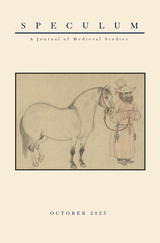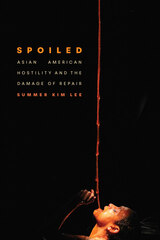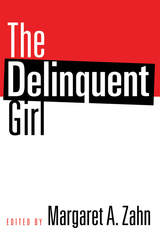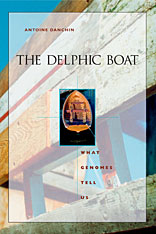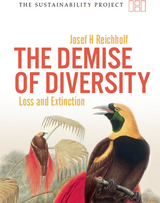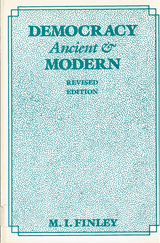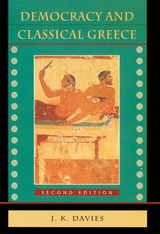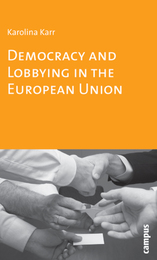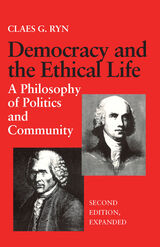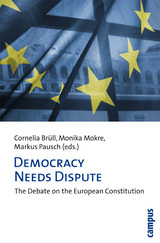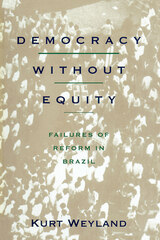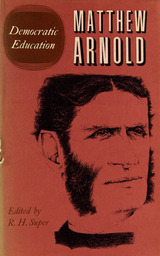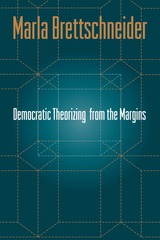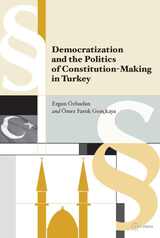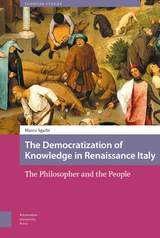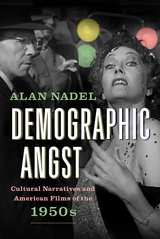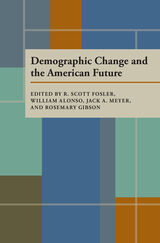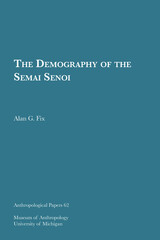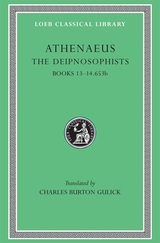 The Deipnosophists, Volume VI: Books 13–14.653b
Athenaeus
Harvard University Press Athenaeus (ca. 170ca. 230 CE), a Greek of Naucratis in Egypt, lived in Rome and wrote a historical work now lost. Of the fifteen books of his surviving Deipnosophists ('Sophists at Dinner'), the first two and parts of the third, eleventh, and fifteenth exist only in summary, the rest apparently complete. In it he pretends to tell a friend about a banquet at a scholar's house whither the learned guests brought extracts from poetry for recitation and discussion. Much of the matter however concerns the food provided and accessories. One learns about cooks, strange dishes, wines, menu cards, and countless other matters. Athenaeus was an antiquarian. The whole work, which mentions nearly eight hundred writers and two thousand five hundred writings, is a large treasury of information not only about table matters but also music, dances, games, and all sorts of literary subjects. And it abounds in quotations, mostly made direct by Athenaeus himself, from authors whose writings have not survived.
The Loeb Classical Library edition of The Deipnosophists is in seven volumes. There is a comprehensive index in the final volume.
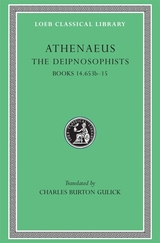 The Deipnosophists, Volume VII: Books 14.653b-15
Athenaeus
Harvard University Press Athenaeus (ca. 170ca. 230 CE), a Greek of Naucratis in Egypt, lived in Rome and wrote a historical work now lost. Of the fifteen books of his surviving Deipnosophists ('Sophists at Dinner'), the first two and parts of the third, eleventh, and fifteenth exist only in summary, the rest apparently complete. In it he pretends to tell a friend about a banquet at a scholar's house whither the learned guests brought extracts from poetry for recitation and discussion. Much of the matter however concerns the food provided and accessories. One learns about cooks, strange dishes, wines, menu cards, and countless other matters. Athenaeus was an antiquarian. The whole work, which mentions nearly eight hundred writers and two thousand five hundred writings, is a large treasury of information not only about table matters but also music, dances, games, and all sorts of literary subjects. And it abounds in quotations, mostly made direct by Athenaeus himself, from authors whose writings have not survived.
The Loeb Classical Library edition of The Deipnosophists is in seven volumes. There is a comprehensive index in the final volume.
 Deja Vu: Aberrations Of Cultural Memory
Peter Krapp
University of Minnesota Press, 2004 The pitfalls of cultural memory and forgetting, understood through the genealogy of the phenomenon called déjà vu Referring to a past that never was, déjà vu shares a structure not only with fiction, but also with the ever more sophisticated effects of media technology. Tracing the term from the end of the nineteenth century, when it was first popularized in the pages of the Revue philosophique, Peter Krapp examines the genealogy and history of the singular and unrepeatable experience of déjà vu. This provocative book offers a refreshing counterpoint to the clichéd celebrations of cultural memory and forces us do a double take on the sanctimonious warnings against forgetting so common in our time. Disturbances of cultural memory—screen memories, false recognitions, premonitions—disrupt the comfort zone of memorial culture: strictly speaking, déjà vu is neither a failure of memory nor a form of forgetting. Krapp’s analysis of such disturbances in literature, art, and mass media introduces, historicizes, and theorizes what it means to speak of an economy of attention or distraction. Reaching from the early psychoanalytic texts of Sigmund Freud to the plays of Heiner Müller, this exploration of the effects of déjà vu pivots around the work of Walter Benjamin and includes readings of kitsch and aura in Andy Warhol’s work, of cinematic violence and certain exaggerated claims about shooting and cutting, of the memorial character of architecture, and of the high expectations raised by the Internet.
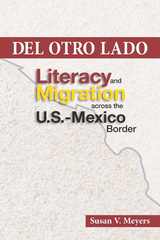 Del Otro Lado: Literacy and Migration across the U.S.-Mexico Border
Susan V. Meyers
Southern Illinois University Press, 2014 In Del OtroLado: Literacy and Migration across the U.S.-Mexico Border, author Susan V. Meyers draws on her year-long ethnographic study in Mexico and the United States to analyze the literacy practices of Mexican-origin students on both sides of the border. Meyers begins by taking readers through the historical development of the rural Mexican town of Villachuato. Through a series of case studies spanning the decades between the Mexican Revolution and the modern-day village, Meyers explores the ever-widening gulf between the priorities of students and the ideals of the public education system. As more and more of Villachuato’s families migrate in an effort to find work in the wake of shifting transnational economic policies like NAFTA, the town’s public school teachers find themselves frustrated by spiraling drop-out rates. Meyers discovers that students often consider the current curriculum irrelevant and reject the established value systems of Mexico’s public schools. Meyers debunks the longstanding myth that literacy is tied to economic development, arguing that a “literacy contract” model, in which students participate in public education in exchange for access to increased earning potential, better illustrates the situation in rural Mexico. Meyers next explores literacy on the other side of the border, traveling to Marshalltown, Iowa, where many former citizens of Villachuato have come to reside because of the availability of jobs for unskilled workers at the huge Swift meat-packing plant there. Here she discovers that Mexican-origin families in the United States often consider education a desirable end in itself rather than a means to an end. She argues that migration has a catalyzing effect on literacy, particularly as Mexican migrant families tend to view education as a desirable form of prestige. Meyers reveals the history and policies that have shaped the literacy practices of Mexican-origin students, and she raises important questions about not only the obligation of the United States to educate migrant students, but also those students’ educational struggles and ways in which these difficulties can be overcome. This transnational study is essential reading for scholars, students, educators and lawmakers interested in shaping the future of educational policy.
 Delaware Diary: Episodes in the Life of a River
Frank Dale
Rutgers University Press, 1996 Everyone knows that Washington crossed the Delaware and turned the "times that try men's souls" into a triumphal victory. And today residents of and visitor to New York, New Jersey, and Pennsylvania enjoy canoeing and tubing, shad fishing and bed and breakfasting along the Delaware. Have you ever wondered about the life of the river in the two centuries in between? The Delaware was the scene of important events after the Revolution, too- an early and tragic experiment in steam propulsion, a notoriously lethal prison camp in the Civil War, memorable floods, hurricanes, ice storms, and even a furious battle with the U.S. army.
Frank Dale, who has lived near the Delaware all of his life, has burrowed into old newspaper files and archives and traced down eyewitnesses o the life of the Delaware. Rivers were the highways of choice in early America, and the Delaware presented much greater challenges than the nearby Hudson. Filled with rapid, falls, and inconvenient rocks, the river refused to accommodate itself easily to the needs of commerce. The rivermen who ventured down the Delaware on massive timber rafts or Durham boats filled with iron ore earned a deserved reputation for pure ornery courage. Later entrepreneurs tried steamboats, canals, and bridges to attempt to harness and exploit this most unexploitable river, with decidedly mixed results. In recent times, the Tocks Island Dam was defeated by a community that had come to admire the river's stubborn resistance to being conquered and harnesses to human ends. Canoeists and waterside strollers can now appreciate its unspoiled beauties.
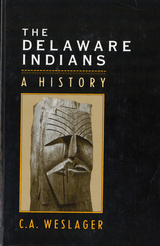 The Delaware Indians: A History
Weslager, C. A.
Rutgers University Press, 1990 "One of the best tribal histories . . . the product of decades of study by a layman archeologist-historian. With a rich blend of archeology, anthropology, Indian oral traditions (he gives us one of the best accounts of the Walum Olum, the fascinating hieroglyphics depicting the tribal origins of the Delaware), and documentary research, Weslager writes for the general reader as well as the scholar."--American Historical Review
In the seventeenth century white explorers and settlers encountered a tribe of Indians calling themselves Lenni Lenape along the Delaware River and its tributaries in New Jersey, Delaware, eastern Pennsylvania, and southeastern New York. Today communities of their descendants, known as Delawares, are found in Oklahoma, Kansas, Wisconsin, and Ontario, and individuals of Delaware ancestry are mingled with the white populations in many other states. The Delaware Indians is the first comprehensive account of what happened to the main body of the Delaware Nation over the past three centuries.
C. A. Weslager puts into perspective the important events in United States history in which the Delawares participated and he adds new information about the Delawares. He bridges the gap between history and ethnology by analyzing the reasons why the Delawares were repeatedly victimized by the white man.
 Delaware Naturalist Handbook
McKay Jenkins
University of Delaware Press, 2011 The Delaware Naturalist Handbook is the primary public face of a major university-led public educational outreach and community engagement initiative. This statewide master naturalist certification program is designed to train hundreds of citizen scientists, K–12 environmental educators, ecological restoration volunteers, and habitat managers each year. The initiative is conducted in collaboration with multiple disciplines at the University of Delaware, the University of Delaware Cooperative Extension, the Delaware Environmental Institute (DENIN), the state Department of Natural Resources and Environmental Conservation (DNREC), the state Division of Parks, the state Forest Service, the state Division of Fish and Wildlife, and local nonprofit educational institutions, including the Mount Cuba Center, the Delaware Nature Society and Ashland Nature Center, Delaware Wildlands, Northeast Climate Hub, Center for Inland Bays, and White Clay Creek State Park.
Published by University of Delaware Press. Distributed worldwide by Rutgers University Press.
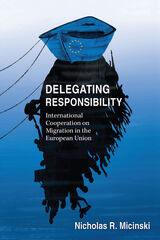 Delegating Responsibility: International Cooperation on Migration in the European Union
Nicholas R. Micinski
University of Michigan Press, 2022 Delegating Responsibility explores the politics of migration in the European Union and explains how the EU responded to the 2015–17 refugee crisis. Based on 86 interviews and fieldwork in Greece and Italy, Nicholas R. Micinski proposes a new theory of international cooperation on international migration. States approach migration policies in many ways—such as coordination, collaboration, subcontracting, and unilateralism—but which policy they choose is based on capacity and on credible partners on the ground. Micinski traces the fifty-year evolution of EU migration management, like border security and asylum policies, and shows how EU officials used “crises” as political leverage to further Europeanize migration governance. In two in-depth case studies, he explains how Italy and Greece responded to the most recent refugee crisis. He concludes with a discussion of policy recommendations regarding contemporary as well as long-term aspirations for migration management in the EU.
 Deleites de la Cocina Mexicana: Healthy Mexican American Cooking
By Maria Luisa Urdaneta and Daryl F. Kanter
University of Texas Press, 1996 Mexican food, Tex-Mex, Southwestern cuisine—call it what you will, the foods that originated in Mexico have become everyone's favorites. Yet as we dig into nachos and enchiladas, many people worry about the fats and calories that traditional Mexican food contains. Deleites de la Cocina Mexicana proves that Mexican cooking can be both delicious and healthy. In this bilingual cookbook, Maria Luisa Urdaneta and Daryl F. Kanter provide over 200 recipes for some of the most popular Mexican dishes-guacamole, frijoles, Spanish rice, chiles rellenos, chile con carne, chalupas, tacos, enchiladas, fajitas, menudo, tamales, and flan-to name only a few. Without sacrificing a bit of flavor, the authors have modified the recipes to increase complex carbohydrates and total dietary fiber, while decreasing saturated and total fats. These modifications make the recipes suitable for people with diabetes-and all those who want to reduce the fats and calories in their diet. Each recipe also includes a nutritional analysis of calories, fats, sodium, etc., and American Diabetic Association exchange rates. Because diabetes is a growing problem in the Mexican-American community, Deleites de la Cocina Mexicana is vital for all those who need to manage their diet without giving up the foods they love. Let it be your one-stop guide to cooking and eating guilt-free Mexican food.
Deleuze and Film Music: Building a Methodological Bridge between Film Theory and Music
Gregg Redner
Intellect Books, 2011 The analysis of film music is emerging as one of the fastest-growing areas of interest in film studies. Yet scholarship in this up-and-coming field has been beset by the lack of a common language and methodology between film and music theory. Drawing on the philosophy of Gilles Deleuze, film studies scholar Gregg Redner provides a much-needed analysis of the problem which then forms the basis of his exploration of the function of the film score and its relation to film's other elements. Not just a groundbreaking examination of persistent difficulties in this new area of study, Deleuze and Film Music also offers a solution—a methodological bridge—that will take film music analysis to a new level.
 A Deleuzian Century?
Ian Buchanan, ed.
Duke University Press, 1999 Michel Foucault’s suggestion that this century would become known as “Deleuzian” was considered by Gilles Deleuze himself to be a joke “meant to make people who like us laugh, and make everyone else livid.” Whether serious or not, Foucault’s prediction has had enough of an impact to raise concern about the potential “deification” of this enormously influential French philosopher. Seeking to counter such tendencies toward hagiography—not unknown, particularly since Deleuze’s death—Ian Buchanan has assembled a collection of essays that constitute a critical and focused engagement with Deleuze and his work. Originally published as a special issue of South Atlantic Quarterly (Summer 1997), this volume includes essays from some of the most prominent American, Australian, British, and French scholars and translators of Deleuze’s writing. These essays, ranging from film, television, art, and literature to philosophy, psychoanalysis, geology, and cultural studies, reflect the broad interests of Deleuze himself. Providing both an introduction and critique of Deleuze, this volume will engage those readers interested in literary and cultural theory, philosophy, and the future of those areas of study in which Deleuze worked. Contributors. Ronald Bogue, Ian Buchanan, André Pierre Colombat, Tom Conley, Manuel DeLanda, Tessa Dwyer, Jerry Aline Flieger, Eugene Holland, Fredric Jameson, Jean-Clet Martin, John Mullarkey, D. N. Rodowick, Horst Ruthrof, Charles J. Stivale
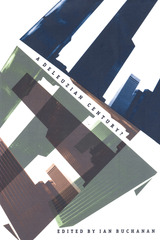 Deleuzism: A Metacommentary
Ian Buchanan
Duke University Press, 2000 The conviction that Gilles Deleuze is doing something radical in his work has been accompanied by a corresponding anxiety as to how to read it. In this rigorous and lucid work, Ian Buchanan takes up the challenge by answering the following questions: How should we read Deleuze? How should we read with Deleuze?
To show us how Deleuze’s philosophy works, Buchanan begins with Melville’s notion that “a great book is always the inverse of another book that could only be written in the soul, with silence and blood.” Buchanan demonstrates that the figure of two books—one written in ink and the other written in blood—lies at the center of Deleuze’s hermeneutics and that a special relation must be established in order to read the second book from the first. This relation is Deleuzism. By explicating elemental concepts in Deleuze—desire, flow, the nomad—Buchanan finds that, despite Deleuze’s self-declared moratorium on dialectics, he was in several important respects a dialectician. In essays that address the “prehistory” of Deleuze’s philosophy, his methodology, and the utopic dimensions of his thought, Buchanan extracts an apparatus of social critique that arises from the philosopher’s utopian impulse.
Deleuzism is a work that will engage all those with an interest in the twentieth-century’s most original philosopher.
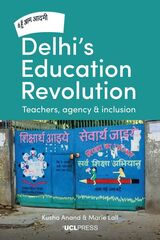 Delhi's Education Revolution: Teachers, Agency and Inclusion
Kusha Anand and Marie Lall
University College London, 2022 Firsthand accounts of how education reforms from 2015 onward have impacted teachers in Delhi.
In 2015, the Aam Aadmi Party (AAP) was elected to govern Delhi promising to improve public services, including education through government schools that would be equal to private-school provisions. Media reports, along with the party’s re-election in 2020, suggest strong public confidence that the AAP is delivering on that promise, but this success has little evidence in the schools themselves. Delhi’s Education Revolution offers a critical evaluation of the AAP’s education reforms by exploring policy and practice through the eyes of a key group: the government-school teachers tasked with making the AAP’s pledge a reality. Drawing on 110 interviews, this volume uses first-hand accounts from teachers to explain how reforms have changed their profession and practice, and whether education really has improved for children of all backgrounds. This study paints a more qualified picture of success than suggested elsewhere and makes a valuable contribution to the understanding of education reforms in India, especially in Delhi.
 Delia's Doctors; or, A Glance behind the Scenes
Hannah Gardner Creamer
University of Illinois Press, 2002 A lost 19th century novel focused on several women's issues, especially female health; with a fascinating view of mid-nineteenth-century medical practices.
This early feminist novel is a wickedly funny slice of mid-nineteenth-century Americana peppered with details of the era’s freakish medical tactics and leavened with a smart and sassy commentary about the societal restraints on women’s physical and intellectual abilities.
First published in 1852, Delia’s Doctors is one of four known novels by Hannah Gardner Creamer, an American writer whose life and career have been all but absent from the annals of American history. In the book, eighteen-year-old Delia Thornton is ill. Her condition, more psychological than physical, worsens during the bitter winter, even as doctor after doctor attempts to cure her.
As Delia typifies the female heroine whose sickness is aggravated by listlessness and inactivity, her brother’s fiancée, Adelaide Wilmot, is Delia’s more robust counterpart. Adelaide thinks she could do anything, if only she were a man, and she dreams of being a physician. Quick to point out the shortcomings of male doctors in treating female illnesses, Adelaide saves Delia and delivers a series of arguments against New England patriarchy.
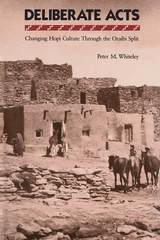 Deliberate Acts: Changing Hopi Culture Through the Oraibi Split
Peter M. Whiteley
University of Arizona Press, 1988 In the Oraibi split of 1906, “traditional” Hopis separated themselves from “progressives” and established the new settlement of Hotevilla in what has been accepted as a response to changing tribal politics. Following the split, some returned to Oraibi but eventually left to establish another new settlement at Bacavi.
Drawing on oral accounts from Hopi consultants and on contemporary documents, Peter M. Whiteley argues that the split was in fact the result of a conspiracy among Hopi politico-religious leaders from both the “hostile” and “friendly” factions, a revolution to overturn the allegedly corrupt Oraibi religious order. A crucial element of Whiteley’s thesis is that, contrary to established theory, Hopi society was not egalitarian but was controlled by a ruling elite, the pavansinom, who clandestinely planned such events as the destruction of Awatovi because of its reacceptance of Franciscan priests.
Through an analysis of Bacavi social structure, Whiteley demonstrates how one fragment of a well-established society went about creating a new social order after the old one drastically fragmented. His detailed portrait of the history and social organization of a Hopi village represents an unusually rich resource for students of Hopi culture and history.
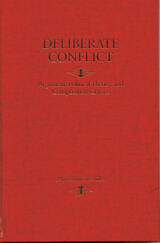 Deliberate Conflict: Argument, Political Theory, and Composition Classes
Patricia Roberts-Miller
Southern Illinois University Press, 2004 In Deliberate Conflict: Argument, Political Theory, and Composition Classes, Patricia Roberts-Miller argues that much current discourse about argument pedagogy is hampered by fundamental unspoken disagreements over what democratic public discourse should look like. The book’s pivotal question is, In what kind of public discourse do we want our students to engage? To answer this, the text provides a taxonomy, discussion, and evaluation of political theories that underpin democratic discourse, highlighting the relationship between various models of the public sphere and rhetorical theory. Deliberate Conflict cogently advocates reintegrating instruction in argumentation with the composition curriculum. By linking effective argumentation in the public sphere with the ability to effect social change, Roberts-Miller pushes compositionists beyond a simplistic Aristotelian conception of how argumentation works and offers a means by which to prepare students for active participation in public discourse.
 Deliberate Speed: The Origins of a Cultural Style in the American 1950s, with a New Preface
W. T. Lhamon Jr.
Harvard University Press, 2002 W. T. Lhamon 's Deliberate Speed is a cultural history of the 1950s in the United States that directly confronts the typical view of this decade as an arid wasteland. By surveying the artistic terrain of the period--examining works by figures as varied as Miles Davis, Ralph Ellison, Robert Frank, Allen Ginsberg, Little Richard, Charlie Parker, Jackson Pollock, Thomas Pynchon, and Ludwig Wittgenstein--Lhamon demonstrates how many of the distinctive elements that so many attribute to the revolutionary period of the 1960s had their roots in the fertile soil of the 1950s.
Taking his title from Chief Justice Earl Warren's desegregation decree of 1955, Lhamon shows how this phrase, "deliberate speed," resonates throughout the culture of the entire decade. The 1950s was a period of transition--a time when the United States began its shift from an industrial society to a postindustrial society, and the era when the first barriers between African-American culture and white culture began to come down.
Deliberate Speed is the story of a nation and a culture making the rapid transition to the increasingly complex world that we inhabit today.
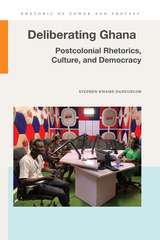 Deliberating Ghana: Postcolonial Rhetorics, Culture, and Democracy
Stephen Kwame Dadugblor
Michigan State University Press, 2025 In the early 2010s electoral disputes in Ghana garnered global attention and raised questions concerning the nature and future of democratic practice in postcolonial countries. In Deliberating Ghana: Postcolonial Rhetorics, Culture, and Democracy Stephen Kwame Dadugblor examines these disputes as they unfolded in Ghana’s Supreme Court and in the public domain. Reading a diverse set of materials including courtroom discourse, social media artifacts, documentaries, parliamentary records, and op-eds, Dadugblor theorizes a cultural imaginaries orientation as a viable approach for understanding and decolonizing knowledge of democratic practice frequently tethered to Western epistemologies and conceptions. Organized around four key ideas about deliberation—the notion of speech, the utility of genre, the promises and perils of digital political participation, and the politics of memory—Deliberating Ghana situates rhetorical studies of democracy within African epistemologies, calling attention to how centering the postcolony can contribute to moving beyond well-worn binaries of West/non-West in studies of rhetoric, democracy, and deliberation, and toward decolonial possibilities. It offers fresh perspectives on foregrounding a society’s indigenous knowledge and the messiness of its socio-political and rhetorical traditions to intervene in debates about the politics of knowledge production.
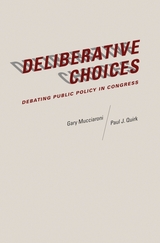 Deliberative Choices: Debating Public Policy in Congress
Gary Mucciaroni and Paul J. Quirk
University of Chicago Press, 2006 The task of deliberating public policy falls preeminently to Congress. But decisions on matters ranging from budget deficits to the war with Iraq, among others, raise serious doubts about its performance. In Deliberative Choices, Gary Mucciaroni and Paul J. Quirk assess congressional deliberation by analyzing debate on the House and Senate floors. Does debate genuinely inform members of Congress and the public? Or does it mostly mislead and manipulate them?
Mucciaroni and Quirk argue that in fashioning the claims they use in debate, legislators make a strategic trade-off between boosting their rhetorical force and ensuring their ability to withstand scrutiny. Using three case studies—welfare reform, repeal of the estate tax, and telecommunications deregulation—the authors show how legislators’ varying responses to such a trade-off shape the issues they focus on, the claims they make, and the information they provide in support of those claims.
Mucciaroni and Quirk conclude that congressional debate generally is only moderately realistic and informed. It often trades in half-truths, omissions, and sometimes even outright falsehoods. Yet some debates are highly informative. Moreover, the authors believe it’s possible to improve congressional deliberation, and they recommend reforms designed to do so.
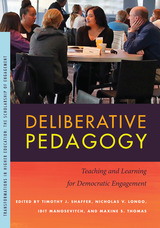 Deliberative Pedagogy: Teaching and Learning for Democratic Engagement
Timothy J. Shaffer
Michigan State University Press, 2017 As the public purposes of higher education are being challenged by the increasing pressures of commodification and market-driven principles, Deliberative Pedagogy argues for colleges and universities to be critical spaces for democratic engagement. The authors build upon contemporary research on participatory approaches to teaching and learning while simultaneously offering a robust introduction to the theory and practice of deliberative pedagogy as a new educational model for civic life. This volume is written for faculty members and academic professionals involved in curricular, co-curricular, and community settings, as well as administrators who seek to support faculty, staff, and students in such efforts. The book begins with a theoretical grounding and historical underpinning of education for democracy, provides a diverse collection of practical case studies with best practices shared by an array of scholars from varying disciplines and institutional contexts worldwide, and concludes with useful methods of assessment and next steps for this work. The contributors seek to catalyze a conversation about the role of deliberation in the next paradigm of teaching and learning in higher education and how it connects with the future of democracy. Ultimately, this book seeks to demonstrate how higher education institutions can cultivate collaborative and engaging learning environments that better address the complex challenges in our global society.
 Delicates
Wendy Guerra
Seagull Books, 2023 Poems from a critically acclaimed Cuban writer available in English for the first time.
Imbued with a sensuality reminiscent of the work of Anaïs Nin, Wendy Guerra’s Delicates takes readers on an exhilarating journey through the cities of love, where women leave their bodies “in the showers of men,” marking their territory “like animals in heat,” their panties “saturated with sand and a sidereal isolating odor.” Guerra’s shocking metaphors and images invite us to enter her gallery of striking and provoking poems where we witness a flight through the air from a thirty-fourth-story window and a woman’s pilgrimage to the salt flats “to taste the pink in stones” on her lover’s behalf. Guerra’s relationship with her native Cuba—much like her relationships with men—is complex and multilayered. Her work confronts the realities of a political system that doesn’t celebrate artistic freedom. Here we have a new way of looking at a woman, an artist, a country, and the colonizers of that country. In these music-infused poems, Guerra shares with us her hard-won truths.
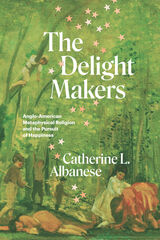 The Delight Makers: Anglo-American Metaphysical Religion and the Pursuit of Happiness
Catherine L. Albanese
University of Chicago Press, 2023 An ambitious history of desire in Anglo-American religion across three centuries.
The pursuit of happiness weaves disparate strands of Anglo-American religious history together. In The Delight Makers, Catherine L. Albanese unravels a theology of desire tying Jonathan Edwards to Ralph Waldo Emerson to the religiously unaffiliated today. As others emphasize redemptive suffering, this tradition stresses the “metaphysical” connection between natural beauty and spiritual fulfillment. In the earth’s abundance, these thinkers see an expansive God intent on fulfilling human desire through prosperity, health, and sexual freedom. Through careful readings of Cotton Mather, Andrew Jackson Davis, William James, Esther Hicks, and more, Albanese reveals how a theology of delight evolved alongside political overtures to natural law and individual liberty in the United States.
 The Delight of Turkish Dizi: Memory, Genre and Politics of Television in Turkey
Arzu Öztürkmen
Seagull Books, 2021 The first comprehensive study of dizi, a television genre unique to Turkey akin to soap opera or telenovela.
Standing at the crossroads of folklore, media, and performance studies, Arzu Öztürkmen explores the rise of the dizi genre in Turkey since the 1970s, when national television broadcasting began in the country. The Delight of Turkish Dizi approaches this unique genre—not quite soap opera or telenovela—as an art form that developed with the collective creative input of writers, producers, directors, actors, editors, musicians, and, lately, international distributors. Öztürkmen shows how dizi-making is a marathon run by sprinters, where production and broadcasting processes have been tightly interwoven, offering a mode of communication and consumption that is distinct to the Turkish television industry. The research consists of oral history with key figures in dizi production and ethnographic surveys of film sets, international content markets, and award ceremonies. This first-ever monograph on Turkish dizi will be a valuable addition to the field of performance and media studies while delighting the general reader as well.
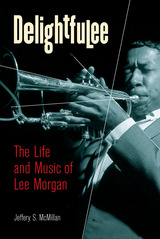 Delightfulee: The Life and Music of Lee Morgan
Jeffery S. McMillan
University of Michigan Press, 2008 One of the most individual stylists of his time, trumpeter Lee Morgan began his professional career in Philadelphia at age fifteen. At eighteen, after a short stint with Art Blakey's Jazz Messengers, Morgan joined Dizzy Gillespie's orchestra, where he stayed until the group disbanded in 1958. A return to Blakey brought Morgan new opportunities, including his first successful attempts at composition. But however much his time with Blakey helped to advance his playing and writing, his boss's and his bandmates' destructive drug habits exerted just as strong an influence. Within three years, Morgan would be back home in Philadelphia, strung out on heroin and penniless. Morgan's return to music in the early to mid-sixties witnessed a tremendous evolution in his playing. Formerly a virtuoso in the model of his idol, Clifford Brown, Morgan brought to his critically acclaimed Blue Note records of the era an emotionally charged, muscular tone, full of poise and control. But it was with the record Sidewinder, recorded in 1963, that Morgan found his greatest fame and commercial success, due to the infectious groove of the title tune. By the time of his death, at thirty-three---murdered in a New York City club by his girlfriend during a gig---Morgan had begun a new phase of his career, experimenting with freer-forms of musical expression. Jeff McMillan's Delightfulee is the first biography to seriously examine Morgan's vast contributions to jazz, both as a performer and as a composer. Thanks to exclusive access to Lee Morgan's now-deceased brother, McMillan is also able to provide unparalleled insight into Morgan's personal and family life Jeff McMillan received his master's degree from the Jazz History and Research program at Rutgers-Newark in 2000 and currently works as an archivist for the Metropolitan Opera in New York City.
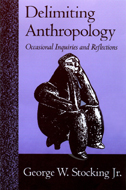 Delimiting Anthropology: Occasional Inquiries and Reflections
George W. Stocking, Jr.
University of Wisconsin Press, 2001 Delimiting Anthropology makes available sixteen essays from the influential career of George W. Stocking, Jr., the world's preeminent historian of anthropology. The essays are grouped in four quartets, echoing the major phases of Stocking's own research over four decades. In his introductory comments he places each essay in the context of his entire body of work.
The first quartet focuses on the work of Franz Boas and the emergence of "Boasian Culturalism." In the second set of essays Stocking addresses the careers of three British "evolutionaries"—Lord Kames; Sir E. B. Tylor; and Sir James G. Frazer—tracking the development of cultural evolutionary thought from its origins in the Scottish Enlightenment through its early twentieth-century afterglow in Frazer's The Golden Bough.
The third group of essays looks at institutions and national traditions, including British ethnography exemplified in the fieldwork manual Notes and Queries; the humanistic Parisian Société d'Ethnographie; the early tension at the Laboratory of Anthropology in Santa Fe between aspiring local amateur anthropologists and professionals from Eastern universities; and the history of ethnographic museums in the European tradition. In closing, Stocking offers reflections on major tendencies in anthropology from the eighteenth century to the present.
"George Stocking is without rival as an historian of modern anthropology. He is trained as an historian, and he knows anthropologists from having lived among them. This collection is indispensable for any one or place concerned with the subject."—Dell Hymes, editor of Reinventing Anthropology
Delinquency, crime, and society
James F. Short Jr.
University of Chicago Press, 1978 This thoughtful collection of original work by eminent sociologists and criminologists was compiled to honor Henry D. McKay, the pioneer investigator and collaborator with Clifford R. Shaw. Among the traditions most basic to both continuity and change in criminological research and theory, one of the most important is that associated with Shaw and McKay and the "Chicago school" of urban sociology. So great has been its impact that even the most recent theoretical formulations draw upon it for support or in criticism. Reassessing the "Shaw and McKay tradition," the contributors to this volume pursue critical and emerging issues in the study of crime and delinquency.
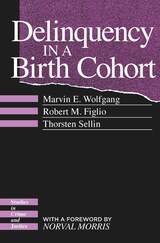 Delinquency in a Birth Cohort
Marvin E. Wolfgang, Robert M. Figlio, and Thorsten Sellin
University of Chicago Press, 1972 "Delinquency in a Birth Cohort is a turning point in criminological research in the United States," writes Norval Morris in his foreword. "What has been completely lacking until this book is an analysis of delinquency in a substantial cohort of youths, the cohort being defined other than by their contact with any part of the criminal justice system."
This study of a birth cohort was not originally meant to be etiological or predictive. Yet the data bearing on this cohort of nearly ten thousand boys born in 1945 and living in Philadelphia gave rise to a model for prediction of delinquency, and thus to the possibility for more efficient planning of programs for intervention. It is expert research yielding significant applications and, though largely statistical, the analysis is accessible to readers without mathematical training.
"No serious scholar of the methods of preventing and treating juvenile delinquency can properly ignore this book."—LeRoy L. Lamborn, Law Library Journal
"The magnitude of [this] study is awesome. . . . It should be a useful guide for anyone interested in the intricacies of cohort analysis."—Gary F. Jensen, American Journal of Sociology
"A book the student of juvenile delinquency will find invaluable."—Criminologist
 Delinquency: Its Roots, Careers, and Prospects
D. J. West
Harvard University Press, 1982 Delinquency evaluates one of the largest longitudinal-observational studies of juvenile delinquents ever conducted. Utilizing a normal population sample and conducting individual interviews repeatedly over many years, the author and his colleagues followed the development of 400 British working-class boys from age eight to twenty-five, of whom one-third eventually had criminal records.
Five factors were found to predict most delinquent behavior, the most powerful statistically being the presence of a criminal parent. By measuring the accumulated pressure of these factors, D. J. West demonstrates the extent to which delinquency can be predicted from classroom observations or social background at an early age. He outlines policy guidelines that would tailor intervention to a youth's age and circumstances, and he argues persuasively that positive change in the parents' situation usually produces good effects on the children.
The Delinquent Girl
edited by Margaret A. Zahn
Temple University Press, 2009 Over the past decade and a half, girls’ involvement in the juvenile justice system has increased. Yet the topic remains under-studied among criminologists. The Delinquent Girl is a “state-of-the-field” evaluation that identifies and analyzes girls who become delinquent, the kinds of crimes they commit and the reasons they commit them. The distinguished academics and practitioners who contributed to this volume provide an overview of the research on girls’ delinquency, discuss policy implications and point to areas where further research is critically needed.
Delinquent Palaces: Poems
Danielle Chapman
Northwestern University Press, 2015 In her debut collection, Danielle Chapman confronts the beautiful breakdowns of the everyday. Love, how often it eludes and the revising of memories to include the flaws of life, these poems read on the verge of catastrophic as they implore us to look closer and come face to face with the beautiful and grotesque motions of life and all its riveting and casualties.
 Delinquents and Nondelinquents in Perspective
Sheldon Glueck and Eleanor Glueck
Harvard University Press Throughout more than forty years of research into the causes, treatment, and prevention of delinquency and criminality Sheldon and Eleanor Glueck have put particular emphasis on the central importance of a continuing study of their subjects. This work incorporates data presented in Unraveling Juvenile Delinquency (HUP, 1950) with new data collected in over twelve years of subsequent investigation exploring the lives, into young adulthood, of the delinquents and of the carefully matched control group of nondelinquents who were studied in the earlier work.
By comparing the information detailing the domestic relations, work histories, recreational activities, careers in the armed forces, and other aspects of life of the young adults of both the delinquent and control groups, the Gluecks raise fundamental theoretical issues concerning delinquency prevention and crime control. The authors' research techniques are presented through an illustrative investigation, “The Case of Henry W.” The methods employed are designed to accumulate sufficient evidence to determine how the personalities and environmental backgrounds of law offenders relate to their behavior.
 Delirio—The Fantastic, the Demonic, and the Réel: The Buried History of Nuevo León
By Marie Theresa Hernández
University of Texas Press, 2002 Striking, inexplicable stories circulate among the people of Nuevo León in northern Mexico. Stories of conversos (converted Jews) who fled the Inquisition in Spain and became fabulously wealthy in Mexico. Stories of women and children buried in walls and under houses. Stories of an entire, secret city hidden under modern-day Monterrey. All these stories have no place or corroboration in the official histories of Nuevo León. In this pioneering ethnography, Marie Theresa Hernández explores how the folktales of Nuevo León encode aspects of Nuevolenese identity that have been lost, repressed, or fetishized in "legitimate" histories of the region. She focuses particularly on stories regarding three groups: the Sephardic Jews said to be the "original" settlers of the region, the "disappeared" indigenous population, and the supposed "barbaric" society that persists in modern Nuevo León. Hernández's explorations into these stories uncover the region's complicated history, as well as the problematic and often fascinating relationship between history and folklore, between officially accepted "facts" and "fictions" that many Nuevoleneses believe as truth.
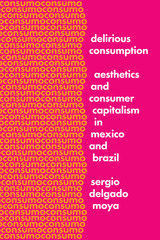 Delirious Consumption: Aesthetics and Consumer Capitalism in Mexico and Brazil
By Sergio Delgado Moya
University of Texas Press, 2017 In the decades following World War II, the creation and expansion of massive domestic markets and relatively stable economies allowed for mass consumption on an unprecedented scale, giving rise to the consumer society that exists today. Many avant-garde artists explored the nexus between consumption and aesthetics, questioning how consumerism affects how we perceive the world, place ourselves in it, and make sense of it via perception and emotion. Delirious Consumption focuses on the two largest cultural economies in Latin America, Mexico and Brazil, and analyzes how their artists and writers both embraced and resisted the spirit of development and progress that defines the consumer moment in late capitalism. Sergio Delgado Moya looks specifically at the work of David Alfaro Siqueiros, the Brazilian concrete poets, Octavio Paz, and Lygia Clark to determine how each of them arrived at forms of aesthetic production balanced between high modernism and consumer culture. He finds in their works a provocative positioning vis-à-vis urban commodity capitalism, an ambivalent position that takes an assured but flexible stance against commodification, alienation, and the politics of domination and inequality that defines market economies. In Delgado Moya’s view, these poets and artists appeal to uselessness, nonutility, and noncommunication—all markers of the aesthetic—while drawing on the terms proper to a world of consumption and consumer culture.
 Delirious Milton: The Fate of the Poet in Modernity
Gordon Teskey
Harvard University Press, 2006 Composed after the collapse of his political hopes, Milton's great poems Paradise Lost, Paradise Regained, and Samson Agonistes are an effort to understand what it means to be a poet on the threshold of a post-theological world. The argument of Delirious Milton, inspired in part by the architectural theorist Rem Koolhaas's Delirious New York, is that Milton's creative power is drawn from a rift at the center of his consciousness over the question of creation itself. This rift forces the poet to oscillate deliriously between two incompatible perspectives, at once affirming and denying the presence of spirit in what he creates. From one perspective the act of creation is centered in God and the purpose of art is to imitate and praise the Creator. From the other perspective the act of creation is centered in the human, in the built environment of the modern world. The oscillation itself, continually affirming and negating the presence of spirit, of a force beyond the human, is what Gordon Teskey means by delirium. He concludes that the modern artist, far from being characterized by what Benjamin (after Baudelaire) called "loss of the aura," is invested, as never before, with a shamanistic spiritual power that is mediated through art.
 Delirious New Orleans: Manifesto for an Extraordinary American City
By Stephen Verderber
University of Texas Press, 2008 Winner, Abbott Lowell Cummings Prize, Vernacular Architecture Forum, 2010 From iconic neighborhoods such as the French Quarter and the Garden District to more economically modest but no less culturally vibrant areas, architecture is a key element that makes New Orleans an extraordinary American city. Delirious New Orleans began as a documentary project to capture the idiosyncratic vernacular architecture and artifacts—vintage mom-and-pop businesses, roadside motels, live music clubs, neon signs, wall murals, fast-food joints, and so on—that helped give the city's various neighborhoods their unique character. But because so many of these places and artifacts were devastated by Hurricane Katrina, Delirious New Orleans has become both a historical record of what existed in the past and a blueprint for what must be rebuilt and restored to retain the city's unique multicultural landscape. Stephen Verderber starts with the premise that New Orleans's often-overlooked neighborhoods imbue the city with deep authenticity as a place. He opens Delirious New Orleans with a photo-essay that vividly presents this vernacular architecture and its artifacts, both before Katrina and in its immediate aftermath. In the following sections of the book, which are also heavily illustrated, Verderber takes us on a tour of the city's commercial vernacular architecture, as well as the expressive folk architecture of its African American neighborhoods. He discusses how the built environment was profoundly shaped by New Orleans's history of race and class inequities and political maneuvering, along with its peculiar, below-sea-level geography. Verderber also considers the aftermath of Katrina and the armada of faceless FEMA trailers that have, at least temporarily and by default, transformed this urban landscape.
 Delirium and Resistance: Activist Art and the Crisis of Capitalism
Gregory Sholette
Pluto Press, 2017 In the aftermath of the 2016 US election, Brexit, and a global upsurge of nationalist populism, it is evident that the delirium and the crisis of neoliberal capitalism is now the delirium and crisis of liberal democracy and its culture. And though capitalist crisis does not begin within art, art can reflect and amplify its effects to positive and negative ends.
In this follow-up to his influential 2010 book, Dark Matter: Art and Politics in the Age of Enterprise Culture, Sholette engages in critical dialogue with artists’ collectives, counter-institutions, and activist groups to offer an insightful firsthand account of the relationship between politics and art in neoliberal society. Sholette lays out clear examples of art’s deep involvement in capitalism: the dizzying prices achieved by artists who pander to the financial elite, the proliferation of museums that contribute to global competition between cities in order to attract capital, and the strange relationship between art and rampant gentrification that restructures the urban landscape.
With a preface by noted author Lucy R. Lippard and an introduction by theorist Kim Charnley, Delirium and Resistance draws on over thirty years of critical debates and practices both in and beyond the art world to historicize and advocate for the art activist tradition that radically—and, at times, deliriously—entangles the visual arts with political struggles.
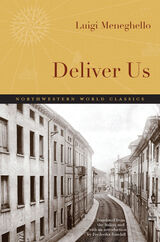 Deliver Us
Luigi Meneghello, Translated from the Russian by Frederika Randall
Northwestern University Press, 2011 Originally published in 1963, and today considered a landmark in twentieth century Italian literature, Luigi Meneghello’s Deliver Us is the memoir, not of an extraordinary childhood, but of the very ordinary one the author shared with most of his generation, when Italy was a rural country under the twin authorities of Church and Fascism. His boyhood begins in 1922, the year of Mussolini’s March on Rome, and ends when Meneghello, 21, goes up into the hills to join the partisans. Called a romanzo—a story, although not a novel, as that term usually suggests—the book is a genre all of its own that mixes personal and collective memory, amateur ethnography, and reflections on language. Meneghello’s sharp insights and narrative skill come together in an original meditation on how words, people, places, and things shape thought itself.
Only loosely chronological, Deliver Us proceeds by themes—childhood games, Fascist symbols, religious precepts, and the rites of poverty, of death, of eros, and of love. Meneghello’s ironic musings and profoundly honest recollections make an utterly unsentimental human comedy of that was the whole world to his dawning consciousness.
 Deliverance and Submission: Evangelical Women and the Negotiation of Patriarchy in South Korea
Kelly H. Chong
Harvard University Press, 2008 South Korea is home to one of the most vibrant evangelical Protestant communities in the world. This book investigates the meanings of—and the reasons behind—an intriguing aspect of contemporary South Korean evangelicalism: the intense involvement of middle-class women. Drawing upon extensive ethnographic fieldwork in Seoul that explores the relevance of gender and women’s experiences to Korean evangelicalism, Kelly H. Chong not only helps provide a clearer picture of the evangelical movement’s success in South Korea, but interrogates the global question of contemporary women’s attraction to religious traditionalisms.
In highlighting the growing disjunction between the forces of social transformation that are rapidly liberalizing modern Korean society, and a social system that continues to uphold key patriarchal structures on both societal and familial levels, Chong relates women’s religious involvement to the contradictions of South Korea’s recent socio-cultural changes and complex engagement with modernity. By focusing on the ways in which women’s religious participation constitutes—both spiritually and institutionally—an important part of their effort to negotiate the problems and dilemmas of contemporary family and gender relations, this book explores the contradictory significance of evangelical beliefs and practices for women, which simultaneously opens up possibilities for gender negotiation/resistance, and for women’s redomestication.
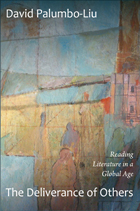 The Deliverance of Others: Reading Literature in a Global Age
David Palumbo-Liu
Duke University Press, 2012 The Deliverance of Others is a compelling reappraisal of the idea that narrative literature can expand readers' empathy. What happens if, amid the voluminous influx of otherness facilitated by globalization, we continue the tradition of valorizing literature for bringing the lives of others to us, admitting them into our world and valuing the difference that they introduce into our lives? In this new historical situation, are we not forced to determine how much otherness is acceptable, as opposed to how much is excessive, disruptive, and disturbing? The influential literary critic David Palumbo-Liu suggests that we can arrive at a sense of responsibility toward others by reconsidering the discourses of sameness that deliver those unlike ourselves to us. Through virtuoso readings of novels by J. M. Coetzee, Nadine Gordimer, Kazuo Ishiguro, and Ruth Ozeki, he shows how notions that would seem to offer some basis for commensurability between ourselves and others—ideas of rationality, the family, the body, and affect—become less stable as they try to accommodate more radical types of otherness. For Palumbo-Liu, the reading of literature is an ethical act, a way of thinking through our relations to others.
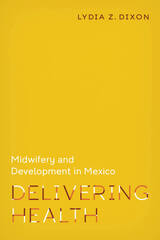 Delivering Health: Midwifery and Development in Mexico
Lydia Z. Dixon
Vanderbilt University Press, 2020 Honorable Mention for the Association for Feminist Anthropology's Rosaldo Book Prize, 2021
Maternal health outcomes are a key focus of global health initiatives. In Delivering Health, author Lydia Z. Dixon uncovers the ways such outcomes have been shaped by broader historical, political, and social factors in Mexico, through the perspectives of those who are at the front lines fighting for change: midwives.
Midwives have long been marginalized in Mexico as remnants of the country's precolonial past, yet Dixon shows how they are now strategically positioning themselves as agents of modernity and development. Midwifery education programs have popped up across Mexico, each with their own critique of the health care system and vision for how midwifery can help. Delivering Health ethnographically examines three such schools with very different educational approaches and professional goals. From San Miguel de Allende to Oaxaca to Michoacán and points between, Dixon takes us into the classrooms, clinics, and conferences where questions of what it means to provide good reproductive health care are being taught, challenged, and implemented. Through interviews, observational data, and even student artwork, we are shown how underlying inequality manifests in poor care for many Mexican women. The midwives in this book argue that they can improve care while also addressing this inequality. Ultimately, Delivering Health asks us to consider the possibility that marginalized actors like midwives may hold the solution to widespread concerns in health.
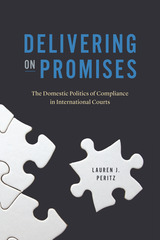 Delivering on Promises: The Domestic Politics of Compliance in International Courts
Lauren J. Peritz
University of Chicago Press, 2022 A timely investigation into the conditions that make international agreements—and the institutions that enforce them—vulnerable.
When do international institutions effectively promote economic cooperation among countries and help them resolve conflict? Although the international system lacks any central governing authority, states have created rules, particularly around international economic relations, and empowered international tribunals to enforce those rules. Just how successful are these institutions? In Delivering on Promises Lauren J. Peritz demonstrates that these international courts do indeed deliver results—but they are only effective under certain conditions.
As Peritz shows, states are less likely to comply with international rules and international court decisions when domestic industries have the political ability to obstruct compliance in particular cases. The author evaluates the argument with an extensive empirical analysis that traces the domestic politics of compliance with the decisions of two international economic courts: the World Trade Organization’s dispute settlement mechanism and the Court of Justice of the European Union. At a time when international agreements are under attack, this book sheds light on the complex relationship between domestic politics and international economic cooperation, offering detailed evidence that international economic courts are effective at promoting interstate cooperation.
The Delphic Boat: What Genomes Tell Us
Antoine Danchin
Harvard University Press, 2002 By the end of 2001, almost 500 genome programs were completed or underway. Drawing upon what researchers worldwide are learning from the gene sequences of bacteria, plants, fungi, fruit flies, worms, and humans, Antoine Danchin shows us how genomes are far more than mere collections of genes.
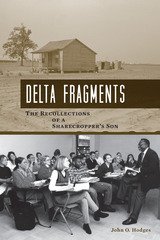 Delta Fragments: The Recollections of a Sharecropper's Son
John O. Hodges
University of Tennessee Press, 2014 The son of black sharecroppers, John Oliver Hodges attended segregated schools in Greenwood, Mississippi, in the 1950s and ’60s, worked in plantation cotton fields, and eventually left the region to earn multiple degrees and become a tenured university professor. Both poignant and thought provoking, Delta Fragments is Hodges’s autobiographical journey back to the land of his birth. Brimming with vivid memories of family life, childhood friendships, the quest for knowledge, and the often brutal injustices of the Jim Crow South, it also offers an insightful meditation on the present state of race relations in America.
Hodges has structured the book as a series of brief but revealing vignettes grouped into two main sections. In part 1, “Learning,” he introduces us to the town of Greenwood and to his parents, sister, and myriad aunts, uncles, cousins, teachers, and schoolmates. He tells stories of growing up on a plantation, dancing in smoky juke joints, playing sandlot football and baseball, journeying to the West Coast as a nineteen-year-old to meet the biological father he never knew while growing up, and leaving family and friends to attend Morehouse College in Atlanta. In part 2, “Reflecting,” he connects his firsthand experience with broader themes: the civil rights movement, Delta blues, black folkways, gambling in Mississippi, the vital role of religion in the African American community, and the perplexing problems of poverty, crime, and an underfunded educational system that still challenge black and white citizens of the Delta.
Whether recalling the assassination of Medgar Evers (whom he knew personally), the dynamism of an African American church service, or the joys of reconnecting with old friends at a biennial class reunion, Hodges writes with a rare combination of humor, compassion, and—when describing the injustices that were all too frequently inflicted on him and his contemporaries—righteous anger. But his ultimate goal, he contends, is not to close doors but to open them: to inspire dialogue, to start a conversation, “to be provocative without being insistent or definitive.”
 Deluge: Tropical Storm Irene, Vermont’s Flash Floods, and How One Small State Saved Itself
Peggy Shinn
University Press of New England, 2013 On August 28, 2011, after pounding the Caribbean and the U.S. Eastern seaboard for more than a week, Hurricane Irene finally made landfall in New Jersey. As the storm headed into New England, it was quickly downgraded to a tropical storm. And by Sunday afternoon, national news outlets were giving postmortems on the damage. Except for some flooding in low-lying areas, New York City—Irene’s biggest target—had escaped its worst-case scenario. Story over. But the story wasn’t over. As Irene’s eye drifted north, its bands of heavy rains twisted westward over Vermont’s Green Mountains. The mountains forced these bands upward, wringing the rain out of them like water from a sponge. Streams and rivers were transformed into torrents of brown water and debris, gouging mountainsides, reshaping valleys, washing out roads, pulling apart bridges, and carrying away homes, livestock, and automobiles. For weeks, mountain towns were isolated, with no way in or out, and thousands of people were left homeless. In the immediate aftermath of the disaster, it fell on the shoulders of ordinary Vermonters to help victims and rebuild the state. Deluge is the complete story of the floods, the rescue, and the recovery, as seen through the eyes of the people who lived through them: Wilmington’s Lisa Sullivan, whose bookstore was flooded, and town clerk Susie Haughwout, who saved the town records; Tracy Payne, who lost her home in Jamaica—everything in it, and the land on which it sat; Geo Honigford in South Royalton, who lost his crops, but put his own mess on hold to help others in the town; the men who put U.S. Route 4 back together at breakneck speed; and the entire village of Pittsfield, completely isolated after the storm, and its inspirational story of real community.
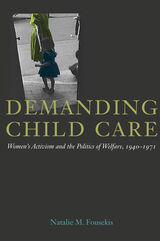 Demanding Child Care: Women's Activism and the Politics of Welfare, 1940-1971
Natalie M. Fousekis
University of Illinois Press, 2013 During World War II, as women stepped in to fill jobs vacated by men in the armed services, the federal government established public child care centers in local communities for the first time. When the government announced plans to withdraw funding and terminate its child care services at the end of the war, women in California protested and lobbied to keep their centers open, even as these services rapidly vanished in other states. Analyzing the informal networks of cross-class and cross-race reformers, policymakers, and educators, Demanding Child Care: Women's Activism and the Politics of Welfare, 1940–1971 traces the rapidly changing alliances among these groups. During the early stages of the childcare movement, feminists, Communists, and labor activists banded together, only to have these alliances dissolve by the 1950s as the movement welcomed new leadership composed of working-class mothers and early childhood educators. In the 1960s, when federal policymakers earmarked child care funds for children of women on welfare and children described as culturally deprived, it expanded child care services available to these groups but eventually eliminated public child care for the working poor. Deftly exploring the possibilities for partnership as well as the limitations among these key parties, Fousekis helps to explain the barriers to a publically funded comprehensive child care program in the United States.
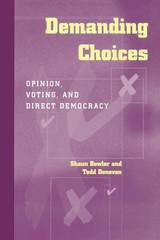 Demanding Choices: Opinion, Voting, and Direct Democracy
Shaun Bowler and Todd Donovan
University of Michigan Press, 2000 Referenda on important public policy questions have come to play a central role in policy making in many states. Referenda, or ballot propositions, have resulted in limits on taxation and limits on the number of terms of elected officials, and have dealt with bilingual education, campaign finances, and affirmative action, in states all over the country.
Shaun Bowler and Todd Donovan present a searching and original examination of how voters make decisions in direct referenda. The authors ask if voters have some information about the issue easily at their disposal and if they make choices that seem sensible given their interests and the information they have. Looking at the way voters respond to different kinds of questions, the authors suggest that while direct democracy has its failings, the flaws do not necessarily lie with citizens being "duped," nor with voters approving propositions they do not want or do not understand at some basic level.
As cynicism about government has increased many have sought to take policy questions out of the hands of elected officials and put the questions directly before the voters for decision. And yet many are skeptical about the ability of voters to make intelligent decisions about complex policy issues. This important book demonstrates that voters are capable of responding thoughtfully to referenda questions.
This book will appeal to students of contemporary American politics and electoral politics.
Shaun Bowler is Associate Professor of Political Science, University of California at Irvine. Todd Donovan is Associate Professor of Political Science, Western Washington University.
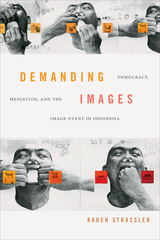 Demanding Images: Democracy, Mediation, and the Image-Event in Indonesia
Karen Strassler
Duke University Press, 2019 The end of authoritarian rule in 1998 ushered in an exhilarating but unsettled period of democratization in Indonesia. A more open political climate converged with a rapidly changing media landscape, yielding a vibrant and volatile public sphere within which Indonesians grappled with the possibilities and limits of democracy amid entrenched corruption, state violence, and rising forms of intolerance. In Demanding Images Karen Strassler theorizes image-events as political processes in which publicly circulating images become the material ground of struggles over the nation's past, present, and future. Considering photographs, posters, contemporary art, graffiti, selfies, memes, and other visual media, she argues that people increasingly engage with politics through acts of making, circulating, manipulating, and scrutinizing images. Demanding Images is both a closely observed account of Indonesia's turbulent democratic transition and a globally salient analysis of the work of images in the era of digital media and neoliberal democracy. Strassler reveals politics today to be an unruly enterprise profoundly shaped by the affective and evidentiary force of images.
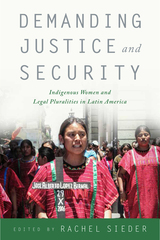 Demanding Justice and Security: Indigenous Women and Legal Pluralities in Latin America
Sieder, Rachel
Rutgers University Press, 2017 Across Latin America, indigenous women are organizing to challenge racial, gender, and class discrimination through the courts. Collectively, by engaging with various forms of law, they are forging new definitions of what justice and security mean within their own contexts and struggles. They have challenged racism and the exclusion of indigenous people in national reforms, but also have challenged ‘bad customs’ and gender ideologies that exclude women within their own communities.
Featuring chapters on Bolivia, Colombia, Ecuador, Guatemala, and Mexico, the contributors to Demanding Justice and Security include both leading researchers and community activists. From Kichwa women in Ecuador lobbying for the inclusion of specific clauses in the national constitution that guarantee their rights to equality and protection within indigenous community law, to Me’phaa women from Guerrero, Mexico, battling to secure justice within the Inter-American Court of Human Rights for violations committed in the context of militarizing their home state, this book is a must-have for anyone who wants to understand the struggle of indigenous women in Latin America.
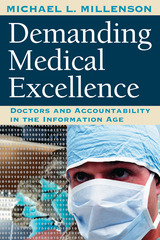 Demanding Medical Excellence: Doctors and Accountability in the Information Age
Michael L. Millenson
University of Chicago Press, 2000 Demanding Medical Excellence is a groundbreaking and accessible work that reveals how the information revolution is changing the way doctors make decisions. Michael Millenson, a three-time Pulitzer Prize nominee as a health-care reporter for the Chicago Tribune, illustrates serious flaws in contemporary medical practice and shows ways to improve care and save tens of thousands of lives.
"If you read only one book this year, read Demanding Medical Excellence. It's that good, and the revolution it describes is that important."—Health Affairs
"Millenson has done yeoman's work in amassing and understanding that avalanche of data that lies beneath most of the managed-care headlines. . . . What he finds is both important and well-explained: inconsistency, overlap, and inattention to quality measures in medical treatment cost more and are more dangerous than most cost-cutting measures. . . . [This book] elevates the healthcare debate to a new level and deserves a wide readership."—Library Journal
"An involving, human narrative explaining how we got to where we are today and what lies ahead."—Mark Taylor, Philadelphia Inquirer
"Read this book. It will entertain you, challenge, and strengthen you in your quest for better accountability in health care."—Alex R. Rodriguez, M.D., American Journal of Medical Quality
"Finally, a health-care book that doesn't wring its hands over the decline of medicine at the hands of money-grubbing corporations. . . . This is a readable account of what Millenson calls a 'quiet revolution' in health care, and his optimism makes for a refreshing change."—Publishers Weekly
"With meticulous detail, historical accuracy, and an uncommon understanding of the clinical field, Millenson documents our struggle to reach accountability."—Saty Satya-Murti, M.D., Journal of the American Medical Association
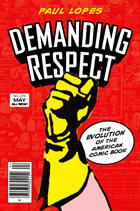 Demanding Respect: The Evolution of the American Comic Book
Paul Lopes
Temple University Press, 2009 How is it that comic books—the once-reviled form of lowbrow popular culture—are now the rage for Hollywood blockbusters, the basis for bestselling video games, and the inspiration for literary graphic novels? In Demanding Respect, Paul Lopes immerses himself in the discourse and practices of this art and subculture to provide a social history of the American comic book over the last 75 years. Lopes analyzes the cultural production, reception, and consumption of American comic books throughout history. He charts the rise of superheroes, the proliferation of serials, and the emergence of graphic novels. Demanding Respect explores how comic books born in the 1930s were perceived as a "menace" in the 1950s, only to later become collectors’ items and eventually "hip" fiction in the 1980s through today. Using a theoretical framework to examine the construction of comic book culture—the artists, publishers, readers and fans— Lopes explains how and why comic books have captured the public's imagination and gained a fanatic cult following.
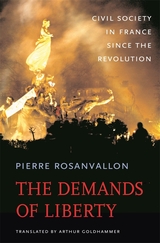 The Demands of Liberty: Civil Society in France since the Revolution
Pierre Rosanvallon
Harvard University Press, 2007 How does France reconcile the modern movement toward pluralism and decentralization with a strong central governing power? One of the country's most distinguished political historians offers a radical new interpretation of the development of democracy in France and the relationship between government and its citizens.
Since the publication of Tocqueville's Ancient Regime and the Revolution, French political structures have been viewed as the pure expression of a native Jacobinism, itself the continuation of an old absolutism. This interpretation has served as both a diagnosis of and an excuse for the inability to accept pluralism and decentralization as norms of a modern democracy, as evidenced in such policies as the persistence of the role of prefects and the ban on headscarves in schools.
Pierre Rosanvallon, by contrast, argues that the French have cherished and demonized Jacobinism at the same time; their hearts followed Robespierre, but their heads turned toward Benjamin Constant. The Demands of Liberty traces the long history of resistance to Jacobinism, including the creation of associations and unions and the implementation of elements of decentralization. Behind the ideological triumph of the state lies the conflicting creation of an active civil society.
In exploring these tensions, Rosanvallon takes the debate far beyond traditional views of liberalism versus republicanism and offers an innovative analysis of why the French system has worked despite Jacobinism.
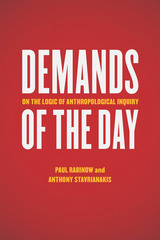 Demands of the Day: On the Logic of Anthropological Inquiry
Paul Rabinow and Anthony Stavrianakis
University of Chicago Press, 2013 Demands of the Day asks about the logical standards and forms that should guide ethical and experimental anthropology in the twenty-first century. Anthropologists Paul Rabinow and Anthony Stavrianakis do so by taking up Max Weber’s notion of the “demands of the day.” Just as the demand of the day for anthropology decades ago consisted of thinking about fieldwork, today, they argue, the demand is to examine what happens after, how the experiences of fieldwork are gathered, curated, narrated, and ultimately made available for an anthropological practice that moves beyond mere ethnographic description. Rabinow and Stavrianakis draw on experiences from an innovative set of anthropological experiments that investigated how and whether the human and biological sciences could be brought into a mutually enriching relationship. Conceptualizing the anthropological and philosophic ramifications of these inquiries, they offer a bold challenge to contemporary anthropology to undertake a more rigorous examination of its own practices, blind spots, and capacities, in order to meet the demands of our day.
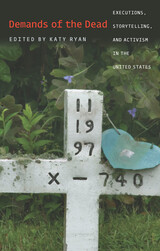 Demands of the Dead: Executions, Storytelling, and Activism in the United States
Katy Ryan
University of Iowa Press, 2012 The first work to combine literary criticism with other forms of death penalty–abolitionist writing, Demands of the Dead demonstrates the active importance of literature and literary criticism to the struggle for greater justice in the United States. Gathering personal essays, scholarly articles, and creative writings on the death penalty in American culture, this striking collection brings human voices and literary perspectives to a subject that is often overburdened by statistics and angry polemics. Contributors include death-row prisoners, playwrights, poets, activists, and literary scholars. Highlighting collaborations between writers inside and outside prison, all within the context of the history of state killing laws and foundational concepts that perpetuate a culture of violent death, Demands of the Dead opens with a pamphlet dictated by Willie Francis, a teenager who survived a first execution attempt in Louisiana’s electric chair before he was subsequently killed by the state in 1947. Writers are a conspicuous part of U.S. death-penalty history, composing a vibrant literary record of resistance to state killing. This multigenre collection both recalls and contributes to this tradition through discussions of such writers as Walt Whitman, Herman Melville, Gertrude Atherton, Ernest Gaines, Sonia Sanchez, Kia Corthron, and Sherman Alexie. A major contribution to literary studies and American prison studies, Demands of the Dead asserts the relevance of storytelling to ethical questions and matters of public policy. Contributors Sherman Alexie John Cyril Barton Steve Champion Kia Corthron Thomas Dutoit Willie Francis H. Bruce Franklin Tom Kerr David Kieran Jennifer Leigh Lieberman Jill McDonough Anthony Ross Katy Ryan Elizabeth Ann Stein Rick Stetter Matthew Stratton Jason Stupp Delbert Tibbs
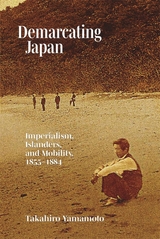 Demarcating Japan: Imperialism, Islanders, and Mobility, 1855–1884
Takahiro Yamamoto
Harvard University Press, 2023 Histories of remote islands around Japan are usually told through the prism of territorial disputes. In contrast, Takahiro Yamamoto contends that the transformation of the islands from ambiguous border zones to a territorialized space emerged out of multilateral power relations. Sakhalin, the Kuril Islands, Tsushima, the Bonin Islands, and the Ryukyu Islands became the subject of inter-imperial negotiations during the formative years of modern Japan as empires nudged each other to secure their status with minimal costs rather than fighting a territorial scramble. Based on multiarchival, multilingual research, Demarcating Japan argues that the transformation of border islands should be understood as an interconnected process, where inter-local referencing played a key role in the outcome: Japan’s geographical expansion in the face of domineering Extra-Asian empires.
Underneath this multilateral process were the connections forged by individuals. Translators, doctors, traffickers, castaways, and indigenous hunters crisscrossed border regions and enacted violence, exchanged knowledge, and forged friendships. Although their motivations were eclectic and their interactions transcended national borders, the linkages they created were essential in driving territorialization forward. Demarcating Japan demonstrates the crucial role of nonstate actors in formulating a territory.
 Demarcating the Disciplines: Philosophy, Literature, Art
Samuel Weber, Henry Sussman, and Wlad Godzich, Editors
University of Minnesota Press, 1986 Demarcating the Disciplines was first published in 1986. Minnesota Archive Editions uses digital technology to make long-unavailable books once again accessible, and are published unaltered from the original University of Minnesota Press editions. With publication of this volume, Glyph begins a new stage in its existence: the move from Johns Hopkins University Press to the University of Minnesota Press is accompanied by a change in focus. In its first incarnation Glyph provided a forum in which established notions of reading, writing, and criticism could be questioned and explored. Since then, the greater currency of such concerns has brought with it new problems and priorities. Setting aside the battles of the past, the new Glyph looks ahead - to confront historical issues and to address the institutional and pedagogical questions emerging from the contemporary critical landscape. Each volume in the new Glyph series is organized around a specific issue. The essays in this first volume explore the relations between the practice of reading and writing and the operations of the institution. Though their approaches differ from one another, the authors of these essays all recognize that the questions of the institution - most notably the university - points toward a series of constraints that define, albeit negatively, the possibilities for change. The contributors: Samuel Weber, Jacques Derrida, Tom Conley, Malcolm Evans, Ruth Salvaggio, Robert Young, Henry Sussman, Peter Middleton, David Punter, and Donald Preziosi.
 The DeMarco Factor: Transforming Public Will into Political Power
Michael Pertschuk
Vanderbilt University Press, 2010 Vinny DeMarco might be a latter-day Don Quixote except that he tilts his lance at real obstacles to social justice: lobby-locked state legislatures and Congress, stonewalling the public will. And he makes impossible dreams come true. In twenty years of organizing campaigns in Maryland, he has led successful efforts to pass gun control laws (against National Rifle Association opposition), to hike cigarette taxes to prevent youth smoking, and to extend health care to hundreds of thousands of low-income workers. He has also built a unique alliance of mainstream and conservative faith groups, which helped secure rare bipartisan votes in Congress for the enactment in July 2009 of landmark FDA regulation of tobacco manufacture and marketing.
DeMarco's unique strategic template, developed over two decades of serial campaigning, includes momentum-building stages over a multiyear campaign; unrelenting, skillful access to the media for engaging public support; coalitions of hundreds, even thousands, of faith, community, labor, public health, and business groups; and a hard press on candidates to support legislation before elections, rather than after they are comfortably in office. As an organizer/leader, Demarco also succeeds in his campaigns through force of personality: his unquenchable exuberance and idiosyncrasies delight and madden his opponents--sometimes his allies, too.
Michael Pertschuk, himself a veteran advocate, here chronicles three of DeMarco's campaigns, each facing a different obstacle course. His deep analysis draws out strategic and leadership lessons that engaged citizens and advocates for popular causes stonewalled by powerful lobbies can put to immediate and practical use.
 Dementia Caregivers Share Their Stories: A Support Group in a Book
Lynda A. Markut
Vanderbilt University Press, 2005 Replete with the powerful words of experienced caregivers, Dementia Caregivers Share Their Stories is an essential guidebook for anyone who must attend to the needs of a loved one suffering from Alzheimer's disease or another form of dementia. In these pages, members of caregivers' support groups - representing twenty-six families and a variety of professions and income levels - speak candidly about the challenges they have faced at every step in the caregiving process, from recognizing early symptoms of dementia to dealing with its advanced stages. Highlighting the ingenuity and resourcefulness of caregivers, the book brims with inspirational stories, practical advice, and creative approaches to problem-solving. Among the issues addressed are: Becoming a caregiver, whether for a spouse or parent
Dealing with the personality changes caused by dementia, from anxiety and paranoia to hallucinations and impulsive behavior
Keeping dementia sufferers meaningfully involved in life
Handling the emotions and stresses of caregiving
Seeking help through support groups and other sources, including medical professionals, clergy, and other family members The authors, who have both been caregivers themselves, augment their interviewees' stories with connective commentary and their own personal stories. A useful resource section is included to refer readers to associations and help-lines.
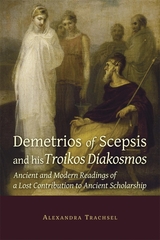 Demetrios of Scepsis and His Troikos Diakosmos: Ancient and Modern Readings of a Lost Contribution to Ancient Scholarship
Alexandra Trachsel
Harvard University Press, 2019 Ancient scholarship had many faces, but most have faded away over time. Demetrios of Scepsis is one of the more shadowy of these lost figures, best known for his commentary on the Trojan Catalogue in Book 2 of the Iliad. Alexandra Trachsel’s work represents the first treatment dedicated to Demetrios of Scepsis in over a century. Because of the incomplete transmission of Demetrios’s work, Trachsel necessarily focuses on the way later readers understood the ancient author’s engagement with the Homeric text. Indeed, modern scholars have access to Demetrios’s analysis of the Trojan Catalogue only through their readings.
Trachsel’s work offers a thorough analysis of the ancient and modern reactions to Demetrios’s research into the Homeric text and the Trojan landscape, and it revisits the ongoing debate about the setting for Homer’s Trojan poem. Trachsel also provides new evidence about the impressively wide range of other topics Demetrios’s work may have contained.
 Demigods on Speedway
Aurelie Sheehan
University of Arizona Press, 2014 Men in dinosaur suits. A Norwegian freakazoid millionaire. Cats and catharsis, somber symbols, listless lives going off the rails. Pluck, persistence, and the pursuit of happiness.
In the tradition of Joyce’s Dubliners, Demigods on Speedway is a portrait of a city that reflects the recession-era Southwest. Inspired by tales from Greek mythology, these gritty heroes and heroines struggle to find their place in the cosmos. Each of these linked stories develops the extremes of the modern psyche: an executive struggling to understand his wife’s illness even as he compulsively cheats on her, a teenage runaway whose attraction to her “twin” is bound to fail, an overweight boy vicariously experiencing true love through the tales of his trainer, a car-wash attendant with outsized dreams of Hollywood.
Characters with mythical-sounding names like Dagfinn and Zero plot their courses through a sky riddled with flawed constellations. Sheehan’s edgy language aptly reveals her characters as they lurch toward the next day’s irreverent beginning. As the characters’ lives overlap, their stories carry mythology out of the past and into a very modern dilemma: the cumulative sense that here is a city with its own demigods, individuals struggling to survive under siege while passionately seeking to make something immortal in their lives.
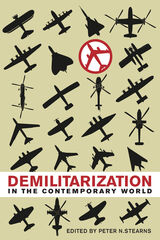 Demilitarization in the Contemporary World
Edited by Peter N. Stearns
University of Illinois Press, 2013 Contemporary world history has highlighted militarization in many ways, from the global Cold War and numerous regional conflicts to the general assumption that nationhood implies a significant and growing military. Yet the twentieth century also offers notable examples of large-scale demilitarization, both imposed and voluntary. Demilitarization in the Contemporary World fills a key gap in current historical understanding by examining demilitarization programs in Germany, Japan, Honduras, Guatemala, El Salvador, and Costa Rica. In nine insightful chapters, this volume's contributors outline each nation's demilitarization choices and how they were made. They investigate factors such as military defeat, border security risks, economic pressures, and the development of strong peace cultures among citizenry. Also at center stage is the influence of the United States, which fills a paradoxical role as both an enabler of demilitarization and a leader in steadily accelerating militarization. Bookended by Peter N. Stearns' thought-provoking historical introduction and forward-looking conclusion, the chapters in this volume explore what true demilitarization means and how it impacts a society at all levels, military and civilian, political and private. The examples chosen reveal that successful demilitarization must go beyond mere troop demobilization or arms reduction to generate significant political and even psychological shifts in the culture at large. Exemplifying the political difficulties of demilitarization in both its failures and successes, Demilitarization in the Contemporary World provides a possible roadmap for future policies and practices.
The Demise of Diversity: Loss and Extinction
Josef Reichholf
Haus Publishing, 2009 Maintaining the natural diversity of the countless species on Earth is of fundamental importance for the continued existence of life on this planet. Nevertheless, ecosystems are being destroyed, as the cultivation of land for agriculture, industry and housing is intensified and oceans continue to be exploited. The Demise of Diversity: Loss and Extinction deals with biodiversity on this planet and the vital importance of sustaining it—nothing less than the future of life on Earth.
 The Demise of Yugoslavia: A Political Memoir
Stipe Mesic
Central European University Press, 2004 Formed in the aftermath of WWI, Yugoslavia was founded as the Kingdom of Serbs, Croats and Slovenes ("three tribes of the same people"). But in the early 1990s, following a series of violent conflicts on Slovenian and Croatian soil, the two republics successfully succeeded from Yugoslavia, which would later be followed by Bosnia-Herzegovina and Macedonia. Mesic was member, later head of the Presidency of the Yugoslav Federation from August 1990. His memoir details an intricately woven storyline, which analyzes events, personalities and motivations inside Yugoslavia and its former nations, as well as in the international arena. The narrative is rich with excerpts from Mesic's personal diaries during times of heated conflict and bloodshed. Extensive notes and a short chronology assist the interested reader and scholar in disentangling the complicated plot. After years of relative political passivity, Mesic was elected independent Croatia's second president in 2000, following the death of former President Franjo Tudman.
 Democracy: A Case Study
David A. Moss
Harvard University Press, 2017 A Foreign Affairs Best Book of the Year
“This absolutely splendid book is a triumph on every level. A first-rate history of the United States, it is beautifully written, deeply researched, and filled with entertaining stories. For anyone who wants to see our democracy flourish, this is the book to read.”
—Doris Kearns Goodwin
To all who say our democracy is broken—riven by partisanship, undermined by extremism, corrupted by wealth—history offers hope. Democracy’s nineteen cases, honed in David Moss’s popular course at Harvard and taught at the Library of Congress, in state capitols, and at hundreds of high schools across the country, take us from Alexander Hamilton’s debates in the run up to the Constitutional Convention to Citizens United. Each one presents a pivotal moment in U.S. history and raises questions facing key decision makers at the time: Should the delegates support Madison’s proposal for a congressional veto over state laws? Should Lincoln resupply Fort Sumter? Should Florida lawmakers approve or reject the Equal Rights Amendment? Should corporations have a right to free speech? Moss invites us to engage in the passionate debates that are crucial to a healthy society.
“Engagingly written, well researched, rich in content and context…Moss believes that fierce political conflicts can be constructive if they are mediated by shared ideals.”
—Glenn C. Altschuler, Huffington Post
“Gives us the facts of key controversies in our history—from the adoption of the constitution to Citizens United—and invites readers to decide for themselves…A valuable resource for civic education.”
—Michael Sandel, author of Justice
 Democracy After Pinochet: Politics, Parties, and Elections in Chile
Alan Angell
University of London Press, 2007 This book explores how democracy has developed in Chile since the end of the military dictatorship in 1990. It brings together an examination of international influences on the country's political development with empirically based analyses of Chilean political institutions and change. Chapters one and two examine international aspects of the 1973 coup and how these influenced the development of politics inside Chile. Chapters three, four, and five provide empirical analyses of the 1989, 1993, and 1999/2000 presidential elections, respectively. Chapter six investigates how the Pinochet factor influenced developments after 1990 and the Chilean reaction to Pinochet's arrest in London in 1998. Chapter seven assesses changes in the Chilean party system and links these to similar processes elsewhere. The final chapter examines the paradox that despite economic and social advances, opinion polls report a low level of attachment to democracy and very low levels of confidence in political institutions.
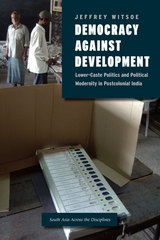 Democracy against Development: Lower-Caste Politics and Political Modernity in Postcolonial India
Jeffrey Witsoe
University of Chicago Press, 2013 Hidden behind the much-touted success story of India’s emergence as an economic superpower is another, far more complex narrative of the nation’s recent history, one in which economic development is frequently countered by profoundly unsettling, and often violent, political movements. In Democracy against Development, Jeffrey Witsoe investigates this counter-narrative, uncovering an antagonistic relationship between recent democratic mobilization and development-oriented governance in India.
Witsoe looks at the history of colonialism in India and its role in both shaping modern caste identities and linking locally powerful caste groups to state institutions, which has effectively created a postcolonial patronage state. He then looks at the rise of lower-caste politics in one of India’s poorest and most populous states, Bihar, showing how this increase in democratic participation has radically threatened the patronage state by systematically weakening its institutions and disrupting its development projects. By depicting democracy and development as they truly are in India—in tension—Witsoe reveals crucial new empirical and theoretical insights about the long-term trajectory of democratization in the larger postcolonial world.
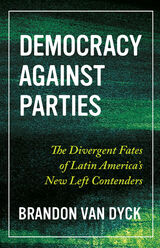 Democracy Against Parties: The Divergent Fates of Latin America’s New Left Contenders
Brandon Van Dyck
University of Pittsburgh Press, 2021 Around the world, established parties are weakening, and new parties are failing to take root. In many cases, outsiders have risen and filled the void, posing a threat to democracy. Why do most new parties fail? Under what conditions do they survive and become long-term electoral fixtures? Brandon Van Dyck investigates these questions in the context of the contemporary Latin American left. He argues that stable parties are not an outgrowth of democracy. On the contrary, contemporary democracy impedes successful party building. To construct a durable party, elites must invest time and labor, and they must share power with activists. Because today’s elites have access to party substitutes like mass media, they can win votes without making such sacrifices in time, labor, and autonomy. Only under conditions of soft authoritarianism do office-seeking elites have a strong electoral incentive to invest in party building. Van Dyck illustrates this argument through a comparative analysis of four new left parties in Latin America: two that collapsed and two that survived.
Democracy Ancient and Modern
Finley, M. I.
Rutgers University Press, 1985
This elegant and provocative book is perhaps more important now than when it was first published. The three essays that comprised the first edition developed a remarkable discourse between ancient Greek and modern conceptions of democracy, in the belief that each society could help us understand the other. To the original three essays, Sir M. I. Finley has added two that clarify and elaborate the thinking of the first edition.
The two new essays, "Athenian Dialogues" and "Censorship in Classical Antiquity" combine with "Leaders and Followers," "Democracy, Consensus, and the National Interest," "Socrates and After" to make this book an unusual inquiry. Few contemporary writers are able to bring to the subject the depth of learning and the persuasive power of language that Sir M. I. Finley brings.
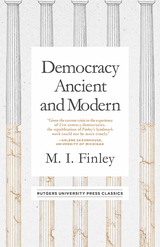 Democracy Ancient and Modern
Finley, M. I.
Rutgers University Press, 2019 Western democracy is now at a critical juncture. Some worry that power has been wrested from the people and placed in the hands of a small political elite. Others argue that the democratic system gives too much power to a populace that is largely ill-informed and easily swayed by demagogues.
This classic study of democratic principles is thus now more relevant than ever. A renowned historian of antiquity and political philosophy, Sir M.I. Finley offers a comparative analysis of Greek and modern conceptions of democracy. As he puts the ancient Greeks in dialogue with their contemporary counterparts, Finley tackles some of the most pressing issues of our day, including public apathy, partisanship, consensus politics, distrust of professional politicians, and the limits of free speech.
Including three lectures that Finley delivered at Rutgers University, plus two additional essays that further illuminate his thinking, Democracy Ancient and Modern explores the dramatic differences between the close-knit civil society of the ancient Greeks and our own atomized mass societies. By mapping out democracy’s past and its present manifestations, this book helps us plot a course for democracy’s future.
Democracy and Classical Greece: Second Edition
J. K. Davies
Harvard University Press, 1993 The art of classical Greece, and its political and philosophical ideas, have had a profound influence on Western civilization. It was in the fifth and fourth centuries BC that this Greek culture—material, political and intellectual—reached its zenith. At the same time, the Greek states were at their most powerful and quarrelsome. J. K. Davies traces the flowering of this extraordinary society, drawing on a wealth of documentary material: houses and graves, extant sculpture and vases, as well as the writings of historians, orators, biographers, dramatists, and philosophers.
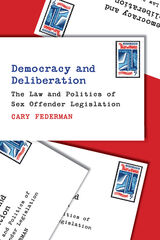 Democracy and Deliberation: The Law and Politics of Sex Offender Legislation
Cary Federman
University of Michigan Press, 2021 Sex offender laws include residency restrictions, registration and notification requirements, and post-conviction civil commitment. These laws and regulations impose serious restrictions on the movements of convicted sex offenders. This is controversial because these laws and regulations occur after the sex offender has completed his time in prison. These laws and regulations are intended to have both a deterrent and therapeutic effect. Residency restrictions seek to prevent sex offenders from re-committing their crimes and civil commitment provides psychological services while incarcerated in a forensic facility. Most works on this subject are deeply critical of these laws. Cary Federman takes a more sympathetic approach to sex offender legislation. He focuses on the deliberative intentions of legislators, exploring the limits of judicial review and the rights of interested parties to influence lawmaking. Leaders of these interested parties are usually the parents of children who have been sexually violated and murdered. Critics of sex offender legislation tend to focus on the convicted parties, arguing that their rights have been violated. The Law and Politics of Sex Offender Legislation asserts that these laws are expressions of the deliberative intentions of lawmakers concerned about public safety—they are thus constitutional, if not always wise.
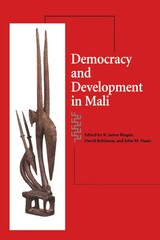 Democracy and Development in Mali
R. James Bingen
Michigan State University Press, 2000 Mali, a country rich with history and culture, but one of the poorest in the world, emerged in the 1990s as one of Africa's most vibrant democracies. Strengthened by bold political and economic reforms at home, Mali has emerged as a leader in African peace keeping efforts. How has such a transition taken place? How have these changes built on Mali's rich heritage? These are the questions that the contributors to this volume have addressed. During the past twenty-five years, the scholarly research and applied development work of Michigan State University faculty and students in Mali represents the most significant combined, long-term, and continuing contribution of any group of university faculty in the United States or Europe to the study of Malian society, economy, and politics. The applied nature of much of this work has resulted in a significant number of working papers, reports, and conference presentations. This volume represents a coherent and connected set of essays from one American university with a widely known and highly respected role in African development. While the essays identify and review Mali's unique historical and contemporary path to democracy and development, they also contribute to the advancement of theoretical knowledge about African development.
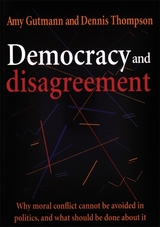 Democracy and Disagreement
Amy Gutmann and Dennis Thompson
Harvard University Press, 1996 The din and deadlock of public life in America—where insults are traded, slogans proclaimed, and self-serving deals made and unmade—reveal the deep disagreement that pervades our democracy. The disagreement is not only political but also moral, as citizens and their representatives increasingly take extreme and intransigent positions. A better kind of public discussion is needed, and Amy Gutmann and Dennis Thompson provide an eloquent argument for “deliberative democracy” today. They develop a principled framework for opponents to come together on moral and political issues.
Gutmann and Thompson show how a deliberative democracy can address some of our most difficult controversies—from abortion and affirmative action to health care and welfare—and can allow diverse groups separated by class, race, religion, and gender to reason together. Their work goes beyond that of most political theorists and social scientists by exploring both the principles for reasonable argument and their application to actual cases. Not only do the authors suggest how deliberative democracy can work, they also show why improving our collective capacity for moral argument is better than referring all disagreements to procedural politics or judicial institutions. Democracy and Disagreement presents a compelling approach to how we might resolve some of our most trying moral disagreements and live with those that will inevitably persist, on terms that all of us can respect.
 Democracy and Distrust: A Theory of Judicial Review
John Hart Ely
Harvard University Press, 1981 This powerfully argued appraisal of judicial review may change the face of American law. Written for layman and scholar alike, the book addresses one of the most important issues facing Americans today: within what guidelines shall the Supreme Court apply the strictures of the Constitution to the complexities of modern life?
Until now legal experts have proposed two basic approaches to the Constitution. The first, “interpretivism,” maintains that we should stick as closely as possible to what is explicit in the document itself. The second, predominant in recent academic theorizing, argues that the courts should be guided by what they see as the fundamental values of American society. John Hart Ely demonstrates that both of these approaches are inherently incomplete and inadequate. Democracy and Distrust sets forth a new and persuasive basis for determining the role of the Supreme Court today.
Ely’s proposal is centered on the view that the Court should devote itself to assuring majority governance while protecting minority rights. “The Constitution,” he writes, “has proceeded from the sensible assumption that an effective majority will not unreasonably threaten its own rights, and has sought to assure that such a majority not systematically treat others less well than it treats itself. It has done so by structuring decision processes at all levels in an attempt to ensure, first, that everyone’s interests will be represented when decisions are made, and second, that the application of those decisions will not be manipulated so as to reintroduce in practice the sort of discrimination that is impermissible in theory.”
Thus, Ely’s emphasis is on the procedural side of due process, on the preservation of governmental structure rather than on the recognition of elusive social values. At the same time, his approach is free of interpretivism’s rigidity because it is fully responsive to the changing wishes of a popular majority. Consequently, his book will have a profound impact on legal opinion at all levels—from experts in constitutional law, to lawyers with general practices, to concerned citizens watching the bewildering changes in American law.
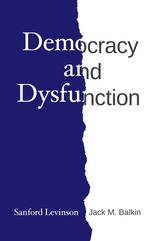 Democracy and Dysfunction
Sanford Levinson and Jack M. Balkin
University of Chicago Press, 2019 It is no longer controversial that the American political system has become deeply dysfunctional. Today, only slightly more than a quarter of Americans believe the country is heading in the right direction, while sixty-three percent believe we are on a downward slope. The top twenty words used to describe the past year include “chaotic,” “turbulent,” and “disastrous.” Donald Trump’s improbable rise to power and his 2016 Electoral College victory placed America’s political dysfunction in an especially troubling light, but given the extreme polarization of contemporary politics, the outlook would have been grim even if Hillary Clinton had won. The greatest upset in American presidential history is only a symptom of deeper problems of political culture and constitutional design.
Democracy and Dysfunction brings together two of the leading constitutional law scholars of our time, Sanford Levinson and Jack M. Balkin, in an urgently needed conversation that seeks to uncover the underlying causes of our current crisis and their meaning for American democracy. In a series of letters exchanged over a period of two years, Levinson and Balkin travel—along with the rest of the country—through the convulsions of the 2016 election and Trump’s first year in office. They disagree about the scope of the crisis and the remedy required. Levinson believes that our Constitution is fundamentally defective and argues for a new constitutional convention, while Balkin, who believes we are suffering from constitutional rot, argues that there are less radical solutions. As it becomes dangerously clear that Americans—and the world—will be living with the consequences of this pivotal period for many years to come, it is imperative that we understand how we got here—and how we might forestall the next demagogue who will seek to beguile the American public.
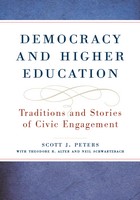 Democracy and Higher Education: Traditions and Stories of Civic Engagement
Scott J. Peters
Michigan State University Press, 2010 How are we to understand the nature and value of higher education's public purposes, mission, and work in a democratic society? How do-and how should-academic professionals contribute to and participate in civic life in their practices as scholars, scientists, and educators?
Democracy and Higher Education addresses these questions by combining an examination of several normative traditions of civic engagement in American higher education with the presentation and interpretation of a dozen oral history profiles of contemporary practitioners. In his analysis of these profiles, Scott Peters reveals and interprets a democratic-minded civic professionalism that includes and interweaves expert, social critic, responsive service, and proactive leadership roles.
Democracy and Higher Education contributes to a new line of research on the critically important task of strengthening and defending higher education's positive roles in and for a democratic society.
 Democracy and Imperialism: Irving Babbitt and Warlike Democracies
William S. Smith
University of Michigan Press, 2019 Following costly U.S. engagement in two wars in the Middle East, questions about the appropriateness of American military interventions dominate foreign policy debates. Is an interventionist foreign policy compatible with the American constitutional tradition?
This book examines critic Irving Babbitt’s (1865–1933) unique contribution to understanding the quality of foreign policy leadership in a democracy. Babbitt explored how a democratic nation’s foreign policy is a product of the moral and cultural tendencies of the nation’s leaders, arguing that the substitution of expansive, sentimental Romanticism for the religious and ethical traditions of the West would lead to imperialism.
The United States’ move away from the restraint and order of sound constitutionalism to involve itself in the affairs of other nations will inevitably cause a clash with the “civilizational” regions that have emerged in recent decades. Democracy and Imperialism uses the question of soul types to address issues of foreign policy leadership, and discusses the leadership qualities that are necessary for sound foreign policy.
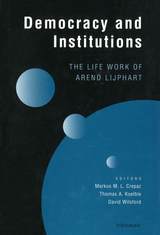 Democracy and Institutions: The Life Work of Arend Lijphart
Markus M. L. Crepaz, Thomas A. Koelble, and David Wilsford, Editors
University of Michigan Press, 2000 Institutions are the channels of political power. This volume explores Arend Lijphart's life work--the design of political institutions. All the contributors to this volume share the fundamental insight that the design of political institutions matters in how democracies work.
The essays in this volume offer both theoretical insights into the context and implications of Lijphart's ideas and empirical exploration of the ideas. Two chapters by Thomas Koelble and Andrew Reynolds examine and apply Lijphart's insights to South Africa, while another study by Jack Nagel explores the fascinating institutional changes taking place in New Zealand. Essays by Bernard Grofman and Rein Taagepera examine Lijphart's work from a theoretical perspective and place Lijphart's work in the wider neo-institutionalist school of thought. Milton Esman applies the principle of power-sharing to mobilized communities, not only in democratic societies but also to those which are governed by authoritarian rule. Bingham Powell offers an empirical approach to the crucial question of the connection between political institutions and responsiveness of policy-makers. Markus M. L. Crepaz and Vicki Birchfield argue that in this age of globalization, countries with consensual political institutions will not only systematically refract the pressures of globalization but will be able to absorb the domestic consequences of globalization more successfully than majoritarian countries. Finally, Arend Lijphart responds to the arguments made in these essays, extending and adding novel concepts and insights to his conceptual framework.
The book will be of interest to political scientists, lawyers, and sociologists who study institutions, the impact of electoral systems, and constitutional design. In addition, those who study "globalization" will be attracted by the relevance of domestic political institutions and their refractory effects as the tides of globalization wash against the domestic shores.
Markus M. L. Crepaz is Associate Professor of Political Science, University of Georgia. Thomas A. Koelble is Associate Professor of Political Science, University of Miami. David Wilsford is President and Professor, the Institute for American Universities.
Democracy and Lobbying in the European Union
Karolina Karr
Campus Verlag, 2007 Can interest groups and lobbyists—arguably undemocratic institutions—operate in democratic systems without hindering the people’s interests? Karolina Karr’s Democracy and Lobbying in the European Union explores the role and potential impact of interest groups on democracy, both in theory and practice, in the context of a changing continent. This timely volume explores how the power of interest groups has developed due to the growing distance between elected representatives and the European people and forecasts what this development might mean for the vitality of government.
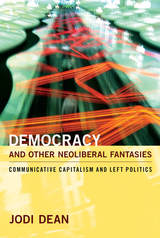 Democracy and Other Neoliberal Fantasies: Communicative Capitalism and Left Politics
Jodi Dean
Duke University Press, 2009 Democracy and Other Neoliberal Fantasies is an impassioned call for the realization of a progressive left politics in the United States. Through an assessment of the ideologies underlying contemporary political culture, Jodi Dean takes the left to task for its capitulations to conservatives and its failure to take responsibility for the extensive neoliberalization implemented during the Clinton presidency. She argues that the left’s ability to develop and defend a collective vision of equality and solidarity has been undermined by the ascendance of “communicative capitalism,” a constellation of consumerism, the privileging of the self over group interests, and the embrace of the language of victimization. As Dean explains, communicative capitalism is enabled and exacerbated by the Web and other networked communications media, which reduce political energies to the registration of opinion and the transmission of feelings. The result is a psychotic politics where certainty displaces credibility and the circulation of intense feeling trumps the exchange of reason. Dean’s critique ranges from her argument that the term democracy has become a meaningless cipher invoked by the left and right alike to an analysis of the fantasy of free trade underlying neoliberalism, and from an examination of new theories of sovereignty advanced by politicians and left academics to a look at the changing meanings of “evil” in the speeches of U.S. presidents since the mid-twentieth century. She emphasizes the futility of a politics enacted by individuals determined not to offend anyone, and she examines questions of truth, knowledge, and power in relation to 9/11 conspiracy theories. Dean insists that any reestablishment of a vital and purposeful left politics will require shedding the mantle of victimization, confronting the marriage of neoliberalism and democracy, and mobilizing different terms to represent political strategies and goals.
 Democracy and Poetry
Robert Penn Warren
Harvard University Press, 1975 In these two essays, one of America’s most honored writers fastens on the interrelation of American democracy and poetry and the concept of selfhood vital to each. “I really don’t want to make a noise like a pundit,” Mr. Warren declares, “What I do want to do is to return us—and myself most of all—to a scrutiny of our own experience of our own world.” Indeed, Democracy and Poetry offers one of the most pertinent and strongly personal meditations on our condition to have appeared in recent letters.
Our native “poetry,” that is, literature and art, in general, is a social document, is “diagnostic,” and has often been a corrosive criticism of our democracy, Mr. Warren argues. Persuasively, and movingly, he shows that all of “art” and all that goes into the making of democracy require a free and responsible self. Yet the American experience has been one of the decay of the notion of self. Our astounding success jeopardized what we promised to create—the free man. For a century and a half the conception of the self has been dwindling, separating itself from traditional values, moral identity, and a secure relation with community. Lonely heroes in a bankrupt civilization, then protest, despair, aimlessness, and violence, have marked our literature.
The anguish of Robert Penn Warren’s own poetic vision of art and democracy is soothed only by his belief that poetry—the making of art can nourish and at least do something toward the rescue of democracy; he shows how art can be- come a healer, can be “therapeutic.” In the face of disintegrative forces set loose in a business and technetronic society, it is poetry that affirms the notion of the self. It is a model of the organized self, an emblem of the struggle for the achieving self, and of the self in a community. More and more as our modern technetronic society races toward the abolition of the self, and diverges from a culture created to enhance the notion of selfhood, poetry becomes indispensable.
Compelling, resonant, memorable, Democracy and Poetry is a major testament not only to the vitality of poetry, but also to a faith in democracy.
 Democracy and Revolution: Latin America and Socialism Today
D. L. Raby
Pluto Press, 2006 Is socialism dead since the fall of the Soviet Union? What is the way forward for the Left? D. L. Raby argues that Cuba and, above all, Venezuela provide inspiration for antiglobalization and anticapitalist movements across the world. Another World Is Possible, but only through an effective political strategy to win power on a popular and democratic basis.
Raby argues passionately that the way forward for progressives is not the dogmatic formulae of the Old Left, nor in the spontaneous autonomism of Antonio Negri. Instead, it is to be found in broad popular movements with bold leadership. Examining key leaders, including Hugo Chávez and the Sandinistas in Nicaragua, Raby shows that it is more necessary than ever to take power, peacefully where possible, but in all cases with the strength that comes from popular unity backed by force where necessary. In this way it is possible to build democratic power, which may or may not be socialist depending on one's definition, but which represent the real anti-capitalist alternative for the twenty-first century.
 Democracy and Social Ethics
Jane Addams
University of Illinois Press, 2001 Nearly a century before the advent of "multiculturalism," Jane Addams put forward her conception of the moral significance of diversity. Each member of a democracy, Addams believed, is under a moral obligation to seek out diverse experiences, making a daily effort to confront others' perspectives. Morality must be seen as a social rather than an individual endeavor, and democracy as a way of life rather than merely a basis for laws. Failing this, both democracy and ethics remain sterile, empty concepts.
In this, Addams's earliest book on ethics--presented here with a substantial introduction by Charlene Haddock Seigfried--she reflects on the factors that hinder the ability of all members of society to determine their own well-being. Observing relationships between charitable workers and their clients, between factory owners and their employers, and between household employers and their servants, she identifies sources of friction and shows how conceiving of democracy as a social obligation can lead to new, mutually beneficial lines of conduct. She also considers the proper education of workers, struggles between parents and their adult daughters over conflicting family and social claims, and the merging of politics with the daily lives of constituents.
"The sphere of morals is the sphere of action," Addams proclaims. It is not enough to believe passively in the innate dignity of all human beings. Rather, one must work daily to root out racial, gender, class, and other prejudices from personal relationships.
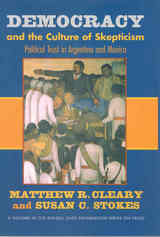 Democracy and the Culture of Skepticism: The Politics of Trust in Argentina and Mexico
Matthew R. Cleary
Russell Sage Foundation, 2006 Some theorists claim that democracy cannot work without trust. According to this argument, democracy fails unless citizens trust that their governing institutions are serving their best interests. Similarly, some assert that democracy works best when people trust one another and have confidence that politicians will look after citizen interests. Questioning such claims, Democracy and the Culture of Skepticism, by Matthew Cleary and Susan Stokes, suggests that skepticism, not trust, is the hallmark of political culture in well-functioning democracies. Drawing on extensive research in two developing democracies, Argentina and Mexico, Democracy and the Culture of Skepticism shows that in regions of each country with healthy democracies, people do not trust one another more than those living in regions where democracy functions less well, nor do they display more personal trust in governments or politicians. Instead, the defining features of the healthiest democracies are skepticism of government and a belief that politicians act in their constituents' best interest only when it is personally advantageous for them to do so. In contrast to scholars who lament what they see as a breakdown in civic life, Cleary and Stokes find that people residing in healthy democracies do not participate more in civic organizations than others, but in fact, tend to retreat from civic life in favor of private pursuits. The authors conclude that governments are most efficient and responsive when they know that institutions such as the press or an independent judiciary will hold them accountable for their actions. The question of how much citizens should trust politicians and governments has consumed political theorists since America's founding. In Democracy and the Culture of Skepticism, Matthew Cleary and Susan Stokes test the relationship between trust and the quality of governance, showing that it is not trust, but vigilance and skepticism that provide the foundation for well-functioning democracies. A Volume in the Russell Sage Foundation Series on Trust
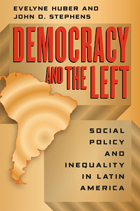 Democracy and the Left: Social Policy and Inequality in Latin America
Evelyne Huber and John D. Stephens
University of Chicago Press, 2012 Although inequality in Latin America ranks among the worst in the world, it has notably declined over the last decade, offset by improvements in health care and education, enhanced programs for social assistance, and increases in the minimum wage. In Democracy and the Left, Evelyne Huber and John D. Stephens argue that the resurgence of democracy in Latin America is key to this change. In addition to directly affecting public policy, democratic institutions enable left-leaning political parties to emerge, significantly influencing the allocation of social spending on poverty and inequality. But while democracy is an important determinant of redistributive change, it is by no means the only factor. Drawing on a wealth of data, Huber and Stephens present quantitative analyses of eighteen countries and comparative historical analyses of the five most advanced social policy regimes in Latin America, showing how international power structures have influenced the direction of their social policy. They augment these analyses by comparing them to the development of social policy in democratic Portugal and Spain. The most ambitious examination of the development of social policy in Latin America to date, Democracy and the Left shows that inequality is far from intractable—a finding with crucial policy implications worldwide.
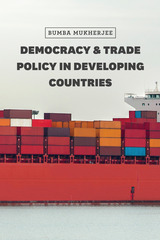 Democracy and Trade Policy in Developing Countries
Bumba Mukherjee
University of Chicago Press, 2016 Since the 1970s, two major trends have emerged among developing countries: the rise of new democracies and the rush to free trade. For some, the confluence of these events suggests that a free-market economy complements a fledgling democracy. Others argue that the two are inherently incompatible and that exposure to economic globalization actually jeopardizes new democracies. Which view is correct? Bumba Mukherjee argues that the reality of how democracy and trade policy unravel in developing countries is more nuanced than either account.
Mukherjee offers the first comprehensive cross-national framework for identifying the specific economic conditions that influence trade policy in developing countries. Laying out the causes of variation in trade policy in four developing or recently developed countries—Brazil, India, Indonesia, and South Africa—he argues persuasively that changing political interactions among parties, party leaders, and the labor market are often key to trade policy outcome. For instance, if workers are in a position to benefit from opening up to trade, party leaders in turn support trade reforms by decreasing tariffs and other trade barriers.
At a time when discussions about the stability of new democracies are at the forefront, Democracy and Trade Policy in Developing Countries provides invaluable insight into the conditions needed for a democracy to survive in the developing world in the context of globalization.
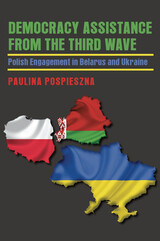 Democracy Assistance from the Third Wave: Polish Engagement in Belarus and Ukraine
Paulina Pospieszna
University of Pittsburgh Press, 2014 The role of Western NGOs in the transition of postcommunist nations to democracy has been well documented. In this study, Paulina Pospieszna follows a different trajectory, examining the role of a former aid recipient (Poland), newly democratic itself, and its efforts to aid democratic transitions in the neighboring states of Belarus and Ukraine.
Belarus is widely regarded as the most authoritarian state in the region, while Ukraine is witnessing a slow, if often troubled, democratic consolidation. Each state presents a different set of challenges to outside agencies. As Pospieszna shows, Poland is uniquely positioned to offer effective counsel on the transition to democracy. With similarities of language and culture, and a shared history, combined with strong civic activism and success within the European Union, Poland’s regional policies have successfully combined its need for security and a motivation to spread democracy as primary concerns. Pospieszna details the founding, internal workings, goals, and methods of Poland’s aid programs. She then compares the relative degrees of success of each in Belarus and Ukraine and documents the work yet to be done.
As her theoretical basis, Pospieszna analyzes current thinking on the methods and effectiveness of NGOs in transitions to democracy, particularly U.S.- and European-led aid efforts. She then views the applicability of these methods to the case of Poland and its aid recipients. Overwhelmingly, Pospieszna finds the greatest success in developmental programs targeting civil society—workers, intellectuals, teachers, students, and other NGO actors.
Through extensive interviews with government administrators and NGO workers in Poland and the United States, coupled with archival research, Pospieszna assembles an original perspective on the mitigation of the ‘postcommunist divide’. Her work will serve as a model for students and scholars of states in transition, and it provides an overview of both successful and unsuccessful strategies employed by NGOs in democracy assistance.
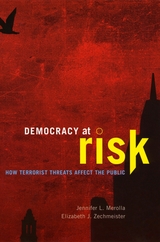 Democracy at Risk: How Terrorist Threats Affect the Public
Jennifer L. Merolla and Elizabeth J. Zechmeister
University of Chicago Press, 2009 How do threats of terrorism affect the opinions of citizens? Speculation abounds, but until now no one had marshaled hard evidence to explain the complexities of this relationship. Drawing on data from surveys and original experiments they conducted in the United States and Mexico, Jennifer Merolla and Elizabeth Zechmeister demonstrate how our strategies for coping with terrorist threats significantly influence our attitudes toward fellow citizens, political leaders, and foreign nations.
The authors reveal, for example, that some people try to restore a sense of order and control through increased wariness of others—especially of those who exist outside the societal mainstream. Additionally, voters under threat tend to prize “strong leadership” more highly than partisan affiliation, making some politicians seem more charismatic than they otherwise would. The authors show that a wary public will sometimes continue to empower such leaders after they have been elected, giving them greater authority even at the expense of institutional checks and balances. Having demonstrated that a climate of terrorist threat also increases support for restrictive laws at home and engagement against terrorists abroad, Merolla and Zechmeister conclude that our responses to such threats can put democracy at risk.
A Democracy at War: America’s Fight at Home and Abroad in World War II
William O'Neill
Harvard University Press As America fought to defend democracy in Europe and Asia during World War II, its own democratic politics both aided and impeded the war effort at home and the military campaigns abroad. Now, in a broad-ranging social, political, military, and diplomatic history, William O’Neill reveals how the United States won its victory despite its reluctance to enter the war, and despite proceeding by costly half-measures even after committing to battle.
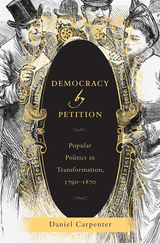 Democracy by Petition: Popular Politics in Transformation, 1790–1870
Daniel Carpenter
Harvard University Press, 2021 Winner of the James P. Hanlan Book Award
Winner of the J. David Greenstone Book Prize
Winner of the S. M. Lipset Best Book Award
This pioneering work of political history recovers the central and largely forgotten role that petitioning played in the formative years of North American democracy.
Known as the age of democracy, the nineteenth century witnessed the extension of the franchise and the rise of party politics. As Daniel Carpenter shows, however, democracy in America emerged not merely through elections and parties, but through the transformation of an ancient political tool: the petition. A statement of grievance accompanied by a list of signatures, the petition afforded women and men excluded from formal politics the chance to make their voices heard and to reshape the landscape of political possibility.
Democracy by Petition traces the explosion and expansion of petitioning across the North American continent. Indigenous tribes in Canada, free Blacks from Boston to the British West Indies, Irish canal workers in Indiana, and Hispanic settlers in territorial New Mexico all used petitions to make claims on those in power. Petitions facilitated the extension of suffrage, the decline of feudal land tenure, and advances in liberty for women, African Americans, and Indigenous peoples. Even where petitioners failed in their immediate aims, their campaigns advanced democracy by setting agendas, recruiting people into political causes, and fostering aspirations of equality. Far more than periodic elections, petitions provided an everyday current of communication between officeholders and the people.
The coming of democracy in America owes much to the unprecedented energy with which the petition was employed in the antebellum period. By uncovering this neglected yet vital strand of nineteenth-century life, Democracy by Petition will forever change how we understand our political history.
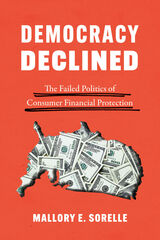 Democracy Declined: The Failed Politics of Consumer Financial Protection
Mallory E. SoRelle
University of Chicago Press, 2020 As Elizabeth Warren memorably wrote, “It is impossible to buy a toaster that has a one-in-five chance of bursting into flames and burning down your house. But it is possible to refinance an existing home with a mortgage that has the same one-in-five chance of putting the family out on the street.” More than a century after the government embraced credit to fuel the American economy, consumer financial protections in the increasingly complex financial system still place the onus on individuals to sift through fine print for assurance that they are not vulnerable to predatory lending and other pitfalls of consumer financing and growing debt.
In Democracy Declined, Mallory E. SoRelle argues that the failure of federal policy makers to curb risky practices can be explained by the evolution of consumer finance policies aimed at encouraging easy credit in part by foregoing more stringent regulation. Furthermore, SoRelle explains how angry borrowers’ experiences with these policies teach them to focus their attention primarily on banks and lenders instead of demanding that lawmakers address predatory behavior. As a result, advocacy groups have been mostly unsuccessful in mobilizing borrowers in support of stronger consumer financial protections. The absence of safeguards on consumer financing is particularly dangerous because the consequences extend well beyond harm to individuals—they threaten the stability of entire economies. SoRelle identifies pathways to mitigate these potentially disastrous consequences through greater public participation.
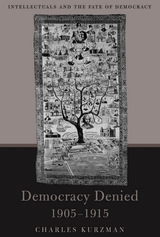 Democracy Denied, 1905-1915: Intellectuals and the Fate of Democracy
Charles Kurzman
Harvard University Press, 2008 In the decade before World War I, a wave of democratic revolutions swept the globe, consuming more than a quarter of the world’s population. Revolution transformed Russia, Iran, the Ottoman Empire, Portugal, Mexico, and China. In each case, a pro-democracy movement unseated a long-standing autocracy with startling speed. The nascent democratic regime held elections, convened parliament, and allowed freedom of the press and freedom of association. But the new governments failed in many instances to uphold the rights and freedoms that they proclaimed. Coups d’état soon undermined the democratic experiments.
How do we account for these unexpected democracies, and for their rapid extinction? In Democracy Denied, Charles Kurzman proposes that the collective agent most directly responsible for democratization was the emerging class of modern intellectuals, a group that had gained a global identity and a near-messianic sense of mission following the Dreyfus Affair of 1898.
Each chapter of Democracy Denied focuses on a single angle of this story, covering all six cases by examining newspaper accounts, memoirs, and government reports. This thoroughly interdisciplinary treatment of the early-twentieth-century upheavals promises to reshape debates about the social origins of democracy, the causes of democratic collapse, the political roles of intellectuals, and the international flow of ideas.
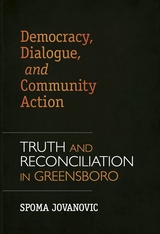 Democracy, Dialogue, and Community Action: Truth and Reconciliation in Greensboro
Spoma Jovanovic
University of Arkansas Press, 2012 On November 3, 1979, five protest marchers in Greensboro, North Carolina, were shot and killed by the Ku Klux Klan and the American Nazi Party. There were no police present, but television crews captured the shootings on video. Despite two criminal trials, none of the killers ever served time for their crimes, exposing what many believed to be the inadequacy of judicial, political, and economic systems in the United States. Twenty-five years later, in 2004, Greensboro residents, inspired by post-apartheid South Africa, initiated a Truth and Reconciliation Commission (TRC) to take public testimony and examine the causes, sequence of events, and consequences of the massacre. The TRC was to be a process and a tool by which citizens could feel confident about the truth of the city's history in order to reconcile divergent understandings of past and current city values, and it became the foundation for the first Truth and Reconciliation Commission in the United States. Spoma Jovanovic, who worked alongside other community members to document the grassroots effort to convene the first TRC in the United States, provides a resource and case study of how citizens in one community used their TRC as a way to understand the past and conceive the future. This book preserves the historical significance of a people's effort to seek truth and work for reconciliation, shows a variety of discourse models for other communities to use in seeking to redress past harms, and demonstrates the power of community action to promote participatory democracy.
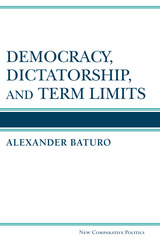 Democracy, Dictatorship, and Term Limits
Alexander Baturo
University of Michigan Press, 2014 A national constitution or other statute typically specifies restrictions on executive power, often including a limit to the number of terms the chief executive may hold office. In recent decades, however, some presidents of newly established democracies have extended their tenure by various semilegal means, thereby raising the specter—and in some cases creating the reality—of dictatorship. Alexander Baturo tracks adherence to and defiance of presidential term limits in all types of regimes (not only democratic regimes) around the world since 1960. Drawing on original data collection and fieldwork to investigate the factors that encourage playing by or manipulating the rules, he asks what is at stake for the chief executive if he relinquishes office. Baturo finds that the income-generating capacity of political office in states where rent-seeking is prevalent, as well as concerns over future immunity and status, determines whether or not an executive attempts to retain power beyond the mandated period. Democracy, Dictatorship, and Term Limitswill appeal to scholars of democratization and executive power and also to political theorists.
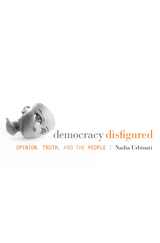 Democracy Disfigured: Opinion, Truth, and the People
Nadia Urbinati
Harvard University Press, 2014 In Democracy Disfigured, Nadia Urbinati diagnoses the ills that beset the body politic in an age of hyper-partisanship and media monopolies and offers a spirited defense of the messy compromises and contentious outcomes that define democracy.
Urbinati identifies three types of democratic disfiguration: the unpolitical, the populist, and the plebiscitarian. Each undermines a crucial division that a well-functioning democracy must preserve: the wall separating the free forum of public opinion from the governmental institutions that enact the will of the people. Unpolitical democracy delegitimizes political opinion in favor of expertise. Populist democracy radically polarizes the public forum in which opinion is debated. And plebiscitary democracy overvalues the aesthetic and nonrational aspects of opinion. For Urbinati, democracy entails a permanent struggle to make visible the issues that citizens deem central to their lives. Opinion is thus a form of action as important as the mechanisms that organize votes and mobilize decisions.
Urbinati focuses less on the overt enemies of democracy than on those who pose as its friends: technocrats wedded to procedure, demagogues who make glib appeals to “the people,” and media operatives who, given their preference, would turn governance into a spectator sport and citizens into fans of opposing teams.
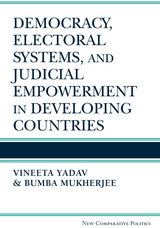 Democracy, Electoral Systems, and Judicial Empowerment in Developing Countries
Vineeta Yadav and Bumba Mukherjee
University of Michigan Press, 2014 The power granted to the courts, both in a nation’s constitution and in practice, reveals much about the willingness of the legislative and executive branches to accept restraints on their own powers. For this reason, an independent judiciary is considered an indication of a nation’s level of democracy. Vineeta Yadav and Bumba Mukherjee use a data set covering 159 developing countries, along with comparative case studies of Brazil and Indonesia, to identify the political conditions under which de jure independence is established. They find that the willingness of political elites to grant the courts authority to review the actions of the other branches of government depends on the capacity of the legislature and expectations regarding the judiciary’s assertiveness. Moving next to de facto independence, Yadav and Mukherjee bring together data from 103 democracies in the developing world, complemented by case studies of Brazil, India, and Indonesia. Honing in on the effects of electoral institutions, the authors find that, when faced with short time horizons, governments that operate in personal vote electoral systems are likely to increase de facto judicial independence whereas governments in party-centered systems are likely to reduce it.
 Democracy, Empire, and the Arts in Fifth-Century Athens
Deborah Boedeker
Harvard University Press, 1998 Athens in the fifth century B.C. offers a striking picture: the first democracy in history; the first empire created and ruled by a Greek city; and a flourishing of learning, philosophical thought, and visual and performing arts so rich as to leave a remarkable heritage for Western civilization. To what extent were these three parallel developments interrelated? An international group of fourteen scholars expert in different fields explores here the ways in which the fifth-century "cultural revolution" depended on Athenian democracy and the ways it was influenced by the fact that Athens was an imperial city.
The authors bring to this analysis their individual areas of expertise--in the visual arts, poetry and drama, philosophy, archaeology, religion, and social, economic, and political history--and a variety of theoretical approaches. The product of a colloquium at Harvard's Center for Hellenic Studies in Washington, D.C., Democracy, Empire, and the Arts in Fifth-Century Athens sheds new light on a much debated question that has wide implications. The book is illustrated and enriched by a comprehensive bibliography on the subject.
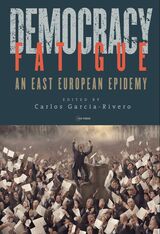 Democracy Fatigue: An East European Epidemy
Carlos García-Rivero
Central European University Press, 2023 Over the early 21st century, democracy worldwide has deteriorated significantly. At the same time, new populist forces have appeared that challenge democracies through legal reforms. The stark contrast between Eastern and Western Europe in this respect is the focus of this collection of essays. The authors consider the 2008-2012 economic crisis to be at the root of the success of the populist parties and the rise of cultural backlash against liberal values. In turn, European governments’ responses to the crisis—mainly austerity measures demanded by IMF and the EU— help explain desenchantment with the European Union. These policies made the wider public feel that they were being left out of politics, and populist parties promised to return power to them. The contributors argue that polarization of the electorate can set in motion a radicalization that strengthens authoritarians at the expense of democrats. They also demonstrate that Eastern and Western Europe differ in their attitudes to the decline in quality of democracy. The studies consider how satisfied people are with the political changes they witness, and argue that seemingly more authoritarian attitudes in the East explain why people feel more satisfied with a defective democracy that empowers the populist-authoritarian political actors that they support.
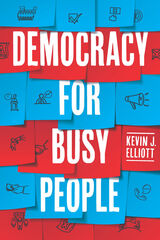 Democracy for Busy People
Kevin J. Elliott
University of Chicago Press, 2023 Advances an alternative approach to democratic reform that focuses on building institutions that empower people who have little time for politics.
How do we make democracy more equal? Although in theory, all citizens in a democracy have the right to participate in politics, time-consuming forms of participation often advantage some groups over others. Where some citizens may have time to wait in long lines to vote, to volunteer for a campaign, to attend community board meetings, or to stay up to date on national, state, and local news, other citizens struggle to do the same. Since not all people have the time or inclination to devote substantial energy to politics, certain forms of participation exacerbate existing inequalities.
Democracy for Busy People takes up the very real challenge of how to build a democracy that empowers people with limited time for politics. While many plans for democratic renewal emphasize demanding forms of political participation and daunting ideals of democratic citizenship, political theorist Kevin J. Elliott proposes a fundamentally different approach. He focuses instead on making democratic citizenship undemanding so that even busy people can be politically included. This approach emphasizes the core institutions of electoral democracy, such as political parties, against deliberative reforms and sortition. Timely and action-focused, Democracy for Busy People is necessary reading.
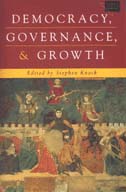 Democracy, Governance, and Growth
Stephen Knack, Editor
University of Michigan Press, 2003 For many decades, underdevelopment in much of the world was blamed variously on capital deficits, exploitation by rich nations, and market-distorting economic policies. The chapters in this volume provide much of the evidence underpinning a growing consensus among development and growth economists that successful economic development depends more fundamentally on the way societies are organized and governed. They argue that "good governance" is a prerequisite to sustained increases in living standards.
The difference between developmental success and failure in this view has little to do with natural resource availability, climate, aid, or developed nations' policies. Rather, it is largely a function of whether incentives within a given society steer wealth-maximizing individuals toward producing new wealth or toward diverting it from others. The chapters, seminal essays written by Mancur Olson and his IRIS Center colleagues, provide theoretical and/or empirical underpinnings for the emerging consensus that differences in the way governments and societies are organized have enormous implications for the structure of incentives faced by politicians, bureaucrats, investors, and workers, which in turn determines the level of a nation's material well-being.
Overall this volume applies tools and concepts from the "New Institutional Economics" to some of the major issues in economic development. It will be of interest to scholars and students of various disciplines--including political science, law, and sociology as well as economics--interested in the determinants of economic development and global economic change. The book will also be of interest to many aid practitioners, particularly those working in anticorruption and public sector reform issues.
Stephen Knack is Senior Research Economist, Development Research Group, the World Bank.
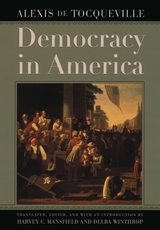 Democracy in America
Alexis de Tocqueville
University of Chicago Press, 2000 The most faithful and nuanced translation of the definitive work for understanding America
Alexis de Tocqueville (1805-59) came to America in 1831 to see what a great republic was like. What struck him most was the country's equality of conditions, its democracy. The book he wrote on his return to France, Democracy in America, is both the best ever written on democracy and the best ever written on America. It remains the most often quoted book about the United States, not only because it has something to interest and please everyone, but also because it has something to teach everyone. When it was published in 2000, Harvey Mansfield and Delba Winthrop's new translation of Democracy in America—only the third since the original two-volume work was published in 1835 and 1840—was lauded in all quarters as the finest and most definitive edition of Tocqueville's classic thus far. Mansfield and Winthrop have restored the nuances of Tocqueville's language, with the expressed goal "to convey Tocqueville's thought as he held it rather than to restate it in comparable terms of today." The result is a translation with minimal interpretation, but with impeccable annotations of unfamiliar references and a masterful introduction placing the work and its author in the broader contexts of political philosophy and statesmanship.
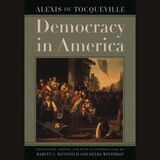 Democracy in America
Alexis de Tocqueville
University of Chicago Press, 2000 This is an auto-narrated audiobook edition of this book. Alexis de Tocqueville (1805-59) came to America in 1831 to see what a great republic was like. What struck him most was the country's equality of conditions, its democracy. The book he wrote on his return to France, Democracy in America, is both the best ever written on democracy and the best ever written on America. It remains the most often quoted book about the United States, not only because it has something to interest and please everyone, but also because it has something to teach everyone. When it was published in 2000, Harvey Mansfield and Delba Winthrop's new translation of Democracy in America—only the third since the original two-volume work was published in 1835 and 1840—was lauded in all quarters as the finest and most definitive edition of Tocqueville's classic thus far. Mansfield and Winthrop have restored the nuances of Tocqueville's language, with the expressed goal "to convey Tocqueville's thought as he held it rather than to restate it in comparable terms of today." The result is a translation with minimal interpretation, but with impeccable annotations of unfamiliar references and a masterful introduction placing the work and its author in the broader contexts of political philosophy and statesmanship.
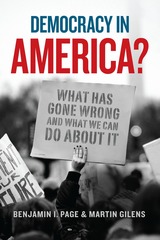 Democracy in America?: What Has Gone Wrong and What We Can Do About It
Benjamin I. Page and Martin Gilens
University of Chicago Press, 2017 America faces daunting problems—stagnant wages, high health care costs, neglected schools, deteriorating public services. Yet the government consistently ignores the needs of its citizens, paying attention instead to donors and organized interests. Real issues are held hostage to demagoguery, partisanship beats practicality, and trust in government withers along with the social safety net.
How did we get here? Through decades of dysfunctional government. In Democracy in America? veteran political observers Benjamin I. Page and Martin Gilens marshal an unprecedented array of evidence to show that while other countries have responded to a rapidly changing economy by helping people who’ve been left behind, the United States has failed to do so. Instead, we have actually exacerbated inequality, enriching corporations and the wealthy while leaving ordinary citizens to fend for themselves.
What’s the solution? More democracy. More opportunity for citizens to shape what their government does. To repair our democracy, Page and Gilens argue, we must change the way we choose candidates and conduct our elections, reform our governing institutions, and curb the power of money in politics. By doing so, we can reduce polarization and gridlock, address pressing challenges, and enact policies that truly reflect the interests of average Americans.
This book presents a damning indictment. But the situation is far from hopeless. With increased democratic participation as their guide, Page and Gilens lay out a set of proposals that would boost citizen participation, curb the power of money, and democratize the House and Senate. The only certainty is that inaction is not an option. Now is the time to act to restore and extend American democracy.
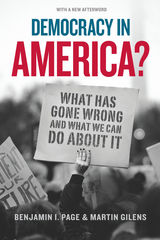 Democracy in America?: What Has Gone Wrong and What We Can Do About It
Benjamin I. Page and Martin Gilens
University of Chicago Press, 2020 America faces daunting problems—stagnant wages, high health care costs, neglected schools, deteriorating public services. How did we get here? Through decades of dysfunctional government. In Democracy in America? veteran political observers Benjamin I. Page and Martin Gilens marshal an unprecedented array of evidence to show that while other countries have responded to a rapidly changing economy by helping people who’ve been left behind, the United States has failed to do so. Instead, we have actually exacerbated inequality, enriching corporations and the wealthy while leaving ordinary citizens to fend for themselves.
What’s the solution? More democracy. More opportunities for citizens to shape what their government does. To repair our democracy, Page and Gilens argue, we must change the way we choose candidates and conduct our elections, reform our governing institutions, and curb the power of money in politics. By doing so, we can reduce polarization and gridlock, address pressing challenges, and enact policies that truly reflect the interests of average Americans.
Updated with new information, this book lays out a set of proposals that would boost citizen participation, curb the power of money, and democratize the House and Senate.
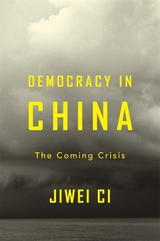 Democracy in China: The Coming Crisis
Jiwei Ci
Harvard University Press, 2019 A respected Chinese political philosopher calls for the Communist Party to take the lead in moving China along the path to democracy before it is too late.
With Xi Jinping potentially set as president for life, China’s move toward political democracy may appear stalled. But Jiwei Ci argues that four decades of reform have created a mentality in the Chinese people that is just waiting for the political system to catch up, resulting in a disjunction between popular expectations and political realities. The inherent tensions in a largely democratic society without a democratic political system will trigger an unprecedented crisis of legitimacy, forcing the Communist Party to act or die.
Two crises loom for the government. First is the waning of the Communist Party’s revolutionary legacy, which the party itself sees as a grave threat. Second is the fragility of the next leadership transition. No amount of economic success will compensate for the party’s legitimacy deficit when the time comes. The only effective response, Ci argues, will be an orderly transition to democracy. To that end, the Chinese government needs to start priming its citizens for democracy, preparing them for new civil rights and civic responsibilities. Embracing this pragmatic role offers the Communist Party a chance to survive. Its leaders therefore have good reason to initiate democratic change.
Sure to challenge the Communist Party and stir debate, Democracy in China brings an original and important voice to an issue with far-reaching consequences for China and the world.
 Democracy in Iran: Why It Failed and How It Might Succeed
Misagh Parsa
Harvard University Press, 2016 The Green Movement protests that erupted in Iran in 2009 amid allegations of election fraud shook the Islamic Republic to its core. For the first time in decades, the adoption of serious liberal reforms seemed possible. But the opportunity proved short-lived, leaving Iranian activists and intellectuals to debate whether any path to democracy remained open.
Offering a new framework for understanding democratization in developing countries governed by authoritarian regimes, Democracy in Iran is a penetrating, historically informed analysis of Iran’s current and future prospects for reform. Beginning with the Iranian Revolution of 1979, Misagh Parsa traces the evolution of Iran’s theocratic regime, examining the challenges the Islamic Republic has overcome as well as those that remain: inequalities in wealth and income, corruption and cronyism, and a “brain drain” of highly educated professionals eager to escape Iran’s repressive confines. The political fortunes of Iranian reformers seeking to address these problems have been uneven over a period that has seen hopes raised during a reformist administration, setbacks under Ahmadinejad, and the birth of the Green Movement. Although pro-democracy activists have made progress by fits and starts, they have few tangible reforms to show for their efforts.
In Parsa’s view, the outlook for Iranian democracy is stark. Gradual institutional reforms will not be sufficient for real change, nor can the government be reformed without fundamentally rethinking its commitment to the role of religion in politics and civic life. For Iran to democratize, the options are narrowing to a single path: another revolution.
Democracy In Japan
Takeshi Ishida
University of Pittsburgh Press, 1989
Following World War II, the American Occupation created Western style democratic institutions in Japan and sought to develop a society and culture that would support a democratic political system. Now, after four decades, the successes and failures of Japanese democracy can be assessed. How equal are Japan’s citizens? To what extent are their views represented in the legislature? How does Japan handle dissent and protest? How stable is its democracy?
In closely related and readable essays, thirteen leading experts consider three main components of democracy in Japan - political, social, and economic. The editors’ introduction provides historical background, making this book accessible and valuable for students, the general reader interested in Japan, as well as the specialist.
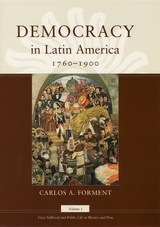 Democracy in Latin America, 1760-1900: Volume 1, Civic Selfhood and Public Life in Mexico and Peru
Carlos A. Forment
University of Chicago Press, 2003 Carlos Forment's aim in this highly ambitious work is to write the book that Tocqueville would have written had he traveled to Latin America instead of the United States. Drawing on an astonishing level of research, Forment pored over countless newspapers, partisan pamphlets, tabloids, journals, private letters, and travelogues to show in this study how citizens of Latin America established strong democratic traditions in their countries through the practice of democracy in their everyday lives.
This first volume of Democracy in Latin America considers the development of democratic life in Mexico and Peru from independence to the late 1890s. Forment traces the emergence of hundreds of political, economic, and civic associations run by citizens in both nations and shows how these organizations became models of and for democracy in the face of dictatorship and immense economic hardship. His is the first book to show the presence in Latin America of civic democracy, something that gave men and women in that region an alternative to market- and state-centered forms of life.
In looking beneath institutions of government to uncover local and civil organizations in public life, Forment ultimately uncovers a tradition of edification and inculcation that shaped democratic practices in Latin America profoundly. This tradition, he reveals, was stronger in Mexico than in Peru, but its basic outlines were similar in both nations and included a unique form of what Forment calls Civic Catholicism in order to distinguish itself from civic republicanism, the dominant political model throughout the rest of the Western world.
 Democracy in Latin America: Between Hope and Despair
Ignacio Walker
University of Notre Dame Press, 2013
In 2009, Ignacio Walker—scholar, politician, and one of Latin America’s leading public intellectuals—published La Democracia en America Latina. Now available in English, with a new prologue, and significantly revised and updated for an English-speaking audience, Democracy in Latin America: Between Hope and Despair contributes to the necessary and urgent task of exploring both the possibilities and difficulties of establishing a stable democracy in Latin America.
Walker argues that, throughout the past century, Latin American history has been marked by the search for responses or alternatives to the crisis of oligarchic rule and the struggle to replace the oligarchic order with a democratic one. After reviewing some of the principal theories of democracy based on an analysis of the interactions of political, economic, and social factors, Walker maintains that it is primarily the actors, institutions, and public policies—not structural determinants—that create progress or regression in Latin American democracy.
Democracy in Latin America is organized by eight themes: independence and the establishment of democracy; the economic shift from exports to import substitution; democratic breakdowns, transitions, and consolidation; the double transition to democracy and trade liberalization in the 1980s and 1990s; institutions, democratic governability, and neopopulism; presidentialism and parliamentarism; the "new social question"; and the need for democracy of institutions. Walker systematically addresses the abundant literature on democracy in Latin America, combining a scholarly perspective with real world experience that enhances the understanding of political and economic development in the region.
"Ignacio Walker's Democracy in Latin America: Between Hope and Despair draws in a critical fashion on the theories and concepts of social science to make an original argument about democracy in Latin America. His is the most balanced and comprehensive treatment of the topic currently available." —Paul E. Sigmund, Princeton University
"This is a dialogue between politics and academia writes Walker in the very first line of his book. After reading it, I should add: a very fruitful dialogue, one politically passionate in its commitment to democracy and intellectually acute in its inquiry about the vicissitudes of representative government in Latin America. The dialogue revolves around a key question: Why Latin America still shows a marked ambiguity towards representative democracy? To answer this question, Walker examines critical economic and socialpolitical phenomena with two centuries of Latin American history in the backdrop. Being a well trained political scientist, a policy maker, and an active politician, a rare combination of attributes, Walker is not interested so much in the past as he is in the present and in the future. Democracy in Latin America: Between Hope and Despair is a book all people who recognize the importance of consolidating 'authentic representative democracies' in the region should read." —Fernando Henrique Cardoso, President of Brazil (1995–2002)
 Democracy in Mexico: Attitudes and Perceptions of Citizens at National and Local Level
Edited by Salvador Marti i Puig, Reynaldo Yunuen Ortega Ortiz, M. Fernanda Somuano Ventura, and Claire Wright
University of London Press, 2014 Democracy in Mexico. Attitudes and perceptions of citizens at national and local level, offers an important contribution to one of the more complex and multifaceted political processes of recent decades in Latin America: Mexico's democratisation at the national and subnational levels. The chapters - on topics including the quality of democracy, political participation and insecurity, amongst others - have been researched and written by a group of academics from the University of Salamanca and El Colegio de México, with the support of the Spanish Agency for International Cooperation and Development (AECID) and the Mexican Council of Science and Technology (CONACYT). Importantly, the volume is based on two surveys carried out throughout Mexico in 2009 and in 2011. The result of this period of collaboration is one of the few existing studies on democratic processes in the Mexican states, which we hope will provoke an important debate within the academic community.
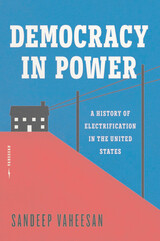 Democracy in Power: A History of Electrification in the United States
Sandeep Vaheesan
University of Chicago Press, 2024 Private money, public good, and the original fight for control of America’s energy industry. Until the 1930s, financial interests dominated electrical power in the United States. That changed with President Franklin D. Roosevelt’s New Deal which restructured the industry. The government expanded public ownership, famously through the Tennessee Valley Authority, and promoted a new kind of utility: the rural electric cooperative that brought light and power to millions in the countryside. Since then, public and cooperative utilities have persisted as an alternative to shareholder control. Democracy in Power traces the rise of publicly governed utilities in the twentieth-century electrification of America. Sandeep Vaheesan shows that the path to accountability in America’s power sector was beset by bureaucratic challenges and fierce private resistance. Through a detailed and critical examination of this evolution, Vaheesan offers a blueprint for a publicly led and managed path to decarbonization. Democracy in Power is at once an essential history, a deeply relevant accounting of successes and failures, and a guide on how to avoid repeating past mistakes.
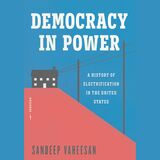 Democracy in Power: A History of Electrification in the United States
Sandeep Vaheesan
University of Chicago Press, 2024 This is an auto-narrated audiobook version of this book.
Private money, public good, and the original fight for control of America’s energy industry. Until the 1930s, financial interests dominated electrical power in the United States. That changed with President Franklin D. Roosevelt’s New Deal which restructured the industry. The government expanded public ownership, famously through the Tennessee Valley Authority, and promoted a new kind of utility: the rural electric cooperative that brought light and power to millions in the countryside. Since then, public and cooperative utilities have persisted as an alternative to shareholder control. Democracy in Power traces the rise of publicly governed utilities in the twentieth-century electrification of America. Sandeep Vaheesan shows that the path to accountability in America’s power sector was beset by bureaucratic challenges and fierce private resistance. Through a detailed and critical examination of this evolution, Vaheesan offers a blueprint for a publicly led and managed path to decarbonization. Democracy in Power is at once an essential history, a deeply relevant accounting of successes and failures, and a guide on how to avoid repeating past mistakes.
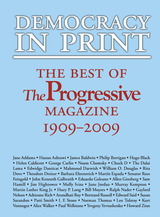 Democracy in Print: The Best of The Progressive Magazine, 1909–2009
Edited by Matthew Rothschild
University of Wisconsin Press, 2009 Democracy in Print captures many of the most influential voices from a century of United States history who have spoken out on the struggle to make real the promise of democracy for all Americans, railed against abuses of corporate power, renounced American empire, championed environmental causes, opposed war, and waged peace. It chronicles voices of the women’s rights movement, the civil rights movement, the labor movement, and the gay rights movement. And on every page, it declares the importance of an independent media, by culling the best of The Progressive magazine over the last one hundred years.
Readers will discover the vision of the magazine’s founder, Robert “Fighting Bob” La Follette, and his suffragist wife, Belle Case La Follette. They’ll find historic gems from the likes of Jane Addams, Carl Sandburg, Huey Long, and John Kenneth Galbraith, and profound essays by Theodore Dreiser, Barbara Ehrenreich, Noam Chomsky, Upton Sinclair, Arundhati Roy, James Baldwin, Edwidge Danticat, and Edward Said. The collection is leavened with humor from Kate Clinton, Will Durst, Michael Feldman, and Molly Ivins, and graced by poems from such writers as Mahmoud Darwish, Rita Dove, Martín Espada, Maxine Kumin, Adrienne Rich, and Sandra Cisneros. Fascinating interviews bring readers into conversations with prominent cultural figures, including Chuck D, the Dalai Lama, Allen Ginsberg, Amy Goodman, Harold Pinter, Patti Smith, Susan Sarandon, and Yevgeny Yevtushenko.
Eminently browsable, this book is for anyone concerned with American democracy, the global community, and the perils of the planet. With contributions by actors and Supreme Court justices, comedians and Nobel Prize-winners, Democracy in Print offers all readers nourishing food for thought.
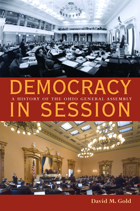 Democracy in Session: A History of the Ohio General Assembly
David M. Gold
Ohio University Press, 2009 For more than 200 years no institution has been more important to the development of the American democratic polity than the state legislature, yet no political institution has been so neglected by historians. Although more lawmaking takes place in the state capitals than in Washington D.C., scholars have lavished their attention on Congress, producing only a handful of histories of state legislatures. Most of those histories have focused on discrete legislative acts rather than on legislative process, and all have slighted key aspects of the legislative environment: the parliamentary rules of play, the employees who make the game possible, the physical setting—the arena—in which the people’s representatives engage in conflict and compromise to create public policy. This book relates in fascinating detail the history of the Ohio General Assembly from its eighteenth-century origins in the Northwest Territory to its twenty-first-century incarnation as a full-time professional legislature. Democracy in Session explains the constitutional context within which the General Assembly functions, examines the evolution of legislative committees, and explores the impact of technology on political contests and legislative procedure. It sheds new light on the operations of the House and Senate clerks’ offices and on such legislative rituals as seat selection, opening prayers, and the Pledge of Allegiance. Partisan issues and public policy receive their due, but so do ethics and decorum, the election of African American and female legislators, the statehouse, and the social life of the members. Democracy in Session is, in short, the most comprehensive history of a state legislature written to date and an important contribution to the story of American democracy.
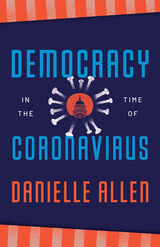 Democracy in the Time of Coronavirus
Danielle Allen
University of Chicago Press, 2022 From a leading political thinker, this book is both an invaluable playbook for meeting our current moment and a stirring reflection on the future of democracy itself.
The COVID-19 pandemic has demonstrated some of the strengths of our society, including the rapid development of vaccines. But the pandemic has also exposed its glaring weaknesses, such as the failure of our government to develop and quickly implement strategies for tracing and containing outbreaks as well as widespread public distrust of government prompted by often confusing and conflicting choices—to mask, or not to mask. Even worse is that over half a million deaths and the extensive economic devastation could have been avoided if the government had been prepared to undertake comprehensive, contextually-sensitive policies to stop the spread of the disease.
In Democracy in the Time of Coronavirus, leading political thinker Danielle Allen untangles the US government’s COVID-19 victories and failures to offer a plan for creating a more resilient democratic polity—one that can better respond to both the present pandemic and future crises. Looking to history, Allen also identifies the challenges faced by democracies in other times that required strong government action. In an analysis spanning from ancient Greece to the Reconstruction Amendments and the present day, Allen argues for the relative effectiveness of collaborative federalism over authoritarian compulsion and for the unifying power of a common cause. But for democracy to endure, we—as participatory citizens—must commit to that cause: a just and equal social contract and support for good governance.
 Democracy, Inc.: The Press and Law in the Corporate Rationalization of the Public Sphere
David S. Allen
University of Illinois Press, 2005 In Democracy, Inc., David S. Allen exposes the vested interests behind the U.S. slide toward conflating corporate values with public and democratic values. He argues that rather than being institutional protectors of democratic principles, the press and law perversely contribute to the destruction of public discourse in the United States today.
Allen utilizes historical, philosophical, sociological, and legal sources to trace America's gradual embrace of corporate values. He argues that such values, including winning, efficiency, and profitability actually limit democratic involvement by devaluing discursive principles, creating an informed yet inactive public. Through an examination of professionalization in both the press and the law, corporate free speech rights, and free speech as property, Democracy, Inc. demonstrates that today's democracy is more about trying to control and manage citizens than giving them the freedom to participate. Allen not only calls on institutions to reform the way they understand and promote citizenship but also asks citizens to adopt a new ethic of public discourse that values understanding rather than winning.
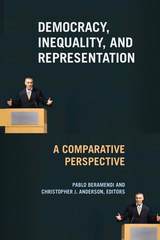 Democracy, Inequality, and Representation in Comparative Perspective
Pablo Beramendi
Russell Sage Foundation, 2008 The gap between the richest and poorest Americans has grown steadily over the last thirty years, and economic inequality is on the rise in many other industrialized democracies as well. But the magnitude and pace of the increase differs dramatically across nations. A country's political system and its institutions play a critical role in determining levels of inequality in a society. Democracy, Inequality, and Representation argues that the reverse is also true—inequality itself shapes political systems and institutions in powerful and often overlooked ways. In Democracy, Inequality, and Representation, distinguished political scientists and economists use a set of international databases to examine the political causes and consequences of income inequality. The volume opens with an examination of how differing systems of political representation contribute to cross-national variations in levels of inequality. Torben Iverson and David Soskice calculate that taxes and income transfers help reduce the poverty rate in Sweden by over 80 percent, while the comparable figure for the United States is only 13 percent. Noting that traditional economic models fail to account for this striking discrepancy, the authors show how variations in electoral systems lead to very different outcomes. But political causes of disparity are only one part of the equation. The contributors also examine how inequality shapes the democratic process. Pablo Beramendi and Christopher Anderson show how disparity mutes political voices: at the individual level, citizens with the lowest incomes are the least likely to vote, while high levels of inequality in a society result in diminished electoral participation overall. Thomas Cusack, Iverson, and Philipp Rehm demonstrate that uncertainty in the economy changes voters' attitudes; the mere risk of losing one's job generates increased popular demand for income support policies almost as much as actual unemployment does. Ronald Rogowski and Duncan McRae illustrate how changes in levels of inequality can drive reforms in political institutions themselves. Increased demand for female labor participation during World War II led to greater equality between men and women, which in turn encouraged many European countries to extend voting rights to women for the first time. The contributors to this important new volume skillfully disentangle a series of complex relationships between economics and politics to show how inequality both shapes and is shaped by policy. Democracy, Inequality, and Representation provides deeply nuanced insight into why some democracies are able to curtail inequality—while others continue to witness a division that grows ever deeper.
Democracy Is in the Streets: From Port Huron to the Siege of Chicago, With a New Preface by the Author
James Miller
Harvard University Press, 1994 On June 12, 1962, sixty young student activists drafted a manifesto for their generation—The Port Huron Statement—that ignited a decade of dissent. Democracy Is in the Streets is the definitive history of the major people and ideas that shaped the New Left in America during that turbulent decade. Because the 1960s generation is now moving into positions of power in politics, education, the media, and business, their early history is crucial to our understanding. James Miller, in his new Preface, puts the 1960s and them into a context for our time, claiming that something of value did happen: “Most of the large questions raised by that moment of chaotic openness—political questions about the limits of freedom, and cultural questions, too, about the authority of the past and the anarchy of the new—are with us still.”
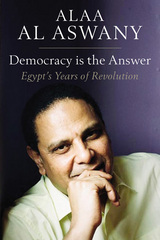 Democracy is the Answer: Egypt's Years of Revolution
Alaa Al Aswany
Gingko, 2014 As the Egyptian revolution unfolded throughout 2011 and the ensuing years, no one was better positioned to comment on it—and try to push it in productive directions—than best-selling novelist and political commentator Alaa Al-Aswany. For years a leading critic of the Mubarak regime, Al-Aswany used his weekly newspaper column for Al-Masry Al-Youm to propound the revolution’s ideals and to confront the increasingly troubled politics of its aftermath.
This book presents, for the first time in English, all of Al-Aswany’s columns from the period, a comprehensive account of the turmoil of the post-revolutionary years, and a portrait of a country and a people in flux. Each column is presented along with a context-setting introduction, as well as notes and a glossary, all designed to give non-Egyptian readers the background they need to understand the events and figures that Al-Aswany chronicles. The result is a definitive portrait of Egypt today—how it got here, and where it might be headed.
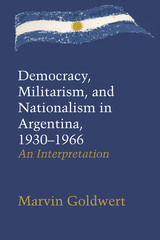 Democracy, Militarism, and Nationalism in Argentina, 1930–1966: An Interpretation
By Marvin Goldwert
University of Texas Press, 1972 Until 1930, Argentina was one of the great hopes for stable democracy in Latin America. Argentines themselves believed in the destiny of their nation to become the leading Latin American country in wealth, power, and culture. But the revolution of 1930 unleashed the scourges of modern militarism and chronic instability in the land. Between 1930 and 1966, the Argentine armed forces, or factions of the armed forces, overthrew the government five times. For several decades, militarism was the central problem in Argentine political life. In this study, Marvin Goldwert interprets the rise, growth, and development of militarism in Argentina from 1930 to 1966. The tortuous course of Argentine militarism is explained through an integrating hypothesis. The army is viewed as a “power factor,” torn by a permanent dichotomy of values, which rendered it incapable of bringing modernization to Argentina. Caught between conflicting drives for social order and modernization, the army was an ambivalent force for change. First frustrated by incompetent politicians (1916–1943), the army was later driven by Colonel Juan D. Perón into an uneasy alliance with labor (1943–1955). Peronism initially represented the means by which army officers could have their cake—nationalistic modernization—and still eat it in peace, with the masses organized in captive unions tied to an authoritarian state. After 1955, when Perón was overthrown, a deeply divided army struggled to contain the remnants of its own dictatorial creation. In 1966, the army, dedicated to staunch anti-Peronism, again seized the state and revived the dream of reconciling social order and modernization through military rule. Although militarism has been a central problem in Argentine political life, it is also the fever that suggests deeper maladies in the body politic. Marvin Goldwert seeks to relate developments in the military to the larger political, social, and economic developments in Argentine history. The army and its factions are viewed as integral parts of the whole political spectrum during the period under study.
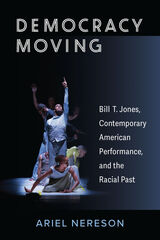 Democracy Moving: Bill T. Jones, Contemporary American Performance, and the Racial Past
Ariel Nereson
University of Michigan Press, 2022 On the 200th anniversary of Abraham Lincoln’s birth, renowned choreographer and director Bill T. Jones developed three tributes: Serenade/The Proposition, 100 Migrations, and Fondly Do We Hope . . . Fervently Do We Pray. These widely acclaimed dance works incorporated video and audio text from Lincoln’s writings as they examined key moments in his life and his enduring legacy. Democracy Moving explores how these works provided both an occasion and a method by which democracy and history might be reconceived through movement, positioning dance as a form of both history and historiography.
The project addresses how different communities choose to commemorate historical figures, events, and places through art—whether performance, oratory, song, statuary, or portraiture—and in particular, Black US American counter-memorial practices that address histories of slavery. Advancing the theory of oscillation as Black aesthetic praxis, author Ariel Nereson celebrates Bill T. Jones as a public intellectual whose practice has contributed to the project of understanding America’s relationship to its troubled past. The book features materials from Bill T. Jones/Arnie Zane Company’s largely unexplored archive, interviews with artists, and photos that document this critical stage of Jones’s career as it explores how aesthetics, as ideas in action, can imagine more just and equitable social formations.
Democracy Needs Dispute: The Debate on the European Constitution
Edited by Cornelia Brüll, Monika Mokre, and Markus Pausch
Campus Verlag, 2009
In 2005 hopes for closer European integration were dealt a potentially fatal blow when French and Dutch voters rejected the proposed new European Union constitution. Going beyond the instant analysis of journalists, which placed blame for the failed vote on the two nations’ internal politics, Democracy Needs Dispute examines a collection of media accounts of European policy debates to argue that the problem with the EU is its relative lack of vibrant political conflict. Democracy Needs Dispute offers both up-to-date analysis and a rich theoretical understanding of the problems facing further efforts at European integration.
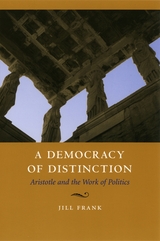 A Democracy of Distinction: Aristotle and the Work of Politics
Jill Frank
University of Chicago Press, 2004 Offering an ancient education for our times, Jill Frank's A Democracy of Distinction interprets Aristotle's writings in a way that reimagines the foundations, aims, and practices of politics, ancient and modern. Concerned especially with the work of making a democracy of distinction, Frank shows that such a democracy requires freedom and equality achieved through the exercise of virtue.
Moving back and forth between Aristotle's writings and contemporary legal and political theory, Frank breathes new life into our conceptions of property, justice, and law by viewing them not only as institutions but as dynamic activities as well. Frank's innovative approach to Aristotle stresses his appreciation of the tensions and complexities of politics so that we might rethink and reorganize our own political ideas and practices. A Democracy of Distinction will be of enormous value to classicists, political scientists, and anyone interested in revitalizing democratic theory and practice.
 The Democracy of Objects
Levi R. Bryant
Michigan Publishing, 2011 Since Kant, philosophy has been obsessed with epistemological questions pertaining to the relationship between mind and world and human access to objects. In The Democracy of Objects Bryant proposes that we break with this tradition and once again initiate the project of ontology as first philosophy. Drawing on the object-oriented ontology of Graham Harman, as well as the thought Roy Bhaskar, Gilles Deleuze, Niklas Luhman, Aristotle, Jacques Lacan, Bruno Latour and the developmental systems theorists, Bryant develops a realist ontology that he calls “onticology”. This ontology argues that being is composed entirely of objects, properties, and relations such that subjects themselves are a variant of objects. By way of systems theory and cybernetics, Bryant argues that objects are dynamic systems that relate to the world under conditions of operational closure. In this way, he integrates the most vital discoveries of the anti-realists within a realist ontology that does justice to both the material and cultural. Onticology proposes a flat ontology where objects of all sorts and at different scales equally exist without being reducible to other objects and where there are no transcendent entities such as eternal essences outside of dynamic interactions among objects. This work will be of great interest to Continental philosophers, ecologists, cultural theorists, media theorists, and those following recent developments in the thought of speculative realists.
 Democracy on Purpose: Justice and the Reality of God
Franklin I. Gamwell
Georgetown University Press Western moral and political theory in the last two centuries has widely held that morality and politics are independent of a divine reality. Claiming that this consensus is flawed, prominent theologian Franklin I. Gamwell argues that there is a necessary relation between moral worth and belief in God. Without appealing to the beliefs of any specific religion, Gamwell defends a return to the view that moral and political principles depend on a divine purpose. To separate politics from the divine misrepresents the distinctive character of human freedom, Gamwell maintains, and thus prevents a full understanding of the nature of justice. Principles of justice define "democracy on purpose" as the political form in which we pursue the divine good. Engaging in a dialogue with such major representatives of the dominant consensus as Kant, Habermas, and Rawls, and informed by the philosophical writings of Alfred North Whitehead, this book makes the case for a neoclassical metaphysics that restores a religious sensibility to our political life.
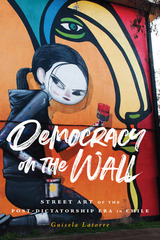 Democracy on the Wall: Street Art of the Post-Dictatorship Era in Chile
Guisela Latorre
Ohio State University Press, 2019 Guisela Latorre’s Democracy on the Wall: Street Art of the Post-Dictatorship Era in Chile documents and critically deconstructs the explosion of street art that emerged in Chile after the dictatorship of Augusto Pinochet, providing the first broad analysis of the visual vocabulary of Chile’s murals and graffiti while addressing the historical, social, and political context for this public art in Chile post-1990.
Exploring the resurgence and impact of the muralist brigades, women graffiti artists, the phenomenon of “open-sky museums,” and the transnational impact on the development of Chilean street art, Latorre argues that mural and graffiti artists are enacting a “visual democracy,” a form of artistic praxis that seeks to create alternative images to those produced by institutions of power. Keenly aware of Latin America’s colonial legacy and deeply flawed democratic processes, and distrustful of hegemonic discourses promoted by government and corporate media, the artists in Democracy on the Wall utilize graffiti and muralism as an alternative means of public communication, one that does not serve capitalist or nationalist interests. Latorre posits that through these urban interventions that combine creativity with social action, Chilean street artists formulate visions of what a true democracy looks like.
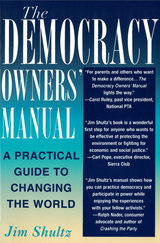 The Democracy Owners' Manual: A Practical Guide to Changing the World
Shultz, Jim
Rutgers University Press, 2002 For citizens seeking to take an active role in the affairs of their community—whether improving local schools, forcing clean-up of a polluted river, or weighing in on the debate over economic globalization — the challenge of activism can be daunting. Civic activists need to understand both the issues involved and how to take effective public action, often against enormous odds. The Democracy Owners’ Manual is a unique, hands-on guide for people who want to change public policy at the local, state, or national level. A combination of policy and advocacy basics, the book offers a clear presentation of the issues and debates activists are likely to encounter as well as a lucid, example-rich guide to effective strategies and actions.
Newcomers to advocacy work will find Jim Shultz’s book an invaluable treasure chest of ideas and stimulating stories to help them tackle the issues they care about. Veterans of public advocacy and activism will find the book to be a valuable source for fresh ideas and an indispensable tool for teaching and training others in the art of social activism. The book also uniquely lends itself for university courses in political science, public administration, social work, public health, environmental studies, and other disciplines that touch on public policy and political change.
 Democracy Vouchers and the Promise of Fairer Elections in Seattle
Jennifer A. Heerwig and Brian J. McCabe
Temple University Press, 2024 In 2017, Seattle inaugurated a new way for citizens to be involved in democracy: they introduced publicly financed vouchers for voters to donate to local candidates. The innovative plan is designed to level the playing field in campaign financing. Through the vouchers, residents allocate dollars to candidates of their choice in local elections, putting political money directly in the hands of voters. The intent is to increase political participation and ameliorate the long-standing representational inequalities of private donations.
Democracy Vouchers and the Promise of Fairer Elections in Seattle critically evaluates the success and impact of this program. Jennifer Heerwig and Brian J. McCabe emphasize how local elections now attract a much wider and more diverse field of both donors and candidates. They also consider external threats to the program, from litigation about the constitutionality of a voucher program to the rise of independent expenditures.
Offering important lessons on how other cities can adopt a similar program, this compelling case study also highlights the obstacles that will likely arise in its implementation.
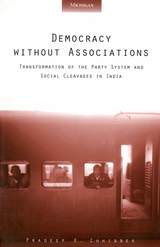 Democracy without Associations: Transformation of the Party System and Social Cleavages in India
Pradeep K. Chhibber
University of Michigan Press, 2001 India's party system has undergone a profound transformation over the last decade. The Congress Party, a catch-all party that brought independence in 1947 and governed India for much of the period since then, no longer dominates the electoral scene. Political parties which draw support from particular caste and religious groups are now more powerful than ever before. Democracy Without Associations explains why religious and caste-based political parties come to dominate the electoral landscape in 1990s India and why catch-all parties have declined. Arguing that political parties and state policy can make some social divisions more salient than others and also determine how these divisions affect the political system, the author offers an explanation for the relationship between electoral competition and the politicization of social differences in India. He notes that the relationship between social cleavages and the party system is not axiomatic and that political parties can influence the links they have to social cleavages. The argument developed for India is also used to account for emergence of class-based parties in Spain and the electoral success of a religious party in Algeria.
Democracy Without Associations will interest scholars and students of Indian politics, and party politics, as well as those interested in the impact of social divisions on the political system.
Pradeep K. Chhibber is Assistant Professor of Political Science and Associate Director, Center for South and Southeast Asian Studies, University of Michigan.
Democracy Without Equity: Failures of Reform in Brazil
Kurt Weyland
University of Pittsburgh Press, 1996 In Democracy without Equity, Weyland investigates the crucial political issue for many Latin American countries: the possibility for redistributing wealth and power through the democratic process. He focuses on Brazil’s redistributive initiatives in tax policy, social security, and health care. Weyland’s work is based on some 260 interviews with interest group representatives, politicians, and bureaucrats, the publications of interest groups, speeches of policy makers, newspaper accounts, legislative bills, congressional committee reports, and more. He concludes that, in countries whose society and political parties are fragmented, the prospects for effective redistributive policies are poor.
Democracy without Nations?: The Fate of Self-Government in Europe
Pierre Manent
Intercollegiate Studies Institute, 2007
Can Europe survive after abandoning the national loyalties—and religious traditions—that provided meaning? And what will happen to the United States as it goes down a similar path?
The eminent French political philosopher Pierre Manent addresses these questions in his brilliant meditation on Europe’s experiment in maximizing individual and social rights. By seeking to escape from the “national form,” he shows, the European Union has weakened the very institutions that made possible liberty and self-government in the first place. Worse still, the “spiritual vacuity” that characterizes today’s secular Europe—and, increasingly, the United States—is ultimately untenable.
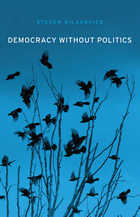 Democracy without Politics
Steven Bilakovics
Harvard University Press, 2012 In Western democracies today, politics and politicians are held in contempt by the majority of citizens. Steven Bilakovics argues that this disdain of politics follows neither from the discontents of our liberal political system nor from the preoccupations of a consumer society. Rather, extending Tocqueville’s analysis of the modern democratic way of life, he traces the sources of political cynicism to democracy itself.
Democratic society’s defining openness—its promise of transcendent freedom and unlimited power—renders the everyday politics of argument and persuasion absurd by comparison. Persuasion is devalued relative to the norms of free-market competition and patriotic community, assertions of self-interest and self-expression take the place of arguing together, and political life is diminished by the absence of mediating talk. Bilakovics identifies this trend across the political landscape—in the clashing authenticities of the "culture war," the perennial pursuit of the political outsider to set things right again, the call for a postpartisan politics, rising demands on government alongside falling expectations of what government can do, and in a political rhetoric that is at once petty and hyperbolic. To reform democratic politics and ameliorate its pathologies, Bilakovics calls on us to overcome our anti-political prejudice and rethink robust democracy as the citizen's practice of persuading and being persuaded in turn.
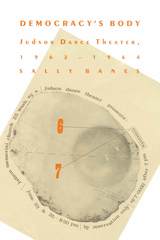 Democracy's Body: Judson Dance Theatre, 1962–1964
Sally Banes
Duke University Press, 1993 Democracy's Body offers a lively, detailed account of the beginnings of the Judson Dance Theater--a popular center of dance experimentation in New York's Greenwich Village--and its place in the larger history of the avant-garde art scene of the 1960s. JDT started when Robert Dunn, a student of John Cage, offered a dance composition class in Merce Cunningham's studio. The performers--many of whom included some of the most prominent figures in the arts in the early sisties--found a welcome performance home in the Judson Memorial Church in the Village. Sally Banes's account draws on interviews, letters, diaries, films, and reconstructions of dances to paint a portrait of the rich culture of Judson, which was the seedbed for postmodern dance and the first avant-garde movement in dance theater since the modern dance of the 1930s and 1940s. Originally published in 1983, this edition brings back into print a highly regarded work of dance history.
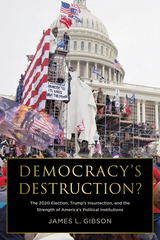 Democracy’s Destruction? Changing Perceptions of the Supreme Court, the Presidency, and the Senate after the 2020 Election: Changing Perceptions of the Supreme Court, the Presidency, and the Senate after the 2020 Election
James L. Gibson
Russell Sage Foundation, 2024 On January 6, 2021, an angry mob stormed the U.S. Capitol in an attempt to overturn the results of the 2020 presidential election. This assault on America’s democratic system was orchestrated by then President Donald Trump, abetted by his political party, and supported by a vocal minority of the American people. Did denial of the election results and the subsequent insurrection inflict damage on American political institutions? While most pundits and many scholars say yes, they have offered little rigorous evidence for this assertion. In Democracy’s Destruction? political scientist James L. Gibson uses surveys from representative samples of the American population to provide a more informed answer to the question.
Focusing on the U.S. Supreme Court, the presidency, and the U.S. Senate, Gibson reveals that how people assessed the election, the insurrection, and even the second Trump impeachment has little connection to their willingness to view American political institutions as legitimate. Instead, legitimacy is grounded in more general commitments to democratic values and support for the rule of law. On most issues of institutional legitimacy, those who denied the election results and supported the insurrection were not more likely to be alienated from political institutions and to consider them illegitimate.
Gibson also investigates whether Black people might have responded differently to the events of the 2020 election and its aftermath. He finds that in comparison to the White majority, Black Americans were less supportive of America’s democratic institutions and of democratic values, such as reverence for the rule of law, because they often have directly experienced unfair treatment by legal authorities. But he emphasizes that the actions of Trump and his followers are not the cause of those weaker commitments.
Democracy’s Destruction? offers rigorous analysis of the effect of the Trump insurrection on the state of U.S. democracy today. While cautioning that Trump and many Republicans may be devising schemes to subvert the next presidential election more effectively, the book attests to the remarkable endurance of American political institutions.
 Democracy’s Detectives: The Economics of Investigative Journalism
James T. Hamilton
Harvard University Press, 2016 Winner of the Goldsmith Book Prize, Shorenstein Center on Media, Politics and Public Policy at the Harvard Kennedy School of Government
Winner of the Tankard Book Award, Association for Education in Journalism and Mass Communication
Winner of the Frank Luther Mott–Kappa Tau Alpha Journalism & Mass Communication Research Award
In democratic societies, investigative journalism holds government and private institutions accountable to the public. From firings and resignations to changes in budgets and laws, the impact of this reporting can be significant—but so too are the costs. As newspapers confront shrinking subscriptions and advertising revenue, who is footing the bill for journalists to carry out their essential work? Democracy’s Detectives puts investigative journalism under a magnifying glass to clarify the challenges and opportunities facing news organizations today.
“Hamilton’s book presents a thoughtful and detailed case for the indispensability of investigative journalism—and just at the time when we needed it. Now more than ever, reporters can play an essential role as society’s watchdogs, working to expose corruption, greed, and injustice of the years to come. For this reason, Democracy’s Detectives should be taken as both a call to arms and a bracing reminder, for readers and journalists alike, of the importance of the profession.”
—Anya Schiffrin, The Nation
“A highly original look at exactly what the subtitle promises…Has this topic ever been more important than this year?”
—Tyler Cowen, Marginal Revolution
 Democracy’s Discontent: A New Edition for Our Perilous Times
Michael J. Sandel
Harvard University Press, 2022 A renowned political philosopher updates his classic book on the American political tradition to address the perils democracy confronts today.
The 1990s were a heady time. The Cold War had ended, and America’s version of liberal capitalism seemed triumphant. And yet, amid the peace and prosperity, anxieties about the project of self-government could be glimpsed beneath the surface.
So argued Michael Sandel, in his influential and widely debated book Democracy’s Discontent, published in 1996. The market faith was eroding the common life. A rising sense of disempowerment was likely to provoke backlash, he wrote, from those who would “shore up borders, harden the distinction between insiders and outsiders, and promise a politics to ‘take back our culture and take back our country,’ to ‘restore our sovereignty’ with a vengeance.”
In this new edition, Sandel updates his classic work for an age when democracy’s discontent has hardened into a country divided against itself. He extends his account of America’s civic struggles from the 1990s to the present. He shows how Democrats and Republicans alike embraced a version of finance-driven globalization that created a society of winners and losers and fueled the toxic politics of our time.
In a work celebrated when first published as “a remarkable fusion of philosophical and historical scholarship” (Alan Brinkley), Sandel recalls moments in the American past when the country found ways to hold economic power to democratic account. To reinvigorate democracy, Sandel argues in a stirring new epilogue, we need to reconfigure the economy and empower citizens as participants in a shared public life.
Democracy’s Discontent: America in Search of a Public Philosophy
Michael J. Sandel
Harvard University Press, 1996 The defect, Sandel maintains, lies in the impoverished vision of citizenship and community shared by Democrats and Republicans alike. American politics has lost its civic voice, leaving both liberals and conservatives unable to inspire the sense of community and civic engagement that self-government requires.
In search of a public philosophy adequate to our time, Sandel ranges across the American political experience, recalling the arguments of Jefferson and Hamilton, Lincoln and Douglas, Holmes and Brandeis, FDR and Reagan. He relates epic debates over slavery and industrial capitalism to contemporary controversies over the welfare state, religion, abortion, gay rights, and hate speech. Democracy's Discontent provides a new interpretation of the American political and constitutional tradition that offers hope of rejuvenating our civic life.
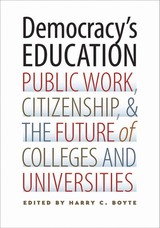 Democracy's Education: Public Work, Citizenship, and the Future of Colleges and Universities
Harry C. Boyte
Vanderbilt University Press, 2015 Today Americans feel powerless in the face of problems on every front. Such feelings are acute in higher education, where educators are experiencing an avalanche of changes: cost cutting, new technologies, and demands that higher education be narrowly geared to the needs of today's workplace. College graduates face mounting debt and uncertain job prospects, and worry about a coarsening of the mass culture and the erosion of authentic human relationships. Higher education is increasingly seen, and often portrays itself, as a ticket to individual success--a private good, not a public one.
Democracy's Education grows from the American Commonwealth Partnership, a year-long project to revitalize the democratic narrative of higher education that began with an invitation to Harry Boyte from the White House to put together a coalition aimed at strengthening higher education as a public good. The project was launched at the beginning of 2012 to mark the 150th anniversary of the Morrill Act, which created land grant colleges.
Beginning with an essay by Harry C. Boyte, "Reinventing Citizenship as Public Work," which challenges educators and their partners to claim their power to shape the story of higher education and the civic careers of students, the collection brings world-famous scholars, senior government officials, and university presidents together with faculty, students, staff, community organizers, and intellectuals from across the United States and South Africa and Japan. Contributors describe many constructive responses to change already taking place in different kinds of institutions, and present cutting-edge ideas like "civic science," "civic studies," "citizen professionalism," and "citizen alumni." Authors detail practical approaches to making change, from new faculty and student roles to changes in curriculum and student life and strategies for everyday citizen empowerment. Overall, the work develops a democratic story of education urgently needed to address today's challenges, from climate change to growing inequality.
 Democracy's Hidden Heroes: Fitting Policy to People and Place
David C. Campbell
Temple University Press, 2024 Democracy’s Hidden Heroes tells the story of the local public managers and nonprofit directors who work where bureaucratic hierarchies and community networks meet and often collide. These “hidden heroes” struggle to align universal rules and compliance demands with the unique circumstances facing their organizations and communities.
David Campbell recounts compelling stories of the workarounds, sidesteps, informal agreements, and grantor–grantee negotiations that help policy initiatives succeed as intended. The settings include schools, human services departments, workforce development agencies, and community-based organizations. He explains why it is difficult, though necessary, to translate locally attuned implementation dynamics into accountability metrics for distant funders.
Drawing on 2,000 interviews, Democracy’s Hidden Heroes is the culmination of decades spent talking to people who must reconcile bureaucratic and community cultures. Campbell’s grounded approach and balanced perspective bring fresh insights to the analysis of policy implementation, public management, and results accountability, while offering both cautionary advice and a hopeful prognosis.
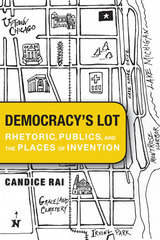 Democracy's Lot: Rhetoric, Publics, and the Places of Invention
Candice Rai
University of Alabama Press, 2016 Traces the communication strategies of various constituencies in a Chicago neighborhood, offering insights into the challenges that beset diverse urban populations and demonstrating persuasively rhetoric’s power to illuminate and resolve charged conflicts
Candice Rai’s Democracy’s Lot is an incisive exploration of the limitations and possibilities of democratic discourse for resolving conflicts in urban communities. Rai roots her study of democratic politics and publics in a range of urban case studies focused on public art, community policing, and urban development. These studies examine the issues that erupted within an ethnically and economically diverse Chicago neighborhood over conflicting visions for a vacant lot called Wilson Yard. Tracing how residents with disparate agendas organized factions and deployed language, symbols, and other rhetorical devices in the struggle over Wilson Yard’s redevelopment and other contested public spaces, Rai demonstrates that rhetoric is not solely a tool of elite communicators, but rather a framework for understanding the agile communication strategies that are improvised in the rough-and-tumble work of democratic life.
Wilson Yard, a lot eight blocks north of Wrigley Field in Chicago’s gentrifying Uptown neighborhood, is a diverse enclave of residents enlivened by recent immigrants from Guatemala, Mexico, Vietnam, Ethiopia, and elsewhere. The neighborhood’s North Broadway Street witnesses a daily multilingual hubbub of people from a wide spectrum of income levels, religions, sexual identifications, and interest groups. When a fire left the lot vacant, this divided community projected on Wilson Yard disparate and conflicting aspirations, the resolution of which not only determined the fate of this particular urban space, but also revealed the lot of democracy itself as a process of complex problem-solving. Rai’s detailed study of one block in an iconic American city brings into vivid focus the remarkable challenges that beset democratic urban populations anywhere on the globe—and how rhetoric supplies a framework to understand and resolve those challenges.
Based on exhaustive field work, Rai uses rhetorical ethnography to study competing publics, citizenship, and rhetoric in action, exploring “rhetorical invention,” the discovery or development by individuals of the resources or methods of engaging with and persuading others. She builds a case for democratic processes and behaviors based not on reflexive idealism but rather on the hard work and practice of democracy, which must address apathy, passion, conflict, and ambivalence.
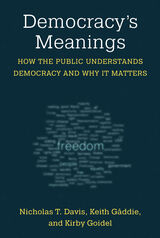 Democracy's Meanings: How the Public Understands Democracy and Why It Matters
Nicholas T. Davis, Keith Gåddie, and Kirby Goidel
University of Michigan Press, 2022 Democracy’s Meanings challenges conventional wisdom regarding how the public thinks about and evaluates democracy. Mining both political theory and more than 75 years of public opinion data, the book argues that Americans think about democracy in ways that go beyond voting or elected representation. Instead, citizens have rich and substantive views about the material conditions that democracy should produce, which draw from their beliefs about equality, fairness, and justice.
The authors construct a typology of views about democracy. Procedural views of democracy take a minimalistic quality. While voting and fair treatment are important to this vision of democracy, ideas about equality are mostly limited to civil liberties. In contrast, social views of democracy incorporate both civil and economic equality; according to people with these views, democracy ought to meet the basic social and material needs of citizens. Complementing these two groups are moderate and indifferent views about democracy. While moderate views sit somewhere in between procedural and social perspectives regarding the role of democracy in producing social and economic equality, indifferent views of democracy involve disaffection toward it. For a small group of apathetic citizens, democracy is an ambiguous and ill-defined concept.
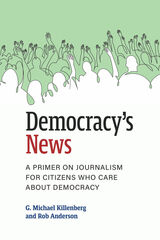 Democracy's News: A Primer on Journalism for Citizens Who Care about Democracy
G. Michael Killenberg and Rob Anderson
University of Michigan Press, 2023 Since the Founding, America’s faith in a democratic republic has depended on citizens who could be trusted to be communicators. Vigorous talk about equality, rights, and collaboration fueled the revolution, the Declaration of Independence, and the Constitution with its amendments. In a republic, the people set the terms for their lives not individually, but in community. The genius of keeping it alive exists in how everyday citizens talk and listen, write and read, for a common good. Dialogue and deliberation—rather than an accumulation of individual preferences—sustains a republic, yet a diminished and scarred institution of journalism jeopardizes citizens’ access to shared and truthful information. A disturbing “what’s in it for me?” attitude has taken over many citizens, and a creeping, autocratic sense of dismissive accusation too often characterizes the political style of elected officials. The basic fuel for democracy is the willingness of informed citizens to take each other seriously as they talk about political choices. Once we begin to clam up, build walls, and dismiss each other, we unravel the threads tying us to the Founders’ vision of a republic. A free press and free speech become meaningless if not supported by sustained listening to multiple positions. There are those who profit by dividing citizens into two camps: a comfortable “us” versus a scary “them.” They make their case with accusations and often with lies. They warp the very meaning of communication, hoping citizens never truly discover each other’s humanity. Democracy’s News discusses today’s problems of public communication in the context of history, law, and interpersonal life. News should not be something to dread, mistrust, or shun. Aided by reliable, factual journalism, citizens can develop a community-based knowledge to cope with social issues great and small. They come to treat neighbors and strangers as more than stereotypes or opponents. They become collaborators with whom to identify and sustain a working republic where news, citizenship, and public discourse merge.
 Democracy’s Prisoner: Eugene V. Debs, the Great War, and the Right to Dissent
Ernest Freeberg
Harvard University Press, 2010 In 1920, socialist leader Eugene V. Debs ran for president while serving a ten-year jail term for speaking against America’s role in World War I. Though many called Debs a traitor, others praised him as a prisoner of conscience, a martyr to the cause of free speech. Nearly a million Americans agreed, voting for a man whom the government had branded an enemy to his country.
In a beautifully crafted narrative, Ernest Freeberg shows that the campaign to send Debs from an Atlanta jailhouse to the White House was part of a wider national debate over the right to free speech in wartime. Debs was one of thousands of Americans arrested for speaking his mind during the war, while government censors were silencing dozens of newspapers and magazines. When peace was restored, however, a nationwide protest was unleashed against the government’s repression, demanding amnesty for Debs and his fellow political prisoners. Led by a coalition of the country’s most important intellectuals, writers, and labor leaders, this protest not only liberated Debs, but also launched the American Civil Liberties Union and changed the course of free speech in wartime.
The Debs case illuminates our own struggle to define the boundaries of permissible dissent as we continue to balance the right of free speech with the demands of national security. In this memorable story of democracy on trial, Freeberg excavates an extraordinary episode in the history of one of America’s most prized ideals.
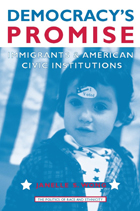 Democracy's Promise: Immigrants and American Civic Institutions
Janelle S. Wong
University of Michigan Press, 2006 Given the massive demographic changes in the United States during the past few decades, understanding the place of immigrants in the public sphere has never been more critical. Democracy's Promise examines both the challenges and opportunities posed to American civic institutions by the presence of increasing numbers of immigrants. Author Janelle Wong argues that the low levels of political participation among contemporary immigrants are not due to apathy or preoccupation with their homeland, but to the inability of American political parties and advocacy organizations to mobilize immigrant voters. Wong's rich study of Chinese and Mexican immigrants in New York and Los Angeles complements traditional studies of political behavior and civic institutions while offering a nuanced examination of immigrants' political activity. Democracy's Promise will appeal to a broad spectrum of social scientists and ethnic studies scholars who study or teach immigration, racial and ethnic politics, political participation, civic engagement, and American political institutions. In addition, it will appeal to community organizers and party activists who are interested in issues of race and ethnicity, immigration, political participation, and political mobilization. Janelle Wong is Assistant Professor of Political Science and American Studies and Ethnicity at the University of Southern California. "As political parties (perhaps) decline in the United States, as civic organizations (perhaps) move away from direct participatory politics, and as the number of immigrants certainly increases--what will link new Americans to the political realm? Janelle Wong answers this important question clearly, with elegance, nuance, rich description, and galvanizing provocativeness. Her evidence is compelling and her sense of urgency about the need for parties to look beyond short-term interests even more so." --Jennifer L. Hochschild, Harvard University "Wong draws on the Latino and Asian immigrant experience, with specific examples from the Chinese and Mexican communities of New York and Los Angeles, to show how the political parties have largely failed to organize these groups and why labor unions and immigrant advocacy organizations have stepped in to take their place. Far from 'disuniting' America, she clearly shows that bringing these groups into the political fray is central to the project of renewing American democracy." --John Mollenkopf, CUNY Graduate Center "A scathing critique of the role of parties in the mobilization of new immigrants and an invaluable analysis of alternative pathways of mobilization through community organizations." --Michael Jones-Correa, Cornell University "By employing multiple empirical methods, including in-depth interviews and sophisticated survey analyses, Janelle Wong provides a compelling account of the political activities and allegiances of America's Asian and Latino immigrants that challenges much conventional wisdom. Often the political parties are failing to reach out to these groups, and often immigrants remain concerned about their home countries; but they are nonetheless increasingly active in American politics, in ways that may do much to shape the course of American political development in the 21st century. Democracy's Promise is a major contribution to our understanding of this crucial dimension of American politics." --Rogers M. Smith, University of Pennsylvania " Democracy's Promise challenges political parties to reexamine their priorities for mobilizing new voters, and identifies the critical role civic institutions play in invigorating participation among immigrant citizens. Wong's analysis is at once precise and expansive; illuminating the contours of Latino and Asian American political incorporation and provoking thoughtful debate on inclusion in democratic theory." --Jane Junn, Rutgers University
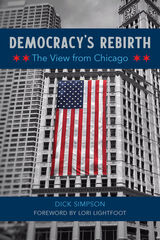 Democracy's Rebirth: The View from Chicago
Dick Simpson. Foreword by Lori Lightfoot
University of Illinois Press, 2022 Dick Simpson draws upon his fifty-year career as a legislator, campaign strategist, and government advisor to examine the challenges confronting Americans in their struggle to build the United States as a multiracial, multiethnic democracy. Using Chicago as an example, Simpson examines how the political, racial, economic, and social inequalities dividing the nation play out in our neighborhoods and cities. His investigation of our current crisis and its causes delves into issues like money in politics, low voter participation, the politics of resentment, political corruption, and a host of structural problems. But Democracy’s Rebirth goes beyond analysis. Simpson lays out a sober, practical manifesto meant to inspire people everywhere to educate themselves and do the hard work of creating the kind of strong institutions that will allow true democracy to flourish. With a foreword by Mayor Lori E. Lightfoot.
 Democracy’s Slaves: A Political History of Ancient Greece
Paulin Ismard
Harvard University Press, 2017 The ancient Greek statesman is a familiar figure in the Western political tradition. Less well known is the administrator who ran the state but who was himself a slave. Challenging the modern belief that democracy and bondage are incompatible, Paulin Ismard directs our attention to the cradle of Western democracy, ancient Athens, where the functioning of civic government depended crucially on highly skilled experts who were literally public servants—slaves owned by the city-state rather than by private citizens.
Known as dēmosioi, these public slaves filled a variety of important roles in Athenian society. They were court clerks, archivists, administrators, accountants, and policemen. Many possessed knowledge and skills beyond the attainments of average citizens, and they enjoyed privileges, such as the right to own property, that were denied to private slaves. In effect, dēmosioi were Western civilization’s first civil servants—though they carried out their duties in a condition of bound servitude.
Ismard detects a radical split between politics and administrative government at the heart of Athenian democracy. The city-state’s managerial caste freed citizens from the day-to-day responsibilities of running the state. By the same token, these public servants were unable to participate in the democratic process because they lacked the rights of full citizenship. By rendering the state’s administrators politically invisible, Athens warded off the specter of a government capable of turning against the citizens’ will. In a real sense, Ismard shows, Athenian citizens put the success of their democratic experiment in the hands of slaves.
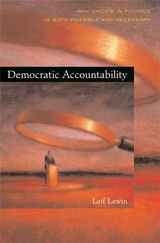 Democratic Accountability: Why Choice in Politics Is Both Possible and Necessary
Leif Lewin
Harvard University Press, 2007 It is common for political leaders to claim they have no control over bad outcomes. Indeed, they often cite the arguments of political theorists and public intellectuals as to why: history rushes onward oblivious of human will; force and violence overcome political aims; globalization undermines the actions of national leaders; the bureaucracy sabotages their intentions; bad outcomes are often the unintended result of actions.
In Democratic Accountability, Leif Lewin examines these reasons and argues that they are unconvincing. He makes his case by describing and analyzing counterexamples in seven cases, including the prevention of a communist takeover in Europe after World War II, the European Union's preventing another European war, and Margaret Thatcher's taming of the bureaucracy in Britain. In a staunch defense of the possibility for meaningful and profound democratic decision making, Lewin finds that, in fact, not only do political leaders exert a good measure of control and therefore can be assigned responsibility, but the meaning of the functioning democracy is that the people hold their leaders accountable.
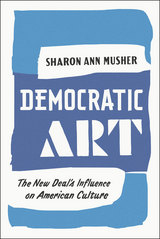 Democratic Art: The New Deal's Influence on American Culture
Sharon Ann Musher
University of Chicago Press, 2015 Throughout the Great Recession American artists and public art endowments have had to fight for government support to keep themselves afloat. It wasn’t always this way. At its height in 1935, the New Deal devoted $27 million—roughly $461 million today—to supporting tens of thousands of needy artists, who used that support to create more than 100,000 works. Why did the government become so involved with these artists, and why weren’t these projects considered a frivolous waste of funds, as surely many would be today?
In Democratic Art, Sharon Musher explores these questions and uses them as a springboard for an examination of the role art can and should play in contemporary society. Drawing on close readings of government-funded architecture, murals, plays, writing, and photographs, Democratic Art examines the New Deal’s diverse cultural initiatives and outlines five perspectives on art that were prominent at the time: art as grandeur, enrichment, weapon, experience, and subversion. Musher argues that those engaged in New Deal art were part of an explicitly cultural agenda that sought not just to create art but to democratize and Americanize it as well. By tracing a range of aesthetic visions that flourished during the 1930s, this highly original book outlines the successes, shortcomings, and lessons of the golden age of government funding for the arts.
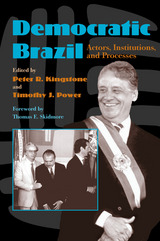 Democratic Brazil: Actors, Institutions, and Processes
Peter Kingstone
University of Pittsburgh Press, 2000
After 21 years of military rule, Brazil returned to democracy in 1985. Over the past decade and a half, Brazilians in the Nova República (New Republic) have struggled with a range of diverse challenges that have tested the durability and quality of the young democracy. How well have they succeeded? To what extent can we say that Brazilian democracy has consolidated? What actors, institutions, and processes have emerged as most salient over the past 15 years? Although Brazil is Latin America's largest country, the world's third largest democracy, and a country with a population and GNP larger than Yeltsin's Russia, more than a decade has passed since the last collaborative effort to examine regime change in Brazil, and no work in English has yet provided a comprehensive appraisal of Brazilian democracy in the period since 1985.
Democratic Brazil analyzes Brazilian democracy in a comprehensive, systematic fashion, covering the full period of the New Republic from Presidents Sarney to Cardoso. Democratic Brazil brings together twelve top scholars, the “next generation of Brazilianists,” with wide-ranging specialties including institutional analysis, state autonomy, federalism and decentralization, economic management and business-state relations, the military, the Catholic Church and the new religious pluralism, social movements, the left, regional integration, demographic change, and human rights and the rule of law. Each chapter focuses on a crucial process or actor in the New Republic, with emphasis on its relationship to democratic consolidation. The volume also contains a comprehensive bibliography on Brazilian politics and society since 1985. Prominent Brazilian historian Thomas Skidmore has contributed a foreword to the volume.
Democratic Brazil speaks to a wide audience, including Brazilianists, Latin Americanists generally, students of comparative democratization, as well as specialists within the various thematic subfields represented by the contributors. Written in a clear, accessible style, the book is ideally suited for use in upper-level undergraduate courses and graduate seminars on Latin American politics and development.
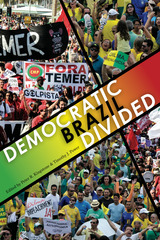 Democratic Brazil Divided
Peter Kingstone
University of Pittsburgh Press, 2017 March 2015 should have been a time of celebration for Brazil, as it marked thirty years of democracy, a newfound global prominence, over a decade of rising economic prosperity, and stable party politics under the rule of the widely admired PT (Workers’ Party). Instead, the country descended into protest, economic crisis, impeachment, and deep political division. Democratic Brazil Divided offers a comprehensive and nuanced portrayal of long-standing problems that contributed to the emergence of crisis and offers insights into the ways Brazilian democracy has performed well, despite the explosion of crisis. The volume, the third in a series from editors Kingstone and Power, brings together noted scholars to assess the state of Brazilian democracy through analysis of key processes and themes. These include party politics, corruption, the new ‘middle classes’, human rights, economic policy-making, the origins of protest, education and accountability, and social and environmental policy. Overall, the essays argue that democratic politics in Brazil form a complex mosaic where improvements stand alongside stagnation and regression.
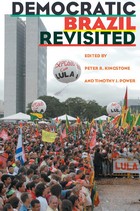 Democratic Brazil Revisited
Peter Kingstone
University of Pittsburgh Press, 2008 As the world's fifth-largest country, Brazil presents a compelling example of democracy in action. In this sequel to their landmark study Democratic Brazil, editors Peter Kingstone and Timothy Power have assembled a distinguished group of U.S.- and Brazilian-based scholars to assess the impact of competitive politics on Brazilian government, institutions, economics, and society.
The 2002 election of Lula da Silva and his Worker's Party promised a radical shift toward progressive reform, transparency, and accountability, opposing the earlier centrist and market-oriented policies of the Cardoso government. But despite the popular support reflected in his 2006 reelection, many observers claim that Lula and his party have fallen short of their platform promises. They have moved to the center in their policies, done little to change the elitist political culture of the past, and have engaged in “politics as usual” in executive-legislative relations, leading to allegations of corruption.
Under these conditions, democracy in Brazil remains an enigma. Progress in some areas is offset by stagnation and regression in others: while the country has seen renewed economic growth and significant progress in areas of health care and education, the gap between rich and poor remains vast. Rampant crime, racial inequality, and a pandemic lack of personal security taint the vision of progress. These dilemmas make Brazil a particularly striking case for those interested in Latin America and democratization in general.
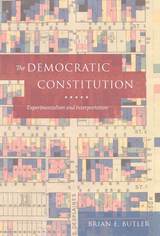 The Democratic Constitution: Experimentalism and Interpretation
Brian E. Butler
University of Chicago Press, 2017 The Supreme Court is seen today as the ultimate arbiter of the Constitution. Once the Court has spoken, it is the duty of the citizens and their elected officials to abide by its decisions. But the conception of the Supreme Court as the final interpreter of constitutional law took hold only relatively recently. Drawing on the pragmatic ideals characterized by Charles Sanders Peirce, John Dewey, Charles Sabel, and Richard Posner. Brian E. Butler shows how this conception is inherently problematic for a healthy democracy.
Butler offers an alternative democratic conception of constitutional law, “democratic experimentalism,” and applies it in a thorough reconstruction of Supreme Court cases across the centuries, such as Brown v. Board of Education, Citizens United v. Federal Election Commission, Lucas v. South Carolina Coastal Council, and Lochner v. New York. In contrast to the traditional tools and conceptions of legal analysis that see the law as a formally unique and separate type of practice, democratic experimentalism combines democratic aims and experimental practice. Butler also suggests other directions jurisprudential roles could take: for example, adjudication could be performed by primary stakeholders with better information. Ultimately, Butler argues persuasively for a move away from the current absolute centrality of courts toward a system of justice that emphasizes local rule and democratic choice.
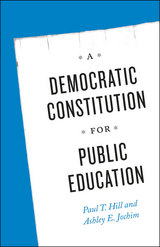 A Democratic Constitution for Public Education
Paul T. Hill and Ashley E. Jochim
University of Chicago Press, 2014 America’s education system faces a stark dilemma: it needs governmental oversight, rules and regulations, but it also needs to be adaptable enough to address student needs and the many different problems that can arise at any given school—something that large educational bureaucracies are notoriously bad at. Paul Hill and Ashley Jochim offer here a solution that is brilliant for its simplicity and distinctly American sensibility: our public education system needs a constitution. Adapting the tried-and-true framework of our forefathers to the specific governance of education, they show that the answer has been part of our political DNA all along.
Most reformers focus on who should control education, but Hill and Jochim show that who governs is less important than determining what powers they have. They propose a Civic Education Council—a democratic body subject to checks and balances that would define the boundaries of its purview as well as each school’s particular freedoms. They show how such a system would prevent regulations meant to satisfy special interests and shift the focus to the real task at hand: improving school performance. Laying out the implications of such a system for parents, students, teachers, unions, state and federal governments, and courts, they offer a vision of educational governance that stays true to—and draws on the strengths of—one of the greatest democratic tools we have ever created.
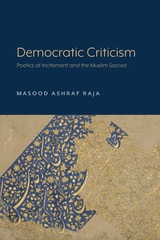 Democratic Criticism: Poetics of Incitement and the Muslim Sacred
Masood Raja
Lever Press, 2023 After the publication of Salman Rushdie’s The Satanic Verses (1988), the poetics of incitement— found in texts originating in the West containing themes and representations of Islam hurtful to Muslims—became an accepted method of textual production in the West. Production of such texts intensified after the attacks of 9/11. Democratic Criticism: Poetics of Incitement and the Muslim Sacred by Masood Ashraf Raja urges a new mode of reading, one that permits Western readers to transcend local reading practices in order to, as best as one can, read from the point of view of the Other. Raja argues that the lack of understanding of Muslim responses to the poetics of incitement in the West is the result of a lack of cross-cultural knowledge. He claims metropolitan universities often do not teach the proper social, historical, and religious context required for effectively reading these texts with any form of cultural knowledge. To remedy this, Raja offers and theorizes “democratic reading practices” and new ways for students to engage with texts. A genealogy of the Muslim Sacred is included, thereby giving readers the history and specific knowledge that constitutes an average Muslim reader of these texts, a subject who should be imagined and empathized with when those in the West read works of the poetics of incitement. Democratic Criticism encourages Western readers to develop a deeper understanding of the meaning-making processes of the Islamic world while at the same time encouraging the Muslim readers to read representations of the Islamic world with a more expansive understanding. It will be a helpful tool in creating reading practices that allow both teachers and students of literature to transcend their mode of reading as universal and to read from the perspective of the Other, and allow readers to engage meaningfully with these texts. Students and scholars of world literature, history, and religious studies will find this book insightful and valuable.
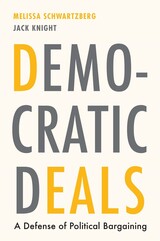 Democratic Deals: A Defense of Political Bargaining
Melissa Schwartzberg and Jack Knight
Harvard University Press, 2024 Two leading scholars of democracy make the case for political bargaining and define its proper limits.
Bargains—grand and prosaic—are a central fact of political life. The distribution of bargaining power affects the design of constitutions, the construction of party coalitions, legislative outcomes, judicial opinions, and much more. But can political bargaining be justified in theory? If it inevitably involves asymmetric power, is it anything more than the exercise of sublimated force, emerging from and reifying inequalities?
In Democratic Deals, Melissa Schwartzberg and Jack Knight defend bargaining against those who champion deliberation or compromise, showing that, under the right conditions and constraints, it can secure political equality and protect fundamental interests. The challenge, then, is to ensure that these conditions prevail. Drawing a sustained analogy to the private law of contracts—in particular, its concepts of duress and unconscionability—the authors articulate a set of procedural and substantive constraints on the bargaining process and analyze the circumstances under which unequal bargaining power might be justified in a democratic context. Institutions, Schwartzberg and Knight argue, can facilitate gains from exchange while placing meaningful limits on the exercise of unequal power.
Democratic Deals examines frameworks of just bargaining in a range of contexts—constitution-making and legislative politics, among judges and administrative agencies, across branches of government, and between the state and private actors in the course of plea deals. Bargaining is an ineradicable fact of political life. Schwartzberg and Knight show that it can also be essential for democracy.
 Democratic Dilemmas in the Age of Ecology: Trees and Toxics in the American West
Daniel Press
Duke University Press, 1994 Environmental problems present democratic dilemmas. The problems are so large and so often pit localities and interest groups against each other that they challenge basic democratic institutions, particularly the ideal of citizen participation in society’s choices. In this book, Daniel Press examines the conflict between environmental political thought and democratic theory and asks whether successful environmental protection is beyond the capabilities of democratic decisionmaking.
Press introduces the primary debate in this confrontation as a choice between political centralization and decentralization. Do citizens faced with environmental crises tend to look first to a centralized leadership for solutions or do they tend to respond at a more local and grassroots level? What is the role of technical expertise in this process and how does it effect public participation in these matters? Do confrontations over environmental issues increase support for a more fully democratic decisionmaking process? Representing social, political, and economic challenges to democracy, these and other questions are then investigated empirically through analyses of case studies. Focusing on two recent controversies in the western United States, ancient-forest logging in Oregon and California and hazardous waste management in California, and drawing on in-depth interviews with individuals involved, Press clarifies the relationship between environmentalism and democracy and explores the characteristics of "new" democratic forms of environmental policymaking.
Revealing a need for a more decentralized process and increased individual and collective action in response to environmental crises, Democratic Dilemmas in the Age of Ecology will be of interest to a wide range of audiences, from scholars concerned with applications of democratic theory, to activists and policymakers seeking to change or implement environmental policy.
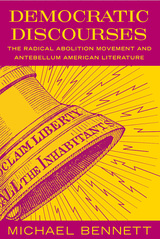 Democratic Discourses: The Radical Abolition Movement and Antebellum American Literature
Bennett, Michael
Rutgers University Press, 2005 "An arresting book that juxtaposes major and minor antebellum texts to develop its own democratic discourse. Michael Bennett writes with verve and brio, and offers some juicy surprises."—David Leverenz, University of Florida Ever since the hallowed statement, "All men are created equal," was penned in the Declaration of Independence, it has become a historical tenet that freedom and equality were brought to American shores by the so-called Founding Fathers. In this path-breaking study, Michael Bennett departs from tradition to argue that the democratic ideal of equality and the actual ways in which it has been practiced are grounded less in the fledgling government documents written by a handful of white men than in the actions and writings of the radical abolitionists of the nineteenth century. Bringing together key texts of both African American and European American authors, Democratic Discourses shows the important ways that abolitionist writing shaped a powerful counterculture within a slave-holding society. Bennett offers fresh new analysis through unusual pairings of authors, including Frederick Douglass with Henry David Thoreau, Frances Ellen Watkins Harper with Walt Whitman, and Margaret Fuller with Sojourner Truth. These rereadings avoid the tendency to view antebellum writing as a product primarily of either European American or African American influences and, instead, illustrate the interconnections of white and black literature in the creation and practice of democracy. Drawing on discourses about race, the body, gender, economics, and aesthetics, this unique study encourages readers to reconsider the reality and roots of freedoms experienced in the United States today.
Democratic Education: The Complete Prose Works of Matthew Arnold
Matthew Arnold; Edited by R. H. Super
University of Michigan Press, 1962 An inspector of schools as well as a professor of poetry, Matthew Arnold was an educator in the true sense of the word. Watching democracy breed self-satisfied Philistines, he relized that not all the liberty and industry in the world would insure the rule of right reason. If we are to survive, he said, we must seize on the best and make it prevail. The fate of civilization depends on our schools. Unfailingly relevant, his essays on education include Democracy, The Popular Education of France, and A French Eton, as well as three essays discovered by the editor in the pages of the London Review and republished here for the first time. They form a crucial chapter in the history of education, setting forth the standards upon which Arnold's literary criticism was to be based and from which his political utterances were to come.
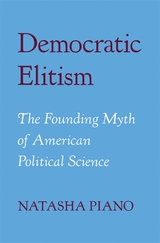 Democratic Elitism: The Founding Myth of American Political Science
Natasha Piano
Harvard University Press, 2025 A searing argument—and work of meticulous scholarship—about how American political scientists misinterpreted the elite theory of democracy and in so doing made our political system vulnerable to oligarchic takeover.
Do competitive elections secure democracy, or might they undermine it by breeding popular disillusionment with liberal norms and procedures? The so-called Italian School of Elitism, comprising Vilfredo Pareto, Gaetano Mosca, and Robert Michels, voiced this very concern. They feared that defining democracy exclusively through representative practices creates unrealistic expectations of what elections can achieve, generating mass demoralization and disillusionment with popular government.
The Italian School’s concern has gone unheeded, even as their elite theory has been foundational for political science in the United States. Democratic Elitism argues that scholars have misinterpreted the Italians as conservative, antidemocratic figures who championed the equation of democracy with representative practices to restrain popular participation in politics. Natasha Piano contends not only that the Italian School’s thought has been distorted but also that theorists have ignored its main objective: to contain demagogues and plutocrats who prey on the cynicism of the masses. We ought to view these thinkers not as elite theorists of democracy but as democratic theorists of elitism.
The Italian School’s original writings do not reject electoral politics; they emphasize the power and promise of democracy beyond the ballot. Elections undoubtedly are an essential component of functioning democracies, but in order to preserve their legitimacy we must understand their true capacities and limitations. It is past time to dispel the delusion that we need only elections to solve political crises, or else mass publics, dissatisfied with the status quo, will fall deeper into the arms of authoritarians who capture and pervert formal democratic institutions to serve their own ends.
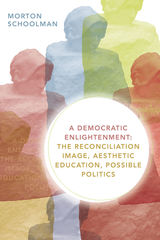 A Democratic Enlightenment: The Reconciliation Image, Aesthetic Education, Possible Politics
Morton Schoolman
Duke University Press, 2020 In A Democratic Enlightenment Morton Schoolman proposes aesthetic education through film as a way to redress the political violence inflicted on difference that society constructs as its racialized, gendered, Semitic, and sexualized other. Drawing on Voltaire, Diderot, and Schiller, Schoolman reconstructs the genealogical history of what he calls the reconciliation image—a visual model of a democratic ideal of reconciliation he then theorizes through Whitman's prose and poetry and Adorno's aesthetic theory. Analyzing The Help (2011) and Gentleman's Agreement (1947), Schoolman shows how film produces a more advanced image of reconciliation than those originally created by modernist artworks. Each film depicts violence toward racial and ethnic difference while also displaying a reconciliation image that aesthetically educates the public about how the violence of constructing difference as otherness can be overcome. Mounting a democratic enlightenment, the reconciliation image in film illuminates a possible politics for challenging the rise of nationalism's violence toward differences in all their diversity.
 Democratic Laboratories: Policy Diffusion among the American States
Andrew Karch
University of Michigan Press, 2010 "Observers have long marveled at the spread of ideas and policies from state to state in American democracy. But why and how do politicians, professionals, and citizens in one state take inspiration from national policy debates and imitate, resist, and rework legislative models from other states? For the first time in this important new book, Andrew Karch analyzes in depth the process of policy 'diffusion' across the states, offering a nuanced and powerful framework to explain one of the most important and recurrent features of U.S. politics."
---Theda Skocpol, Victor S. Thomas Professor of Government and Sociology, Harvard University "Karch does two things with remarkable skill. First, he makes sense of the copious literature on policy diffusion and extends that literature in a very fruitful way. Second, he conducts the most thorough and methodologically sound empirical study of policy diffusion to date, using both qualitative and quantitative analysis. This book is so well written and thoughtful that it will likely stimulate a whole new wave of study of state policy and its diffusion."
---Chris Mooney, editor of State Politics and Policy Quarterly "Democratic Laboratories goes beyond standard 'diffusion of innovation' approaches to analyze the complex interaction of interstate and intrastate political forces that shapes policy change. The book is a major contribution to the study of American federalism---and a very good read."
---Kent Weaver, Brookings Institution "Andrew Karch has something new and important to say about the states as laboratories of democracies. In his masterful account we learn about the actual process of diffusion of recent health and welfare policy reforms. " ---Virginia Gray, University of North Carolina, Chapel Hill "Democratic Laboratories is the seminal work on policy diffusion among the American states. Rigorously designed and well written, it is the new starting place for anyone interested in this important topic. The findings are copious and loaded with insights into the future of this valuable research." ---Harrell Rodgers, Professor and Chair, Department of Political Science, University of Houston Andrew Karch is Assistant Professor of Government at the University of Texas at Austin.
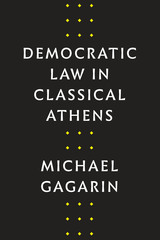 Democratic Law in Classical Athens
By Michael Gagarin
University of Texas Press, 2020 The democratic legal system created by the Athenians was completely controlled by ordinary citizens, with no judges, lawyers, or jurists involved. It placed great importance on the litigants’ rhetorical performances. Did this make it nothing more than a rhetorical contest judged by largely uneducated citizens that had nothing to do with law, a criticism that some, including Plato, have made? Michael Gagarin argues to the contrary, contending that the Athenians both controlled litigants’ performances and incorporated many other unusual features into their legal system, including rules for interrogating slaves and swearing an oath. The Athenians, Gagarin shows, adhered to the law as they understood it, which was a set of principles more flexible than our current understanding allows. The Athenians also insisted that their legal system serve the ends of justice and benefit the city and its people. In this way, the law ultimately satisfied most Athenians and probably produced just results as often as modern legal systems do. Comprehensive and wide-ranging, Democratic Law in Classical Athens offers a new perspective for viewing a legal system that was democratic in a way only the Athenians could achieve.
 The Democratic Marketplace: How a More Equal Economy Can Save Our Political Ideals
Lisa Herzog
Harvard University Press, 2025 An urgent critique of the market-fundamentalist ideals undermining democratic politics, pointing the way to principled reforms.
Democracy has been hollowed out by capitalism. A narrow view of markets and their aims—prioritizing efficiency, profit, and growth—now dominates thinking about democracy itself. Citizens are ignorant of the deep principles of self-governance, having long since adopted a facile equation between democracy and voting as a consumer choice. Lisa Herzog argues that democracy is still possible, but only if democratic values get embedded in everyday experience—including economic experience. That requires new ways of thinking about markets and their goals.
The Democratic Marketplace theorizes the foundational structures of a democratic economy, in which markets are not just tools for maximizing profit via exploitation and extraction. To this end, employees are empowered to participate in corporate governance. Economic disparities are curbed so that citizens can negotiate their inevitable differences on a truly equal footing. And while a democratic economy need not eschew growth, it does renounce today’s growth-at-all-costs expectations, instead balancing growth with goals like ecological sustainability and the preservation of time outside of work. Democratic economics also entails implementing reforms in ways that take seriously the perspectives, experiences, and skills of the whole population.
These are not utopian dreams, Herzog contends. The proposals that follow from the theory of democratic economics are already being tested around the world. And the shift in social norms that they necessitate is already under way.
 The Democratic Movement in Italy, 1830–1876
Clara M. Lovett
Harvard University Press, 1982 The Italian Risorgimento, the movement for national independence and unification, is as significant to Italian history as the American Revolution is to United States history. Liberal supporters of constitutional monarchy triumphed in the political struggles of the Risorgimento, yet democratic activists and thinkers like Mazzini, Garibaldi, Pisacane, and Ferrari were major participants in those struggles.
By reconstructing the lives and political careers of 146 such activists and thinkers, Clara M. Lovett explores the democratic movement's impact on the development of modern Italy. She shows that three main principles—secularism, political egalitarianism, and a concern for social justice—sustained the movement throughout its development and became its legacy after the unification. By exploring the social context of the movement and the specific experiences of its members, she explains why the democrats failed to lead Italy's unification in 1860 and why some of them became Italy's early professional politicians.
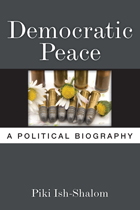 Democratic Peace: A Political Biography
Piki Ish-Shalom
University of Michigan Press, 2015 The Democratic Peace Thesis holds that democracies rarely make war on other democracies. Political scientists have advanced numerous theories attempting to identify precisely which elements of democracy promote this mutual peace, often hoping that Democratic Peace could be the final and ultimate antidote to war. However, as the theories were taken up by political figures, the immediate outcomes were war and the perpetuation of hostilities. Political theorist Piki Ish-Shalom sketches the origins and early academic development of the Democratic Peace Thesis. He then focuses on the ways in which various Democratic Peace Theories were used by Bill Clinton and George W. Bush both to shape and to justify U.S. foreign policy, particularly the U.S. stance on the Israeli-Palestinian situation and the War in Iraq. In the conclusion, Ish-Shalom boldly confronts the question of how much responsibility theoreticians must bear for the political uses—and misuses—of their ideas.
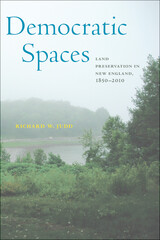 Democratic Spaces: Land Preservation in New England, 1850–2010
Richard W. Judd
University of Massachusetts Press, 2023 Winner of the 2024 Forest History Society Charles A. Weyerhaeuser Book Award
A contemporary map of New England, scaled to the township level, brings to light a dense pattern of protected areas ringing almost every town and city in the region. Big and small, rural and urban, these green spaces represent more than a century of preservation efforts on the part of philanthropic foundations, planning professionals, state agencies, and most importantly, community-based conservation organizations. Taken together, they highlight one of the most significant advances in land stewardship in US history. Democratic Spaces explains how these protected places came into being and what they represent for New Englanders and the nation at large. While early New Englanders worked to save local fish, timber, and game resources from outside exploitation, no land-stewardship organizations existed before the founding of the Trustees of Public Reservations in Boston in 1891. Across a century of dramatic change, New England preservationists through this and other, smaller community-based land trusts preserved open spaces for an ever-widening circle of citizens.
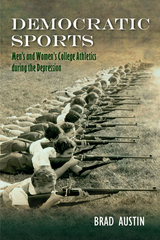 Democratic Sports: Men's and Women's College Athletics during the Great Depression
Brad Austin
University of Arkansas Press, 2015 American public universities suffered tremendous funding cuts during the 1930s, yet they were also responsible for educating increasing numbers of students. The mounting financial troubles, coupled with a perceived increase in the number of “radical” student activists, contributed to a general sense of crisis on American college campuses.
University leaders used their athletic programs to combat this crisis and to preserve “traditional” American values and institutions, prescribing different models for men and women. Educators emphasized the competitive nature of men’s athletics, seeking to inculcate male college athletes (and their audiences) with individualistic, masculine values in order to reinforce the existing American political and economic systems.
In stark contrast, the prevailing model of women’s college athletics taught a communal form of democracy. Strongly supported by almost all female athletic leaders, this “a girl for every game, and a game for every girl” model had replaced the more competitive model that had been popular until the 1920s. The new programs denied women individual attention and high-level competition, and they promoted the development of what was considered proper femininity.
Whatever larger purposes these programs were intended to serve, they could not have survived without vocal supporters. Democratic Sports tells the important story of how men’s and women’s college athletic programs survived, and even thrived, during the most challenging decade of the twentieth century.
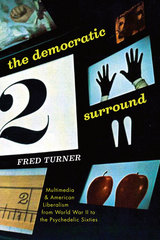 The Democratic Surround: Multimedia and American Liberalism from World War II to the Psychedelic Sixties
Fred Turner
University of Chicago Press, 2013 We commonly think of the psychedelic sixties as an explosion of creative energy and freedom that arose in direct revolt against the social restraint and authoritarian hierarchy of the early Cold War years. Yet, as Fred Turner reveals in The Democratic Surround, the decades that brought us the Korean War and communist witch hunts also witnessed an extraordinary turn toward explicitly democratic, open, and inclusive ideas of communication and with them new, flexible models of social order. Surprisingly, he shows that it was this turn that brought us the revolutionary multimedia and wild-eyed individualism of the 1960s counterculture.
In this prequel to his celebrated book From Counterculture to Cyberculture, Turner rewrites the history of postwar America, showing how in the 1940s and ’50s American liberalism offered a far more radical social vision than we now remember. Turner tracks the influential mid-century entwining of Bauhaus aesthetics with American social science and psychology. From the Museum of Modern Art in New York to the New Bauhaus in Chicago and Black Mountain College in North Carolina, Turner shows how some of the most well-known artists and intellectuals of the forties developed new models of media, new theories of interpersonal and international collaboration, and new visions of an open, tolerant, and democratic self in direct contrast to the repression and conformity associated with the fascist and communist movements. He then shows how their work shaped some of the most significant media events of the Cold War, including Edward Steichen’s Family of Man exhibition, the multimedia performances of John Cage, and, ultimately, the psychedelic Be-Ins of the sixties. Turner demonstrates that by the end of the 1950s this vision of the democratic self and the media built to promote it would actually become part of the mainstream, even shaping American propaganda efforts in Europe.
Overturning common misconceptions of these transformational years, The Democratic Surround shows just how much the artistic and social radicalism of the sixties owed to the liberal ideals of Cold War America, a democratic vision that still underlies our hopes for digital media today.
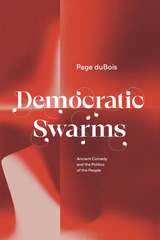 Democratic Swarms: Ancient Comedy and the Politics of the People
Page duBois
University of Chicago Press, 2022 Considers how ancient Greek comedy offers a model for present-day politics.
With Democratic Swarms, Page duBois revisits the role of Greek comedy in ancient politics, considering how it has been overlooked as a political medium by modern theorists and critics. Moving beyond the popular readings of ancient Greece through the lens of tragedy, she calls for a revitalized look at Greek comedy. Rather than revisiting the sufferings of Oedipus and his family or tragedy’s relationship to questions of sovereignty, this book calls for comedy—its laughter, its free speech, its wild swarming animal choruses, and its rebellious women—to inform another model of democracy.
Ancient comedy has been underplayed in the study of Greek drama. Yet, with the irrepressible energy of the comic swarm, it provides a unique perspective on everyday life, gender and sexuality, and the utopian politics of the classical period of Athenian democracy. Using the concepts of swarm intelligence and nomadic theory, duBois augments tragic thought with the resistant, utopian, libidinous, and often joyous communal legacy of comedy, and she connects the lively anti-authoritarianism of the ancient comic chorus with the social justice movements of today.
Democratic Theorizing from the Margins
Marla Brettschneider
Temple University Press, 2007 Democratic Theorizing from the Margins lays out the basic parameters of diversity-based politics as a still emerging form of democratic theory. Students, activists, and scholars engage in diversity politics on the ground, but generally remain unable to conceptualize a broad understanding of how "politics from the margins"—that is, political thinking and action that comes from groups often left on the outside of mainstream organizing and action—operates effectively in different contexts and environments. Brettschneider offers concrete lessons from many movements to see what they tell us about a new sort of democratic politics. She also addresses traditional democratic theories and draws on the myriad discerning practices employed by marginalized groups in their political activism to enhance the critical capacities of potential movements committed both to social change and democratic action.
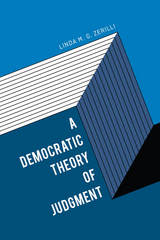 A Democratic Theory of Judgment
Linda M. G. Zerilli
University of Chicago Press, 2016 In this sweeping look at political and philosophical history, Linda M. G. Zerilli unpacks the tightly woven core of Hannah Arendt’s unfinished work on a tenacious modern problem: how to judge critically in the wake of the collapse of inherited criteria of judgment. Engaging a remarkable breadth of thinkers, including Ludwig Wittgenstein, Leo Strauss, Immanuel Kant, Frederick Douglass, John Rawls, Jürgen Habermas, Martha Nussbaum, and many others, Zerilli clears a hopeful path between an untenable universalism and a cultural relativism that forever defers the possibility of judging at all.
Zerilli deftly outlines the limitations of existing debates, both those that concern themselves with the impossibility of judging across cultures and those that try to find transcendental, rational values to anchor judgment. Looking at Kant through the lens of Arendt, Zerilli develops the notion of a public conception of truth, and from there she explores relativism, historicism, and universalism as they shape feminist approaches to judgment. Following Arendt even further, Zerilli arrives at a hopeful new pathway—seeing the collapse of philosophical criteria for judgment not as a problem but a way to practice judgment anew as a world-building activity of democratic citizens. The result is an astonishing theoretical argument that travels through—and goes beyond—some of the most important political thought of the modern period.
 A Democratic Theory of Truth
Linda M. G. Zerilli
University of Chicago Press, 2025 A critique of the concept of truth presupposed by the post-truth debate—and a bold new vision for a more pluralistic citizenry.
We say that we live in a “post-truth” era because disinformation threatens our confidence in the existence of a shared public world. Affirming objective truth may, therefore, seem necessary to save democracy. According to political theorist Linda M. G. Zerilli, such affirmation can stifle political debate and silence dissent. In fact, Zerilli argues that the unqualified insistence on objective truth is as dangerous for democracy as denying it.
Drawing on Arendt, Foucault, and Wittgenstein, A Democratic Theory of Truth challenges the concept of truth presupposed by the post-truth debate. It argues that we, the people, have an essential role in discovering and evaluating any truth relevant to the political realm. The result is a striking defense of plurality, dissent, and opinion in contemporary democratic societies.
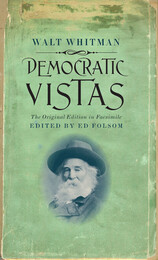 Democratic Vistas: The Original Edition in Facsimile
Whitman, Walt
University of Iowa Press, 2010 Written in the aftermath of the American Civil War during the ferment of national Reconstruction, Walt Whitman’s Democratic Vistas remains one of the most penetrating analyses of democracy ever written. Diagnosing democracy’s failures as well as laying out its vast possibilities, Whitman offers an unflinching assessment of the ongoing social experiment known as the United States. Now available for the first time in a facsimile of the original 1870–1871 edition, with an introduction and annotations by noted Whitman scholar Ed Folsom that illuminate the essay’s historical and cultural context, this searing analysis of American culture offers readers today the opportunity to argue with Whitman over the nature of democracy and the future of the nation. Living in Washington, D.C., where Congress granted male African Americans the right to vote nearly five years before the fifteenth amendment extended that right across the nation, and working for the office charged with enforcing the new civil rights amendments to the Constitution, Whitman was at the volatile center of his nation’s massive attempt to reconstruct and redefine itself after the tumultuous years of civil war. In the enduring cultural document that Democratic Vistas has become, the great poet of democracy analyzes the role that literature plays in the development of a culture, the inevitable tensions between the “democratic individual” and the “democratic nationality,” and the corrosive effects of materialism on the democratic spirit. His own conflicting racial biases notwithstanding, Whitman in Democratic Vistas offers his most eloquent and extended articulation of the beckoning American democratic future. At a time when the nation has elected a president whom Whitman could never have imagined, his controversial and provocative book is a timely reminder of those occasions when we experience the expansion of America’s democratic dream.
 Democratising History: Modern British History Inside and Out
Edited by Laura Carter, Freddy Foks, and Philip Harling
University of London Press, 2025 An exploration of the intersections of politics and public engagement, Democratising History reveals how history itself has been shaped by democratic forces.
Democratising History inspects how democracy has reshaped modern Britain and how its history is taught, providing a new perspective on the evolving relationship between historical scholarship and education. Collectively, this volume responds to the scholarly and professional contributions of Peter Mandler, whose sensitive readings of cultural discourses and their social reach have inspired a generation of modern British historians. Through nine research-led chapters, the book explores the development of democratic ideals from the early nineteenth century to the present, addressing themes such as empire and culture. These historical investigations are interwoven with six stimulating interludes that critically assess the state of UK higher education and the professional field of modern British history, elucidating the shifting forces shaping historical research and policy today.
The authors examine in detail how democratic ideals have shaped British society in both expected and surprising ways—whether through museum collections, the art world, mass observation, or the study of race relations. Integrating historical analysis with reflections on contemporary academic practice, this work subverts traditional narratives and opens new avenues for understanding Britain’s past and its implications for the present.
Democratization and Islamic Law: The Sharia Conflict in Nigeria
Johannes Harnischfeger
Campus Verlag, 2007 When democracy was introduced to Nigeria in 1999, one third of its federal states declared that they would be governed by sharia, or Islamic law. In Democratization and Islamic Law, Johannes Harnischfeger argues that such a break with secular constitutional traditions in a multi-religious country can have disastrous consequences. The efforts by Islamic politicians to assert their own religious laws, Harnischfeger contends, have driven Muslims and Christians to confrontation. This book is an essential contribution to debates surrounding the increasingly fraught relationship between religion and politics.
Democratization and the Politics of Constitution-Making in Turkey
Ömer Faruk Gençkaya
Central European University Press, 2009 Explores and illustrates how domestic and international factors shape the direction of democratization process with special reference to constitution making process in Turkey. Describes how all five Turkish constitutions were, by and large, the products of indigenous effort, although borrowing could be felt in certain limited areas. Argues that the constitutional reforms in the post-1983 period were the outco me of broad inter-party negotiations and agree ments as a response to the society's demands for a more democratic and liberal political system. Finally, the constitutional revisions adopted since 1995 were strongly conditioned by Turkey's hope of accession to the European Union. With these reforms, Turkey was successful in meeting the political criteria and started accession negotiations with the EU.
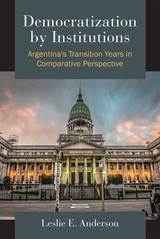 Democratization by Institutions: Argentina's Transition Years in Comparative Perspective
Leslie E. Anderson
University of Michigan Press, 2016 In this pioneering study of democratization in Argentina, Leslie Anderson challenges Robert Putnam’s thesis that democracy requires high levels of social capital. She demonstrates in Democratization by Institutions that formal institutions (e.g., the executive, the legislature, the courts) can serve not only as operational parts within democracy but as the driving force toward democracy.
As Anderson astutely observes, the American founders debated the merits of the institutions they were creating. Examining how, and how well, Argentina’s American-style institutional structure functions, she considers the advantages and risks of the separation of powers, checks and balances, legislative policymaking, and strong presidential power. During the democratic transition, the Argentinian state has used institutions to address immediate policy challenges in ways responsive to citizens and thereby to provide a supportive environment in which social capital can develop.
By highlighting the role that institutions can play in leading a nation out of authoritarianism, even when social capital is low, Anderson begins a new conversation about the possibilities of democratization. Democratization by Institutions has much to say not only to Latin Americanists and scholars of democratization but also to those interested in the U.S. constitutional structure and its application in other parts of the world.
 Democratization in the Nordic World
David Delfs Erbo Andersen
University of Wisconsin Press, 2024 Denmark, Norway, and Sweden enjoy some of the happiest populations and highest standards of living in the world, thanks in part to stable, democratic systems of government. Here, David Delfs Erbo Andersen presents a syncretic history of political and socioeconomic developments in the three Scandinavian countries since the early modern period, and contrasts their peaceful transitions with the more dramatic histories of otherwise similar European countries, like France and Germany. Unlike these and many other countries—the United States among them—Scandinavia’s transition to democracy from monarchy was not marked by major violent upheavals or extreme political antagonism.
Rather, Scandinavia’s peaceful process of democratization owed itself to the development of a penetrative bureaucracy in the early modern period and the activism of cooperative associations, first of farmers in the early nineteenth century and then of industrialized workers in the late nineteenth and early twentieth centuries. Thanks to the gradual, relatively consensual adoption of political reforms and social norms, the history of “Nordic democratic exceptionalism” today helps account for the ongoing stability of the Scandinavian countries.
The Democratization of Knowledge in Renaissance Italy: The Philosopher and the People
Marco Sgarbi
Amsterdam University Press, 2023 The book identifies to what extent it is possible to speak of a democratization of knowledge in Renaissance Italy. It establishes the boundaries of the present investigation within the Aristotelian tradition, and outlines democratization as a process capable of assigning power to people. It deals with how the democratization of knowledge historically is invested equally in ideas from religion and philosophy, involving the same democratizers, moved by similar intentions, employing identical techniques of vulgarization and targeting equivalent communities of recipients.
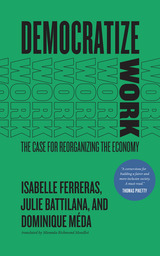 Democratize Work: The Case for Reorganizing the Economy
Isabelle Ferreras, Julie Battilana, and Dominique Méda
University of Chicago Press, 2022 An urgent and deeply resonant case for the power of workplace democracy to restore balance between economy and society.
What happens to a society—and a planet—when capitalism outgrows democracy? The tensions between democracy and capitalism are longstanding, and they have been laid bare by the social effects of COVID-19. The narrative of “essential workers” has provided thin cover for the fact that society’s lowest paid and least empowered continue to work risky jobs that keep our capitalism humming. Democracy has been subjugated by the demands of capitalism. For many, work has become unfair.
In Democratize Work, essays from a dozen social scientists—all women—articulate the perils and frustrations of our collective moment, while also framing the current crisis as an opportunity for renewal and transformation. Amid mounting inequalities tied to race, gender, and class—and with huge implications for the ecological fate of the planet—the authors detail how adjustments in how we organize work can lead to sweeping reconciliation. By treating workers as citizens, treating work as something other than an asset, and treating the planet as something to be cared for, a better way is attainable. Building on cross-disciplinary research, Democratize Work is both a rallying cry and an architecture for a sustainable economy that fits the democratic project of our societies.
Contributors include Alyssa Battistoni (Barnard College of Columbia University), Adelle Blackett (McGill University), Julia Cagé (Sciences Po), Neera Chandhoke (University of Delhi), Lisa Herzog (University of Groningen), Imge Kaya Sabanci (IE Business School), Sara Lafuente (European Trade Union Institute), Hélène Landemore (Yale University), Flávia Máximo (Universidade Federal de Ouro Preto, Brazil), and Pavlina R. Tcherneva (Levy Economics Institute of Bard College).
 Democratizing Communist Militaries: The Cases of the Czech and Russian Armed Forces
Marybeth Peterson Ulrich
University of Michigan Press, 2000 Military support for democratically elected governments in the states emerging from communism in eastern Europe and elsewhere is critically important to the survival of the new democracies. We have seen the military overthrow civilian governments in many states in Latin America and Africa. What can be done to promote support for democratic government in transitional states?
In a groundbreaking study, Marybeth Peterson Ulrich explores the attitudes of the leaders of the armed forces in Russia and the Czech Republic toward the new democratic governments and suggests ways in which we might encourage the development of politically neutral militaries in these states. Building on the work of Samuel Huntington and others on the relationship between the military and the state, the author suggests that norms of military professionalism must change if the armies in countries making a transition from communist rule are to become strong supporters of the democratic state. The Czech Republic and Russia are interesting cases, because they have had very different experiences in the transition; they have different geopolitical goals; and they experienced different military-civilian relationships during the Soviet period. The author also explores American and NATO programs to promote democratization in these militaries and suggests changes in the programs.
Marybeth Peterson Ulrich is Associate Professor of Government, U.S. Army War College.
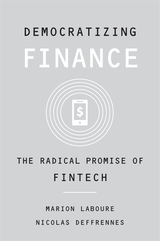 Democratizing Finance: The Radical Promise of Fintech
Marion Laboure and Nicolas Deffrennes
Harvard University Press, 2022 We are only in the early stages of a broader revolution that will impact every aspect of the global economy, including commerce and government services. Coming financial technology innovations could improve the quality of life for all people.
Over the past few decades, digital technology has transformed finance. Financial technology (fintech) has enabled more people with fewer resources, in more places around the world, to take advantage of banking, insurance, credit, investment, and other financial services. Marion Laboure and Nicolas Deffrennes argue that these changes are only the tip of the iceberg. A much broader revolution is under way that, if steered correctly, will lead to huge and beneficial social change.
The authors describe the genesis of recent financial innovations and how they have helped consumers in rich and poor countries alike by reducing costs, increasing accessibility, and improving convenience and efficiency. They connect the dots between early innovations in financial services and the wider revolution unfolding today. Changes may disrupt traditional financial services, especially banking, but they may also help us address major social challenges: opening new career paths for millennials, transforming government services, and expanding the gig economy in developed markets. Fintech could lead to economic infrastructure developments in rural areas and could facilitate emerging social security and healthcare systems in developing countries. The authors make this case with a rich combination of economic theory and case studies, including microanalyses of the effects of fintech innovations on individuals, as well as macroeconomic perspectives on fintech’s impact on societies.
While celebrating fintech’s achievements to date, Laboure and Deffrennes also make recommendations for overcoming the obstacles that remain. The stakes—improved quality of life for all people—could not be higher.
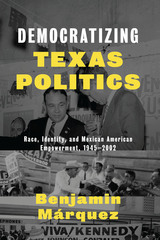 Democratizing Texas Politics: Race, Identity, and Mexican American Empowerment, 1945-2002
By Benjamin Márquez
University of Texas Press, 2014 Winner, Outstanding Book Award, NACCS Tejas Foco Award for Non-Fiction, National Association for Chicana and Chicano Studies Tejas, 2015 By the beginning of the twenty-first century, Texas led the nation in the number of Latino officeholders, despite the state’s violent history of racial conflict. Exploring this and other seemingly contradictory realities of Texas’s political landscape since World War II, Democratizing Texas Politics captures powerful, interrelated forces that drive intriguing legislative dynamics. These factors include the long history of Mexican American activism; population growth among Mexican American citizens of voting age; increased participation among women and minorities at state and national levels in the Democratic Party, beginning in the 1960s; the emergence of the Republican Party as a viable alternative for Southern conservatives; civil rights legislation; and the transition to a more representative two-party system thanks to liberal coalitions. Culling extensive archival research, including party records and those of both Latino activists and Anglo elected officials, as well as numerous interviews with leading figures and collected letters of some of Texas’s most prominent voices, Benjamin Márquez traces the slow and difficult departure from a racially uniform political class to a diverse one. As Texas transitioned to a more representative two-party system, the threat of racial tension and political exclusion spurred Mexican Americans to launch remarkably successful movements to ensure their incorporation. The resulting success and dilemmas of racially based electoral mobilization, embodied in pivotal leaders such as Henry B. Gonzalez and Tony Sanchez, is vividly explored in Democratizing Texas Politics.
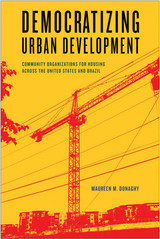 Democratizing Urban Development: Community Organizations for Housing across the United States and Brazil
Maureen M. Donaghy
Temple University Press, 2018 Rising housing costs put secure and decent housing in central urban neighborhoods in peril. How do civil society organizations (CSOs) effectively demand accountability from the state to address the needs of low-income residents? In her groundbreaking book, Democratizing Urban Development, Maureen Donaghy charts the constraints and potential opportunities facing these community organizations. She assesses the various strategies CSOs engage to influence officials and ensure access to affordable housing through policies, programs, and institutions. Democratizing Urban Development presents efforts by CSOs in four cities across the hemispheric divide: Rio de Janeiro, São Paulo, Washington, DC, and Atlanta. Donaghy studies the impact and outcomes that ensue from these efforts, noting that CSOs must sometimes shift their own ideology or adapt to the political environment in which they operate to ensure access to housing and support the goals of an inclusive city.
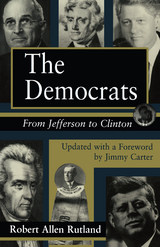 The Democrats: From Jefferson to Clinton
Robert Allen Rutland, Foreword by Jimmy Carter
University of Missouri Press, 1995 Interlacing humor into his ongoing narrative, Robert Allen Rutland provides in The Democrats a readable, balanced account of how the Democratic party was founded, evolved, nearly died, and came back in the twentieth century, flourishing as a political melting pot despite numerous setbacks. This updated version of Rutland's much-heralded The Democrats: From Jefferson to Carter provides new insight into the long hiatus in the Democrats' presence in the White House between Carter and Clinton. In additon to analyzing Carter's successes and failures as president, Rutland also examines the forces that went into the Democratic defeats and Republican victories in 1980, 1984, and 1988, concluding with the election of another Jeffersonian Democrat, William Jefferson Clinton. The book ends with an examination of the dramatic results of the 1994 congressional elections that began to alert President Clinton to the challenge he would face in winning reelection in 1996.
Demographic Angst: Cultural Narratives and American Films of the 1950s
Nadel, Alan
Rutgers University Press, 2017 Prolific literature, both popular and scholarly, depicts America in the period of the High Cold War as being obsessed with normality, implicitly figuring the postwar period as a return to the way of life that had been put on hold, first by the Great Depression and then by Pearl Harbor.
Demographic Angst argues that mandated normativity—as a political agenda and a social ethic—precluded explicit expression of the anxiety produced by America’s radically reconfigured postwar population. Alan Nadel explores influential non-fiction books, magazine articles, and public documents in conjunction with films such as Singin’ in the Rain, On the Waterfront, Sunset Boulevard, and Sayonara, to examine how these films worked through fresh anxieties that emerged during the 1950s.
Demographic Avant-Garde: Jews in Bohemia between the Enlightenment and the Shoah
Jana Vobecká
Central European University Press, 2013 This book studies the unique demographic behavior of Jews in Bohemia (the historic part of the Czech Republic), starting from a moment in history when industrialization in Central Europe was still far away in the future, and when Jews were still living legally restricted lives in ghettos. Very early on, however, from the 18th century onwards, Jews developed patterns of decreasing mortality and fertility that was not observed among the gentile majority in Bohemia; patterns which established them as a demographic avant-garde population in all of Europe.
Demographic Change and the American Future
R. Scott Fosler
University of Pittsburgh Press, 1990 The essays in this volume analyze the growing stresses of demographic trends in the United States and their implications for policymakers. They describe projections for U.S. birth rates, changing family patterns, age-dependency ratio, immigration, geographical distribution, income distribution, and international standing. This book was published under the auspices of the Committee for Economic Development in Washington, DC.
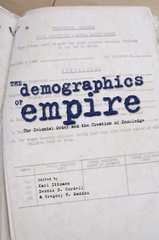 The Demographics of Empire: The Colonial Order and the Creation of Knowledge
Karl Ittmann
Ohio University Press, 2010 The Demographics of Empire is a collection of essays examining the multifaceted nature of the colonial science of demography in the last two centuries. The contributing scholars of Africa and the British and French empires focus on three questions: How have historians, demographers, and other social scientists understood colonial populations? What were the demographic realities of African societies and how did they affect colonial systems of power? Finally, how did demographic theories developed in Europe shape policies and administrative structures in the colonies? The essays approach the subject as either broad analyses of major demographic questions in Africa’s history or focused case studies that demonstrate how particular historical circumstances in individual African societies contributed to differing levels of fertility, mortality, and migration. Together, the contributors to The Demographics of Empire question demographic orthodoxy, and in particular the assumption that African societies in the past exhibited a single demographic regime characterized by high fertility and high mortality.
Demography and Nation: Social Legislation and Population Policy in Bulgaria
Svetla Baloutzova
Central European University Press, 2011 The monograph investigates the origins of state policy toward population and the family in Bulgaria. Reconstructs the evolution of state legislation in the field of social policy toward the family between the two World Wars, colored by concerns about the national good and demographic considerations. It sets the laws regarding family welfare in their framework of a distinctively cultural, historical and political discourse to follow the motives behind the legislative initiatives.
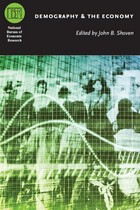 Demography and the Economy
Edited by John B. Shoven
University of Chicago Press, 2010 Demographics is a vital field of study for understanding social and economic change and it has attracted attention in recent years as concerns have grown over the aging populations of developed nations. Demographic studies help make sense of key aspects of the economy, offering insight into trends in fertility, mortality, immigration, and labor force participation, as well as age, gender, and race specific trends in health and disability.
Demography and the Economy explores the connections between demography and economics, paying special attention to what demographic trends can reveal about the sustainability of traditional social security programs and the larger implications for economic growth. The volume brings together some of the leading scholars working at the border between the two disciplines, and it provides an eclectic overview of both fields. Contributors also offer deeper analysis of a variety of issues such as the impact of greater wealth on choices about marriage and childbearing and the effects of aging populations on housing prices, Social Security, and Medicare.
The Demography of the Semai Senoi
Alan G. Fix
University of Michigan Press, 1977 During 1968 and 1969, Alan G. Fix conducted an anthropological and genetic study among the Semai Senoi of Malaysia. His goal was to measure the amount of genetic exchange between local populations and document the effects of that exchange. This work combines results from that study with data from a 1965 census of aborigines and an expanded analysis.
|
|


